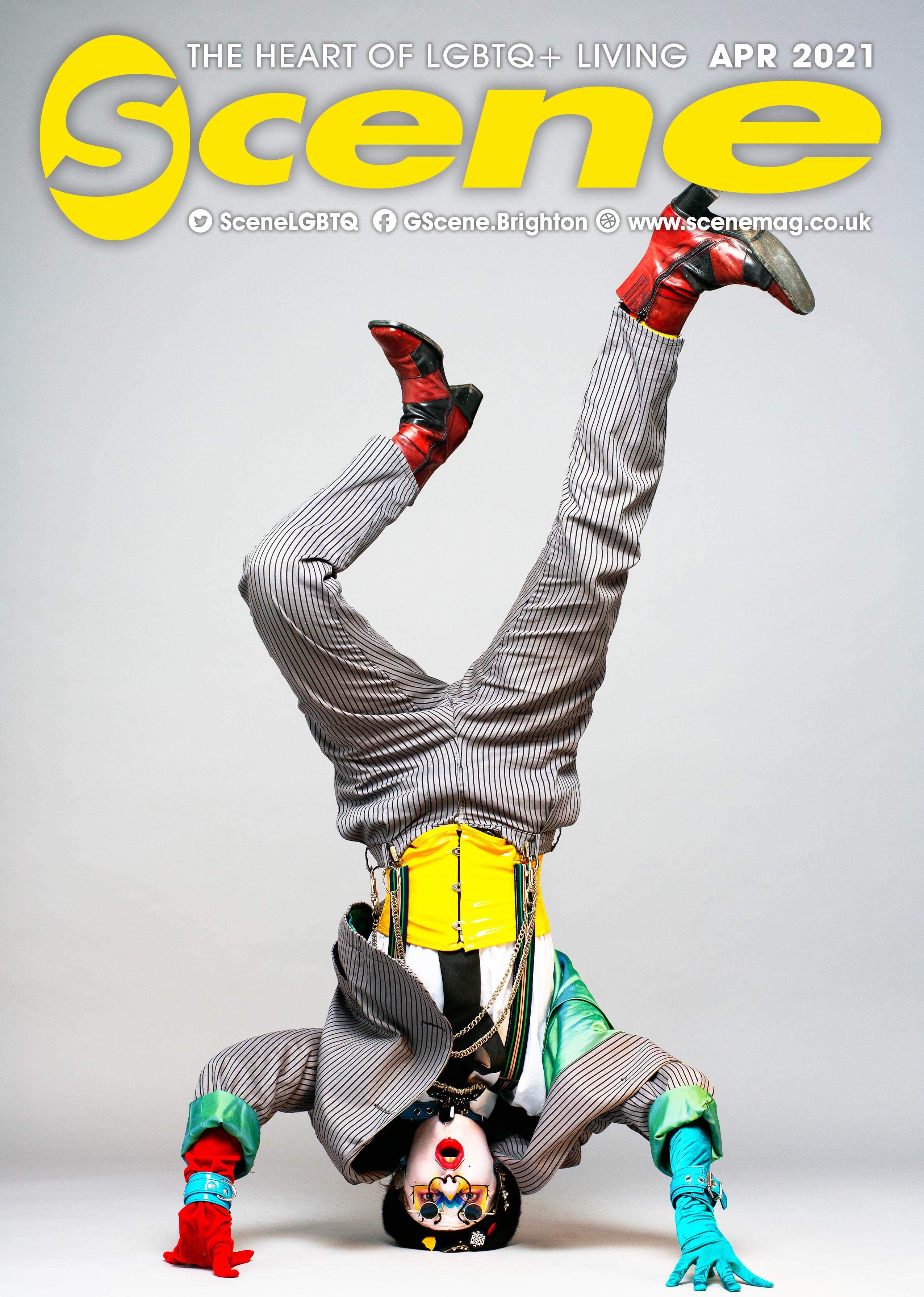
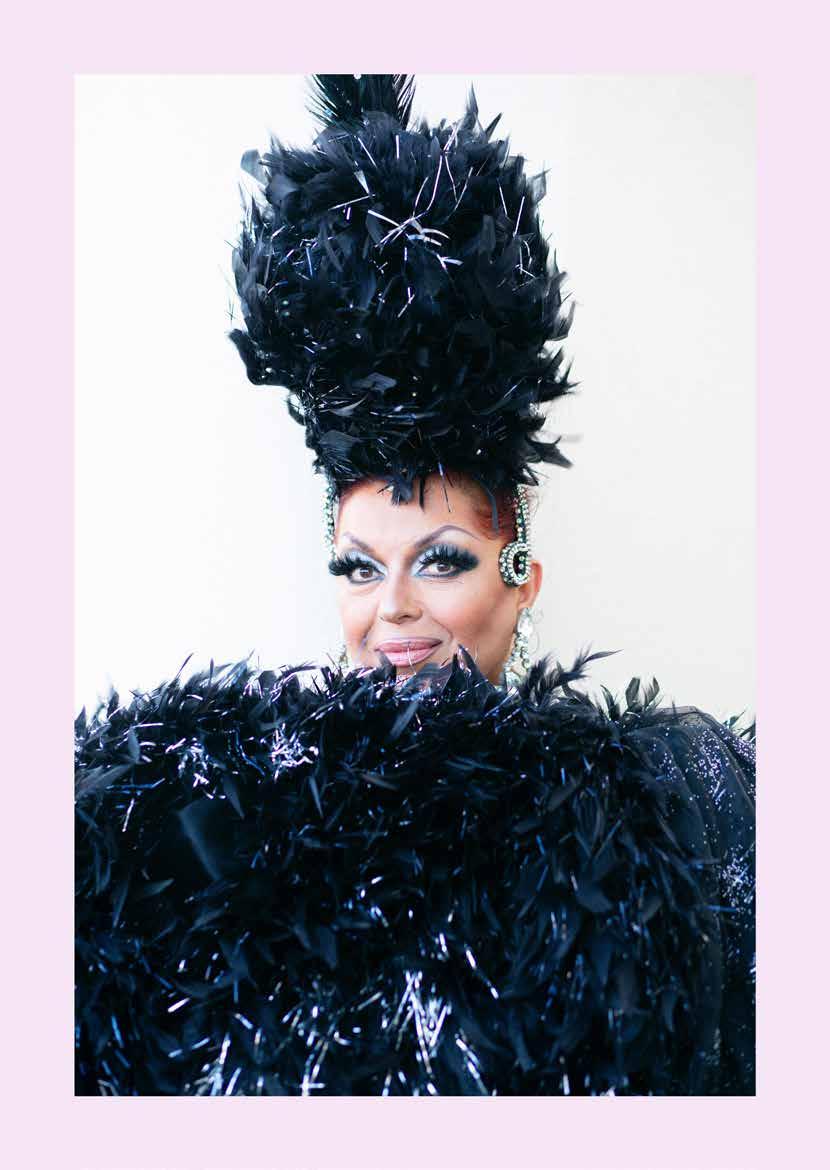
“People are all thinking ‘what are we going to do?’. We are all in a storm in different vessels – some hanging on to a plank of wood and some in a yacht.” Dolly Rocket



“People are all thinking ‘what are we going to do?’. We are all in a storm in different vessels – some hanging on to a plank of wood and some in a yacht.” Dolly Rocket
Scene
D www.scenemag.co.uk
T @SceneLGBTQ
F GScene.Brighton
Publisher: Scene Magazine Media CIC
Editorial: info@scenemag.co.uk
Advertising: info@scenemag.co.uk
Editorial team
Features Editor: Jaq Bayles
News Editor/Design: Graham Robson
Arts Editor: Alex Klineberg
Art Director: Tom Selmon
News team: Graham Robson, Eric
Page, Rachel Badham, Catherine Muxworthy, Paul Smith
E news@scenemag.co.uk
West Midlands News Editor: Catherine Muxworthy
E midlandsnews@scenemag.co.uk
London News Editor: Steven Banks
E londonnews@scenemag.co.uk
Cover: Photographer: Tom Selmon
E contact@tomselmon.com d www.tomselmon.com
Model: FINN i daaddy.longlegs
Contributors
Sam Adams, Rachel Badham, Catherine Muxworthy, Nick Boston, Brian Butler, David Fray, Billie Gold, Craig Hanlon-Smith, Michael Hootman, Laurie Lavender, Enzo Marra, Eric Page, Glenn Stevens, Netty Wendt, Roger Wheeler, Chris Gull, Jon Taylor, Alex Klineberg, Michael Steinhage, Jon Taylor, Jason Reid, Rory Finn

Photographers
Jack Lynn, Chris Jepson, Simon Pepper, Nick Ford, Tom Selmon, Livia Smith, Mas-ood Peterson
© Scene 2021
All work appearing in Scene CIC is copyright. It is to be assumed that the copyright for material rests with the magazine unless otherwise stated on the page concerned.
No part of this publication may be reproduced, stored in an electronic or other retrieval system, transmitted in any form or by any means, electronic, mechanical, photocopying, recording or otherwise without the prior knowledge and consent of the publishers.
The appearance of any person or any organisation in Scene is not to be construed as an implication of the sexual orientation or political persuasion of such persons or organisations.
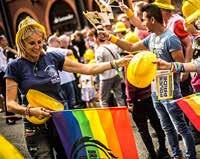

Craig Hanlon-Smith explains how misogyny is at the root of many of our social, cultural and political challenges
14 CARRY ON CRUISING
Jason Reid on the joys of beating around the bush
15 TOXIC MASCULINITY
How toxic masculinity preconditioned Jack Groves’ idea of normative sexuality
17 QUEER CAREERS
Jaq Bayles sits down with James Ravenhill, a senior lecturer in the School of Applied Social Science at University of Brighton
18 KEEP SMILING
Christina Chatfield, director of Dental Health Spa in Brighton, encourages people to think of a career in an underappreciated profession
20 CABARET & CARING
Dolly Rocket on forging a new career in the pandemic
22 FAYE WHEELER
One trans woman’s search for fulfilment in the career of her dreams
24 PR FOR THE PEOPLE
Lucy Sambrook and Toya Satnarine on revolutionising the media landscape
25 BILLIE GOLD
Cabaret’s ‘space lesbian’ Billie Gold ruminates on the unusual avenues she has explored to make ends meet
26 BURNING AMBITIONS
East Sussex Fire & Rescue Service gears up for a recruitment campaign in which it is actively encouraging applicants from diverse backgrounds
28 TATTOOED, PIERCED & QUEER
Rachel Badham looks into whether LGBTQ+ people are more likely to get body modifications
29 QUEER CONTENT CREATORS
Brighton blogger Artie Carden talks to Rachel Badham about being an LGBTQ+ disabled person in the creative industry
32 I AM WHAT I AM...
Peter Markham on meeting the inspirational Arthur Britney Joestar
33 TRANS PRIDE BRIGHTON & HOVE
Sarah Savage reflects on last year’s online event and looks towards the future
34 BRIGHTON & HOVE PRIDE
Organisers of the annual event answer our questions
36 SECRET SAPPHIC CONNECTIONS
Rachel Badham looks at how queer people developed covert ways of talking to each other
37 LONDON’S OPENING
Steven Banks catches up with a few organisations to hear what’s going on
38 A KINDA MAGIC
Tom Selmon captures performance artist and magician, BAX
44 A QUEER DIGITAL MUSEUM
Queer Heritage South launches an archive of LGBTQ+ history for Brighton and beyond
45 SCALING THE PANDEMIC
Brighton Gay Men's Chorus shares what is planned post-Covid
47 NO MODERNISM WITHOUT LESBIANS
Diana Souhami introduces her new book
50 CURTAINS UP
Alex Klineberg shares some shows to enjoy post-lockdown
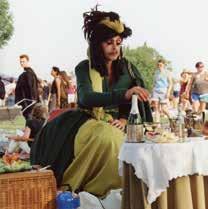
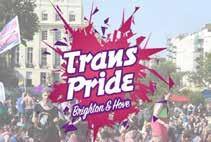


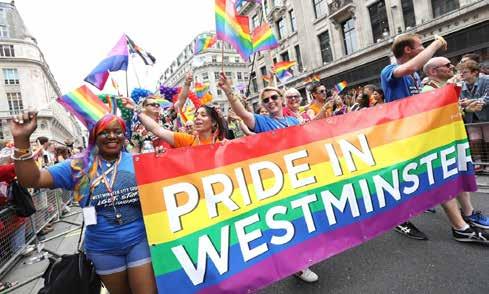
) Pride in London organisers have been accused of creating a hostile environment rife with racism and bullying, following the resignation of several team members, which has led co-chairs Alison Camps and Michael Salter-Church to also quit their positions.
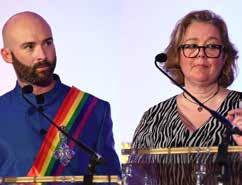
The controversy began after Rhammel Afflick, who was the most senior black member of the Pride organisational team, explained that he quit his role as director of communications last month due to racism.
Afflick released a statement in which he said that, while Pride was “important to him”, he has “lost all confidence in the leadership’s ability to successfully address the adversities faced by our multi-faceted communities.” He also stated that Pride leaders are reluctant to “accept that the liberation of

LGBTQ+ people must be coupled with the fight against sexism, ableism, racism and other forms of unacceptable discrimination,” and said during his time as director of communications, he had “personally witnessed the leadership’s insistence on ignoring black voices in our communities.”
Following Afflick’s departure, the entire Pride advisory board resigned, and released a joint statement which read: “We no longer have confidence that the current board of directors are the right people to continue leading the Pride movement in London and call for a new leadership to take the organisation forward.” The board also pointed out that recent allegations against the leadership “directly implicate members of the Pride in London board as contributing to this hostile environment and failure to respond to complaints on racism and bullying.”

After being called on by a handful of Pride workers and LGBTQ+ advocacy groups, including Stonewall, to resign, Camps and Salter-Church quit their positions and insisted that “Pride in London is committed to rebuilding the trust of minority communities which it knows is broken, but we hope not irreparably”. In a statement released by Pride officials, leaders said there is an “urgent need for Pride in London to create a more inclusive environment, which centres black volunteers, people of colour and other marginalised community groups.”
Afflick criticised Pride in London for not directly apologising to him and other workers affected


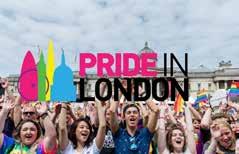
by racism. As a result of the controversy, several groups have cut ties with Pride in London, including DIVA, which previously hosted a stage at the annual event. Other LGBTQ+ organisations have spoken out in support of communities of colour, such as Mermaids, which released a statement saying: “The departure of staff and volunteers reflects broader issues around structural racism within society. We continue to work towards making Mermaids a space where all young trans, non-binary and gender diverse people feel welcomed, heard and seen.”
“The departure of staff and volunteers reflects broader issues around structural racism within society...” Mermaids
Mermaids, which has been helping gender-diverse kids, young people and their families since 1995, joined Stonewall in calling for the mayor’s office to launch an immediate investigation into the accounts of racism and bullying, with publication of the outcome.

Pride in London is still due to be held in September, with the new chairs and board members yet to be announced. Afflick said he stands by his decision to make his experiences public, adding: “I cannot stand by an organisation that appears to be insistent on failing black and brown voices in LGBTQ+ communities.”
D More info on Stonewall: www.stonewall.org.uk
D More info on Mermaids: www.mermaidsuk.org.uk
“We’re willing to make a gift to Martlets in our Wills.”

Martlets’ Will Writing Month May 2021
1 in 3 of our patientsis cared for thanks togiftsin Wills.
Booking Period: 01–30 April. Will Writing Month 03–28 May 2021
Write your Will for the people and causes you love in return for a donation to Martlets of £150 for a single Will or £200 for joint Wills. Choose from one of the Will writers listed here and contact them directly to make your appointment.
Greg Hall
Barwells 10 Sutton Park Road
Seaford
BN25 1RB 01323 899331
greg.hall@barwells.com *appointments also available at Peacehaven & Newhaven offices
Maureen Edwards
Burt Brill & Cardens 30 Old Steine
Brighton BN1 1FL 01273 604123
Emily Wardrope
Coole Bevis
79 Church Road
Hove
BN3 2BB 01273 722532
emily.wardrope @coolebevisllp.
David Crosby
Crosby & Woods
75 Church Road
Hove
BN3 2BB 01273 734600 david@crosbywoods.co.uk
Kirsty Claridge
The Deans Legal Services
57 High Street Rottingdean BN2 7HE 01273 358825 kc@tdls.co.uk
Paul Green
Dean Wilson 165 Dyke Road
Brighton BN3 1TL 01273 249200 pgg@deanwilson.co.uk
Tracey McSharry
Deibel & Allen Keasley House 10 Franklin Road Portslade BN41 1AN 01273 430999
tracey.mcsharry @hensbylaw.co.uk
Deanne Ferguson
Fitzhugh Gates 3 Pavilion Parade
Brighton BN2 1RY 01273 666323 deannef@fitzhugh.co.uk
Katie Carter
Green Wright Chalton Annis
29 Boundary Road Hove
BN3 4EF 01273 253500 katie.carter@gwca.co.uk
Robert Simon
Robert Simon & Co.
St Mary’s House, St Mary’s Road, Shoreham By Sea, BN43 5ZA 01273 452333
robert@robertsimon.co.uk
Mark Stubberfield
Taylor Rose MW
Sussex Innovation Centre Science Park Square
Falmer BN1 9SB 01732 758545
mark.stubberfield@
Peter Tuffin
UHY Hacker Young
168 Church Road
Hove
BN3 2DL 01273 726445 p.tuffin@uhy-uk.com
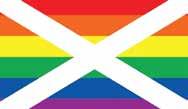
) Scotland’s national LGBTQ+ equality organisations launched a manifesto for LGBTQ+ equality for the next Holyrood Parliament, calling on the next Scottish government to further commit to improving the lives of Scottish LGBTQ+ people.
Stonewall Scotland, Equality Network, LGBT Youth Scotland and Scottish Trans Alliance are calling for:
• Gender identity health services that are fit for purpose, ending years-long waiting lists
• Reform to the Gender Recognition Act to remove barriers to legal recognition of gender identity, and a ban on ‘conversion therapy’
• Better understanding of LGBTQ+ lives and issues in health and social care, and especially mental health services, to ensure these deliver for all
• Continued implementation of the LGBTQ+ inclusive education programme agreed by the last Parliament
• Practical steps to tackle hate crime, homelessness, isolation, especially in rural areas
• Clear leadership from the Scottish government on LGBTQ+ equality, here, and in their international relations

Colin Macfarlane, director of Stonewall Scotland, said: “On May 6, we’re voting for the society we want to live in. Of course, there are issues that divide opinions but during the debates over the next couple of weeks, we must keep LGBTQ+ equality firmly on the agenda. The world has changed considerably since 2016. If that shows us anything, it is that we can’t take the progress we have made for granted. We need to join our voice with thousands of others over the coming weeks, to press for a Scotland where every LGBTQ+ person is free to be themselves and thrive.”





) Peer Action, a volunteer-led HIV support group and a registered charity, is currently looking to recruit new trustees. Some of the group’s current trustees are temporarily filling in roles during the recruitment process. Peer Action stresses that trustees do not have to be HIV+ nor do they need to live in the Brighton area. The roles that need filling are:
Chair: Works in partnership with the board of trustees and supports the volunteers, helping them achieve the aims of the charity. The chair will optimise the relationship between the board of trustees and volunteers, and facilitate the board of trustees in carefully considered strategic decision-making.
Secretary: Ensures meetings are successfully organised and minuted; maintains effective records and administration; upholds the legal requirements of governing documents, and charity law.
Treasurer: Monitors the financial standing of the charity and reports to the Board regarding cash-flow forecasting, income streams, outgoing expenses and the overarching strategic management of the charity’s financial resources.
Therapy coordinator: Recruits, assesses and supports volunteer therapists in a variety of roles to provide support to members.
Digital resources: Monitors the digital health of the charity and reports to the board regarding the overarching strategic management of the charity’s digital resources.
In addition, Peer Action is looking for trustees to help plan strategy and events and fundraising.
If you’re interested in a particular role, email coordinator@peeraction.net
D www.peeraction.net

Vic Valentine, Scottish Trans Alliance manager, said: “Coronavirus has affected us all, but it has plunged trans people’s healthcare into an even deeper crisis - people already expecting to wait two years for a first appointment will now wait even longer. We desperately need the next Scottish Parliament to unite behind the idea that everyone in Scotland deserves to live happy, healthy lives.”
D To read the manifesto in full: https://www.equality-network.org/wp-content/ uploads/2021/03/LGBTI-Equality-Manifesto-2021-26-Scottish-Parliament.pdf
) Brighton’s Joe Black was the first queen to be eliminated in this season of RuPaul’s Drag Race UK but returned midseason to replace Veronica Green. However, Joe’s return was short lived when he decided to wear a pink H&M dress in the RuRuVision Song Contest RuPaul’s outburst over the offthe-rack dress has now become a meme and has gone down in Drag Race Herstory!

Joe has now donated the infamous pink H&M dress to be raffled off to raise funds for HIV charity Sussex Beacon, said: “I’m so happy that the most dramatic and infamous fashion choice on TV this year can genuinely impact and help people. So it’s my absolute pleasure to be handing this over to the Sussex Beacon and hopefully together we can help raise a lot of money for a charity doing such fantastic work. Fashion changes lives but only if a television host is really, really angry about it.”
D To enter the raffle, visit: https://scene.pub/3srfbEz

) Martlets, a local charity caring for people living through a terminal illness in and around Brighton & Hove, relies on the generosity of local people to fund its services and one in three of its patients are cared for thanks to gifts in Wills.
When you write your will, your first concern may be to make provision for your close family and friends. But the charity hopes you may also consider
including a gift to Martlets. A gift of any size will make a difference that helps Martlets to care for local people with life-limiting illnesses and their families.
Every year, Martlets teams up with professional will writers who offer to write your will in return for a donation to the charity. Some people also use the scheme to remember Martlets in their wills. Bookings can be made from Thursday, April 1 to Friday, April 30, 2021.
To register your interest, email Martlets’ Gifts in Wills manager Gary Moyle: gary.moyle@martlets.co.uk
D For more info on Martlets, visit: www.martlets.org.uk

) Switchboard, a charity for LGBTQ+ people looking for community, support or info, is seeking a new operations
and development manager; someone with strong people management skills, experience in operations, project management and development.
Closing date for applications is Monday, April 5, 5pm
D For more info, visit: www. switchboard.org.uk/jobs/


) Socially Engaged Art Salon (SEAS) is presenting The Force of Fantasy, a new exhibition, online and at The Ledward Centre until Friday, April 16
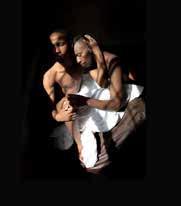
The Force of Fantasy is a group exhibition curated by Ricardo Reverón Blanco and includes Blast Theory, Cedar Lewisohn, Gil Mualem-Doron, Mitchell Moreno, Noraa James, Phoebe Boswell, Sam Moreno Alamein and more.
Taking Judith Butler’s essay, The Force of Fantasy: Feminism, Mapplethorpe, and Discursive Excess, as a starting point, this exhibition proposes that fantasy is a powerful tool to not only imagine alternative futures but to manifest them by looking beyond convention. The Force of Fantasy will enter the extraordinary as a means to open up dialogues about gender, race, class, and critique our pervasive social hierarchy.
Curator Ricardo said: “Fantasy is crucial for (re)thinking what could be. The Force of Fantasy invites you to imagine what possibilities might lie in the not so distant future; by tilting realism sideways or exploring imaginative worlds, the artworks selected aim to make you question our world’s infrastructure. What could be if we imagine alternative possibilities to the social order? Can myth become reality? If so, treat these works as portals to better understand our world, and in doing so, transport us to more equitable lands.
“Each artist’s perspective is unique and selected by how they relate to the arguments made by Judith Butler in the essay that inspired this exhibition.”
Mitchell Moreno took the first Covid-19 lockdown as an opportunity to consider: What might a visual language of mental disorder look like? Whereas Phoebe Boswell explores Shakespeare’s fictive plays to explore Othello’s racial themes in a historical and contemporary setting drawing parallels between immigration and blackness in the UK today.
) To see the exhibition, click on the exhibitions tab at www.ledcen.org.uk or visit www.seasbrighton.org/post/19-03-exhibition-opening-the-force-of-fantasy
To see it in the flesh, stroll past the window of TLC near to Jubilee Library
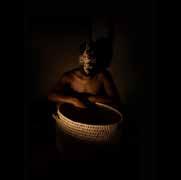
) Socially Engaged Art Salon (SEAS) and The Ledward Centre (TLC) are seeking LGBTQ+ creatives with a refugee/migrant background.
The call is open to artists, photographers, writers or filmmakers from the UK or elsewhere, to submit photos, paintings, drawings, text-based art, short films, poetry and short stories.
Any themed work will be considered, but the preference is for work that is related to lived experiences or is narrative-based, social or political. If required, artists can make contributions anonymously or use pseudonyms.
The exhibition will take place in the window of TLC, in the heart of Brighton, as well as online and will be accompanied by a catalogue/zine.
Each selected artist will receive between £20-£100, depending on the contribution.
) Deadline is Saturday, April 10. To submit, visit: www.curatorspace.com/.../ call-for-works-by.../5327

♦
♦
♦
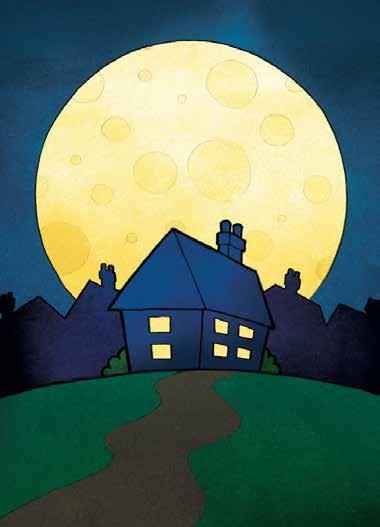

) Hear Us Out, a participatory arts project run by New Writing South celebrating older LGBTQ+ people’s stories, has announced a second programme of free, participatory activities.

Since its inception in 2018, Hear Us Out has worked with a community collective of LGBTQ+ volunteers to collect the funny, touching and celebratory real-life stories of older LGBTQ+ people across South East England. Working with a company of local LGBTQ+ performers, these stories were turned into a series of digital performances as part of an online programme of events at the end of 2020.
This month, Hear Us Out will be offering more storytelling and performance opportunities with some events continuing into May. The project is primarily aimed at LGBTQ+ people over the age of 50, but anyone in the LGBTQ+ community will be welcome to join any of the project’s five online activities.

Dinos Aristidou, artistic director of Hear Us Out, said: “Interested in writing, performing, directing or reading? This new phase of Hear Us Out offers an exciting number of creative opportunities for older LGBTQ+ people to get involved, try their hand at something new, connect with new people and make new friends in a safe and enjoyable space.”
• Directing and Performing Verbatim Theatre on Tuesday, April 20, 10–11.30am. Learn about performing and directing verbatim stories with artistic director, Dinos.
• Telling and Sharing Our Own Stories on Wednesday, April 21, 10–11.30am. Learn approaches to telling your story and create a digital performance.




) Brighton-based HIV charity the Sussex Beacon has announced that Jill Nalder, the actor whose life was an inspiration for the TV series It’s A Sin, has agreed to join the charity as a patron.
Jill is a great supporter of many charities and has helped the Sussex Beacon since its beginning, helping to raise funds to found the charity.
Jill said: “It is great to reconnect with the Sussex Beacon and the work of this great charity. I look forward to being involved and supporting them in the future.”
D For more info on the Sussex Beacon: www.sussexbeacon.org.uk
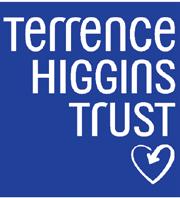
• Breakdown of the different drugs that are used during chemsex;
• Findings from the chemsex survey carried out by THT, Buzzfeed and Channel 4;
• The impact of chemsex on individuals;
• Guidance around support that can be offered to people involved in chemsex.
The training is free, and will be delivered interactively via Zoom

• Imagined Conversations from Thursday, April 22–Thursday, May 6, 10–11.30am. Become part of a theatre group. Meeting on a regular basis, this online group of LGBTQ+ performers will work with guest director Tanushka Marah to create and perform short scenes based on LGBTQ+ older people’s real life stories and experiences. Participants will explore how real life stories can be used as a starting point for playwriting and how these can then be performed digitally.
• Hear Us Out Book Group: Collected Works CIC on Friday, April 23 and Thursday, May 20, 6pm. Do you want to read and discuss LGBTQ+ books with like-minded lit lovers? Join Collected Works to read and discuss some of the best and brightest new LGBTQ+ fiction, offering inspiring, surprising, and beautifully written reads.
) Sexual health/HIV charity Terrence Higgins Trust (THT) has announced it’s running free Chemsex Awareness Training this month.
This is a new one module online training session and will cover:
• What chemsex is;
The training is just one module so if you are interested, sign up to one of the following dates (all Thursday, 10am–1pm): April 15, April 29, May 13 and May 27
If you would like to sign up to either of these sessions, email brightontraining@tht.org.uk
children and young people, the training sessions are:

• Hear Us Out Book Group: Radical Rhizomes. Hear Us Out is also supporting a second online book club for members of Marlborough Productions’ Radical Rhizomes - a Brighton & Hove based support and social group for queer, trans and intersex people of colour. If you are interested in joining, visit: www.marlboroughproductions.org.uk/ourprojects/radical-rhizomes/
D For more info and to register for any of these events, visit: http://hearusout.live/events/
D For more info on New Writing South, visit: www.newwritingsouth.com

) Allsorts Youth Project, which listens to, supports & connects children / young people U26 who are LGBTQ+ or unsure of their gender identity and/ or sexual orientation, has announced the return of its online LGBTQ+ Awareness and Inclusion Training
Aimed at individuals who are supporting, or likely to be supporting, LGBTQ+
• Understanding & Supporting LGBTQ+ Children & Young People: three-hour session on Tuesday, May 4 from 9.30am–12.30pm, £45
• Understanding & Supporting Trans & Gender-Exploring Children & Young People: three-hour session on Thursday, May 13 from 9.30am–12.30pm, £45
D For full details, visit: https://bit.ly/3rSQ0KI




) Following UK health ministers have almost doubled funding for national PrEP roll-out, with £23.4million, an increase of £12.4million from last year, being ring-fenced to cover the costs of the HIV prevention drug for 2021 and 2022.

Jo Churchill MP, minister for prevention, public health and primary care, announced the decision in a statement which read: “We know the significant impact PrEP plays in reducing HIV transmission, as part of a combination of preventative interventions.”
Churchill said the increased funding is part of the government’s plan to ensure no new HIV transmissions by the end of this
decade: “This is particularly welcome for individuals and allows increased access despite the demands on services throughout the Covid-19 pandemic. This funding will benefit tens of thousands of people and take us closer to our commitment of zero new HIV transmissions in England by 2030.”
Richard Angell, head of policy at HIV/ sexual health charity Terrence Higgins Trust, praised the funding boost, saying:

“As lockdown 3.0 comes to an end and more people start to have sex – or more sex – again, we absolutely welcome what looks like a significant and important uplift in funding for the delivery of PrEP over the next year.” He described it as “an important move” from the government and hopes it will provide “peace of mind for current PrEP users knowing their access will continue.”
D For more info on THT, visit: www.tht.org.uk

) Healthwatch Brighton & Hove, the watchdog for health and social care issues, is inviting applications to join its Board.
Healthwatch is seeking to enhance the diversity of the Board, so if you have a black, Asian, or minority ethnic background, or you are a younger person, it is particularly interested in hearing from you. It’s also interested in hearing from people who have existing links into the local voluntary sector, and/or with finance expertise, or a background in digital inclusion.
All directors are volunteers, unpaid, but with reasonable expenses being met. Directors are appointed for three years, with an opportunity to extend for a second three-year tenure.
If interested, send a CV and cover letter by 4pm on Monday, April 19 explaining why you’d like to become a director and how you meet the role description and person specification. More info: www. healthwatchbrightonandhove.co.uk/ work-with-us
To discuss, contact david@ healthwatchbrightonandhove.co.uk or 07931755343


The LGBTQ+ Shop sell ‘La!’ merch with 100% going to Sussex
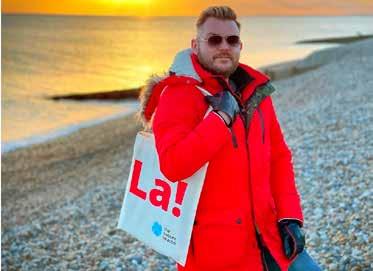
) With It’s A Sin bringing increased awareness of HIV/AIDS, the LGBTQ+ Shop has decided to sell a range of ‘La!’ slogan merch with 100% of profits going directly to the Sussex Beacon, which provides specialist care and support for people living with HIV in Sussex.

Kevin Coyle, MD of the LGBTQ+ Shop, said: “The reason we choose the Sussex Beacon was a purely personal one. It is a wonderful Brighton-based organisation which provides specialist care and support for people living with HIV and it has helped a number of friends of the team at the LGBTQ+ Shop. With this range we hope that any much-needed funds raised can be used in helping and treating people living with HIV.”
) Sashay into summer with the La! Tote Bag (£9.99), which is the ultimate accessory and perfect for the beach, shopping or work. It folds and can be kept easily in your pocket or handbag. Postage is free on this bag.

) Have a brew content that you’re supporting the vital work of the Sussex Beacon with the La! Mug (£11.99), which has the slogan on one side and the Sussex Beacon logo on the other.
) There’s also a range of lightweight V-neck T-shirts in a variety of colours (£24.99), or slip on a fetching double-sided neon number (£26.99).
D For the full range of ‘La!’ merch, visit: www.thelgbtqshop.com/la-merchandise
D For more info on the Sussex Beacon, visit: www.sussexbeacon.org.uk
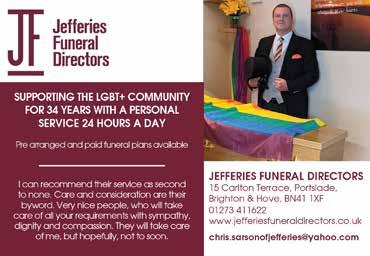
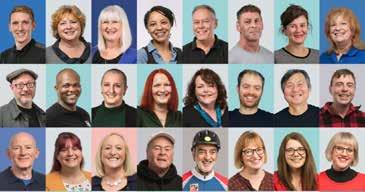
) Stories of hope, kindness and humanity have been brought to life on the sides of 24 new Brighton & Hove buses following a Brighton & Hove Buses campaign to find and celebrate people who have gone out of their way to make a positive impact on other people’s lives.
Photos of 24 community champions will appear on bus sides with a little bit about their amazing achievements on panels inside. Some are involved with supporting disabled families, others with keeping the city’s tap water clean, running football sessions for disabled children, setting up dance groups, connecting isolated people or battling homelessness.
One of these women is Patcham High School staff governor and learning mentor Kate Jordan, who supports vulnerable children through personal and educational issues. Kate also volunteers for the BAME Young People’s Project and is equalities officer for the National Education Union. Her overriding passion is ensuring that young people get a good education, regardless of their family background, race, gender or sexuality.
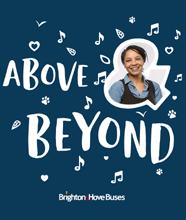
Kate said:“We are at a critical mass, with a mental health crisis in children in this country,” said Kate. “But it’s not about how I have coped in the pandemic, it’s about what we’ve done as a team and the bond which has grown even stronger between members of staff and kids.
“People have just been incredible; like the hidden heroes in the canteen who know the kids who need a decent meal. School is a safe space. It’s the most important place if you have children or look after children. You take each day as it comes and make the most of it.”
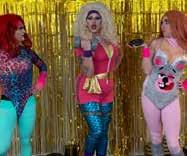
) Join Cherry Fakewell for drag aerobics live on Facebook on Saturday, April 24 at 2pm, FREE but donations suggested on PayPal, link when event is live. Expect dance routines to get you pumping some muscle and using dem buns!
Cherry said: “This is Cherry Fakewell, Brighton’s pound shop queen! Vogue your way to a new life of fitness, health and well-being. You just need some shorts/joggers and T-shirt/vest; a pair of dumbbell weights, two bottles or water, two books, or two cans of beans, even two chihuahuas, OR YOUR GRAN, to do some light weightlifting.”
D To join, visit Cherry’s Facebook page: www.facebook.com/Cherry-Fakewell




) It may only be spring but Martlets, the charity caring for people living through a terminal illness in and around Brighton & Hove, is on the hunt for drag queens to feature on the front of its 2021 Christmas cards, which will be sold in its shops and online.
Last year, the charity did sea swimming group the Salty Seabirds but this year would like to feature five to six local Brighton drag performers, with a Christmas theme. Each submitted photograph will be turned into an illustration!
While the charity won’t be able to
pay royalties, it hopes the pleasure of being able to send Christmas cards of themselves to friends and family will more than make up for it!
Martlets say: “These Christmas cards are very popular and really help our fundraising so we hope this will be a great addition to our Best of Brighton theme.”
To submit a photograph, email communications@martlets.org.uk with Drag Christmas Cards in the subject line.
D www.martlets.org.uk

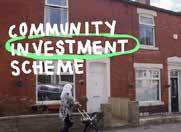
) Three community projects in Brighton – Facts Not Fear from Black and Minority Ethnic Community Partnership (BMECP), Sustaining Discourse on Organ Donation from Chinese Educational Development Project (CEDP) and Creating BAME student-led opportunities to expand organ donation awareness across universities in England from University of Brighton – have received a share of more than £28,000 from government to tackle health inequalities and promote blood and organ donation in Black, Asian and Minority Ethnic (BAME) communities.
The funding aims to address the shortage of organs, particularly kidneys, for those waiting for a transplant from all BAME backgrounds, while also highlighting the need for more blood donors from a Black background, whose blood is used to treat patients with conditions like sickle cell.
The Community Investment Scheme, which is led by NHS Blood & Transplant, will fund local organisations
to drive awareness, understanding and behaviour change. Having previously only focussed on promoting organ donation, the scheme now includes projects which also highlight the importance of blood donation.
Altaf Kazi, head of Faith & Belief Engagement at NHS Blood & Transplant, said: “Through the Community Investment Scheme we have seen firsthand the abilities of trusted individuals and community groups to prompt conversation, tackle misinformation, educate and offer reassurance around organ donation and now blood donation. Often a person’s best donor match will share their ethnicity, but too many donation opportunities are missed because families haven’t discussed organ donation, and BAME people are seriously underrepresented when it comes to donating blood.
“We are asking more people from BAME communities to find out about both blood and organ donation and help us to address the inequalities that many members of these communities may face. By giving your support you can help save lives.”
D For more info about the scheme, visit: www.nhsbt.nhs.uk/how-youcan-help/get-involved/communityinvestment-scheme/



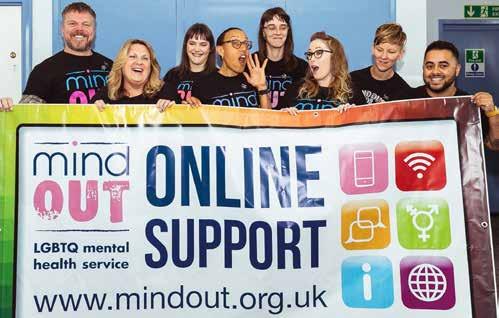
) MindOut, the LGBTQ+ mental health charity, has announced a limited number of bursaries for Black and trans/QTIPOC counsellors to undertake training.
Bursaries are open to QTIPoC (queer, trans and/ or intersex people of colour) and to all LGBTQ+ people of colour.
MindOut say: ‘We recognise that Black people in our communities face exceptional barriers and we expect that at least one recipient will be Black. We especially hope to award eligible QTIPoC, as people with these intersectional identities have been historically excluded from the counselling profession.”
MindOut is offering these bursaries in partnership with the University of Brighton for students to join their Humanistic or Psychodynamic PGDip courses. These two-year part-time trainings start in October 2021, and will be attended in person (so applicants should be local, or available to travel for study). Applicants should hold any undergraduate degree or a professional qualification (e.g. nursing, teaching) and should have completed at least a Level 2 Certificate in Counselling Skills by the time
the course starts, and have experience of personal therapy as a counselling client. Bursaries will cover 50% of course fees and related expenses (personal therapy, supervision etc.) – recipients will be offered a training placement in-house with MindOut’s busy, low-cost LGBTQ+ counselling service.
Applications close Sunday, April 11. A two-stage interview process will run through April and into early May. You do not need to apply separately to the University of Brighton, this will be done as part of your bursary application (if you are invited to stage 2). However if you have already been offered a place on their course you may apply retrospectively for a bursary, subject to our deadline. Please ask for details.
How many bursaries are available?
MindOut: “We expect to offer at least two training bursaries on a 50% basis (covering 50% of course fees and related expenses such as personal therapy, supervision etc.) – this amounts to around £3,304 per year for two years, and applicants will need to meet the rest of those costs themselves.”
Can you offer more than 50% bursary?
MindOut: “We recognise that finance can be a
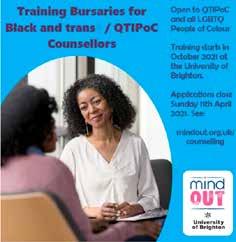
significant barrier to entering the counselling profession – one reason why it might historically be seen as a white, cis-gendered and middle-class profession. We also have a responsibility to spend these funds carefully, maximising the long-term positive impact for Black and trans communities. We need to be confident that those who start the training will be in a strong position to complete it, over a 2+ year period. This means that we sadly cannot fund those who do not afford the remainder of the costs.”
I’m Black but not LGBTQ+. Can I apply?
MindOut: “Unfortunately not. We recognise the importance of training more Black counsellors irrespective of sexual orientation or trans history. However, all MindOut activities are offered ‘by and for LGBTQ+ people’ and this is vitally important to our clients and service users, staff and volunteers, and funders.”
I’m trans but not Black / a person of colour. Can I apply?
MindOut: “Unfortunately not. These bursaries are targeted at Black LGBTQ+ and QTIPoC communities who are historically excluded from the counselling professions and who are currently under-represented. Our intention is to increase the provision of relevant counselling services for people with these intersectional identities.”
D To apply, download an application form: www. mindout.org.uk/…/MindOut_QTIPoC_Bursary_ Application_Form-1.docx
D For more info on MindOut, visit: www.mindout.org.uk

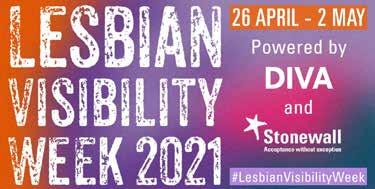
) Lesbian Visibility Week, powered by DIVA magazine and LGBTQ+ charity Stonewall, aims to show solidarity with every woman within the LGBTQ+ community, as well as celebrate lesbians. Organisers say: “It is essential that Lesbian Visibility Week is a voice for unity and lifts up ALL women, especially those who come from marginalised communities.”
DIVA and Stonewall want to create a week that recognises, celebrates and importantly supports lesbian, bisexual, transgender and queer women across the UK and beyond to be their true selves at work, at home and socially.
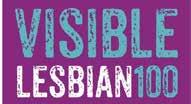
) DIVA LAUNCH – VISIBLE LESBIAN 100 on Mon, April 26. Visible Lesbian 100 is designed to highlight women who have made great strides for the LGBTQ+ community generally, but women-loving women in particular. Women who are shaping culture and who, through their incredible work – whether in sport, music, business or politics – lift up those in the community who are most marginalised. To see the 2020 list, visit: www. visiblelesbian.com
) LESBIAN VISIBILITY WEEK – WELLBEING SURVEY RESULTS LAUNCH on Tue, April 27. As part of the first ever Lesbian Visibility Week, DIVA teamed up with Kantar to bring you The DIVA Survey: LGBTQI Women’s Insight 2020. The results of this brand new piece of research capture the diversity of the community, highlight the unique challenges women-loving women face and reveal a vision for the future. To see 2020 results, visit: www.visiblelesbian.com/the-diva-survey-results.html#/




) A new poll conducted by Totaljobs, in collaboration with YouGov, found two thirds of trans people in the UK hide their gender identity in the workplace through fear of discrimination. Out of the 410 people surveyed, only 51% of those who were open about being trans at work received a positive reaction from their colleagues when they came out. Furthermore, one third of respondents said they had experienced transphobic discrimination at work during the past five years.
Thirty-two per cent had experienced bullying, 27% had been deadnamed, 30% reported being deliberately referred to using the incorrect pronouns by colleagues, and 6% had faced physical abuse or threats of violence. Jon Wilson, chief executive of Totaljobs, said the findings are “deeply concerning”. These results build on research undertaken by LGBTQ+ charity Stonewall, which found 12% of trans employees had been physically attacked by a colleague or a customer during 2017.
Following the release of the results, trans advocacy organisation Mermaids told HuffPost that the findings do not “come as a shock”, due to the increasing public hostility towards the trans community. A representative of the organisation said: “We know that many trans and non-binary people choose not to disclose their identity for fear of rejection, and some can feel that being open in the workplace will bring about a whole host of issues that they’d rather avoid.”
D www.mermaidsuk.org.uk

) DIVA AWARDS 2021 on Thur, April 28 at 7pm. One of the most hotly anticipated events in the lesbian calendar, the annual DIVA Awards are a no-holdsbarred celebration of the achievements of gay, bisexual and trans women – and their allies – across business, the media, politics and sport. Hosted by Adele Roberts and Kate Holderness with a live performance from Heather Small For more info, to see the shortlist and to vote, visit: www.divaawards.co.uk/

) DIVA PRIDE on Sat, May 1
Clear your diary for some incredible performances from your favourite LGBTQ+ women. You’ll be in good hands for the whole event, with the wonderful Char Bailey and the fabulous Saski as your co-hosts. Expect juicy chats, hilarious banter and who knows what else from this dreamy duo. Watch last year’s DIVA Pride: www.divamag.co.uk/diva-pride-live/
D For more info, tickets, and to get involved by adding your own event to the calendar, visit: www.lesbianvisibilityweek.com
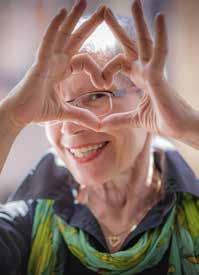


By Craig Hanlon-Smith

) Having written for this magazine for what must be approaching 20 years, I find the responses to some of my musings often as interesting as the original subjects themselves. The replies are pretty swift, especially now we are living our lives predominantly online. These may come in the form of contact via social media, often in private messages but sometimes very much public commentary. I may receive emails direct or through other contacts but there is always something. Celebratory and unpleasant in equal measure I would suggest, it is usually a balanced discourse if somewhat colourful.
In late summer 2020 I wrote about the drug use epidemic among our communities and in particular gay men of all ages. I was expressly referring to the international take-over of our minds, bodies and souls by the highly addictive and equally toxic crystal meth and its accompanying family of sex-party related intoxicants. My concern then, and it remains today, is our communities’ collective inability to talk about our shared drug problem that is killing our friends, partners and family members. That our collective silence on the subject is hurrying them along as if an unlicensed silent euthanasia. It is the first time I have written a piece and had no response from community
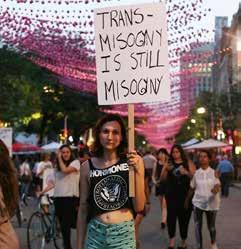
members whatsoever. Not one. In stark juxtaposition with the next piece wherein I had outlined shared mental health challenges during the first lockdown: I was inundated with responses. Ironic no, that the piece about our silence on drugs was met with silence. Ironic, ugly and dangerous.
“And in a quiet moment with yourself, have a word. When a woman, at work or play irritates you, is demanding, and yes sometimes unpleasant, what language forms your sentences with such ease? And would you use the same vocabulary when describing your grandmother?”
And then there’s our other problem. Misogyny. This is quite possibly the one subject that in 20 years I have returned to time and again, simply because we are getting even worse at accepting that misogyny is at the root of many of our social, cultural and political challenges. The last time I received anything close to what you may describe as hate mail, was after my article last summer which when published was given the title ‘In Defence of Priti Patel’. Now to be fair to most of the unpleasant respondents, it became starkly apparent in a few short words they had only read as far as the title and assumed the rest. Sigh. Said article was written in response to Ms Patel’s first appearance at the 5pm Covid press conferences in which she had presented a not unusual cold and dismissive self. My concern was with the responses to her performance, online, particularly in LGBTQ+ online forums and community Facebook groups. The language was violently threatening, often using sexualised vocabulary and of course the word b**** often a closing flourish. There were even calls for her to be killed mostly, in these groups from gay men.
My issue was with the ease of misogynistic postings and that no one in these groups appeared to notice or care. I am both saddened and maddened by the appearance again this week of similar language in relation to another
former female politician. It is never about the original story, or social media post, but the comments it inspires. How with such lazy ease the violence towards these women comes rolling out on to our community pages and remains unchallenged by all those who follow. The most recent postings, within a fortnight of the murder of Sarah Everard and ensuing discussions across our media outlets about misogyny. How utterly depressing.
Be mad at their politics, get angry at their selfcentred smug delivery. Rage at their inability to be in touch with the real world each time they open their mouths. But leave the violent, sexually marauding death threats out of it, along with their biological sex. To call upon their womanhood when referencing your anger, is to expose your misogyny and you become the problem. Not them.
“Misogyny. This is quite possibly the one subject that in 20 years I have returned to time and again, simply because we are getting even worse at accepting that misogyny is at the root of many of our social, cultural and political challenges”
I have said this before, and I will say it again. Misogyny is the root of all discrimination across our societies. The abusive language thrown at gay men both within and outside our communities is misogynistic, bottom shaming, referring to one of the men in a partnership as ‘the b****’ and so on. Not even subtle. Most transphobia directed at trans women is inherently misogynistic. The obliteration of trans-men from the trans discussion is because to the non-trans world we do not concern ourselves with the transitioning in that direction. The hysteria is around trans women. It is misogynistic. The worst thing we can call a boy is a girl. To describe men as feminine or effeminate has driven boys to depression and self-harm for generations. The idea of being womanly is considered so horrible. It is misogynistic. In the acronym LGBTQ+, the Lesbian is first and yet they are an oft forgotten essential within our communities. Misogynistic. Gay men have written lesbian women out of our histories. Where were the lesbians in It’s A Sin? I can assure you that, having walked that Soho scene in the early 1990s, they were everywhere and central to the HIV/AIDS war effort at every turn. Written out. Misogyny.
And in a quiet moment with yourself, have a word. When a woman, at work or play, irritates you, is demanding, and yes sometimes unpleasant, what language forms your sentences with such ease? And would you use the same vocabulary when describing your grandmother?
For a range of communities that thrives on its visibility, on its colourful parades and sense of pride, our secrets are among the darkest.
Do something about it. Do it today and do it differently.
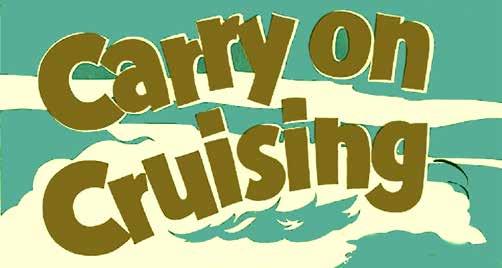
Jason Reid on the joys of beating around the bush and why outdoor cruising will never go out of vogue

) Everyone should try outdoor cruising at least once in their life. I won’t lie, if you’ve never got down and dirty under the stars it can be daunting at first, and most would agree that it’s definitely an acquired taste, but once you’ve got into the groove, it can prove to be very moreish. Have a couple of stiff ones before your first visit, then a few more when you get there (badoom-tsh).
Even in an age when Grindr and hook-up apps seemingly dominate, cruising spots remain a constant – albeit they’re not as popular as they were pre-internet and when gay men had to be much more covert when looking for sexual encounters.
However, in 2021 they still thrive and are at their busiest after dark and on weekends.
There’s just something about outdoor cruising areas that hits different. The thrill and brazenness of doing it in public, feeling your heart rate increase as someone cruises you, pacing back and forth exchanging long glances, the possibility of getting caught at any given moment – and this frisson of danger heightens the sexual tension among those gathered. It can be like a chase – animalistic and raw. The total opposite of hook-ups apps, which have none of that real life hunt, they leave me rather cold.
Dukes Mound in Brighton and Hampstead Heath and Hyde Park in London are the go-to places, and have been for some time. Unlike saunas –which I spoke about previously – cruising areas don’t really need to evolve to survive. Quite the opposite, in fact; the attraction is often the simplicity and rawness of the environment. Plus they’re not businesses, so don’t rely on punters’ cash. Nevertheless, from time to time these areas have to be redeveloped slightly by local councils
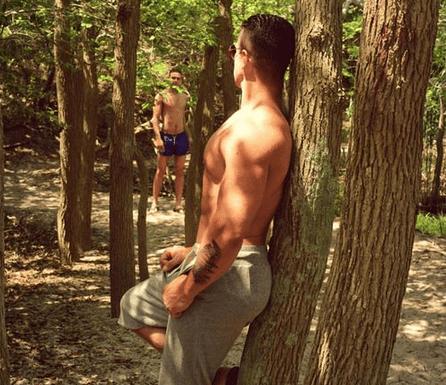
– and they are well aware of what goes on in the dark alcoves, as are the police, and would rather work with cruisers than against. Over the years I’ve seen bushes cut right back and areas exposed but we’ve carried on cruising because we’re an imaginative and determined bunch us gays –especially when it comes to getting our end way. We adapt, and bushes grow back. There’s never been a sense of being driven out.
At times police have turned up while I’ve been cruising – because they have to be seen to be checking – and everyone has hurriedly pulled their keks up and legged it; then the cruising continues when the coast is clear – like a game of cat and mouse. Unless you’re having a stark bollock naked group fuck out in the open under a street lamp, the police are not gonna waste their time nicking you. Being discreet and safe is key. It’s all common sense stuff, really.
I’ve always been of the opinion that, with any type of cruising, be it in a club, sauna, bushes or atop a mound, it’s best to go in with a nonjudgemental frame of mind, and without any grand expectations.
Swaggering into a gay sex area and being purposely loud and obtrusive rarely works out, and being disrespectful to fellow cruisers never works out and, for obvious reasons, can lead to conflict.
It’s important to be respectful of others, and expect that in return, regardless of age or sexual attraction. This brings me on to consent, which is incredibly important. If you are cruising someone and they’re not responding (giving you the look back, because it’s all in the eyes) leave them alone. Don’t keep following. Persistence of this kind will cause the other person to feel threatened. This has happened to me a number of times and it’s horrible. Not once have I given in to such insistence; in fact it’s always turned me from being disinterested to utterly repelled.
Similarly, if you’re in a group scenario and someone pushes your hand away, that means they’re not into you, end of – I know that sounds straightforward, but you’d be surprised –and as difficult as that is for some men’s egos, I can’t stress how important it is to understand the signs and act responsibly. Never force something. Know the boundaries.
No one wants any of that. It causes a bad vibe and is creepy. Basically, don’t be a dick when you’re hunting for dick.
There is a LOT of fun to be had with outdoor cruising. I’ve lived out some of my wildest fantasies in parks and woods; I often think back and can’t believe that some of it actually happened.
My advice to newbies is always assess the environment first, take a good walk round, get a feel to see if the vibe is for you, and if it is then stash away those valuables in a bag or down the side of your socks, and get stuck in!
I’m pretty confident that outdoor cruising will still be active in some form when we’re all gone. No amount of hook-up apps or redevelopments will change that.
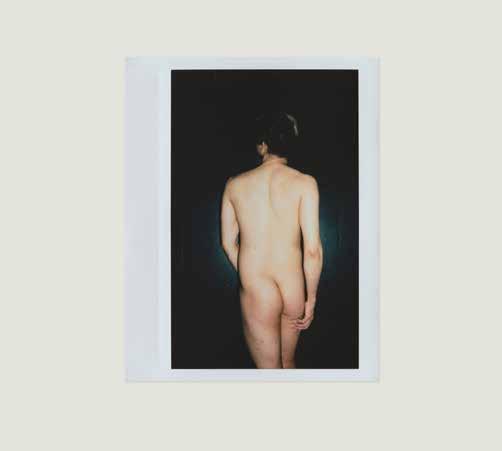

) The hegemonic, male, dominating themes have always been clear in my life. Toxic masculinity is interchangeable, but it seems to cement in my memories. It’s glorified to some in the gay community and has become accustomed in everyone’s lives. Yet somehow we allow this metaphysical trait to affect our mental health.
As a young gay boy, year-7 at an all-boys state school in London, masculinity was what gave you ratings. Being anything other allowed reservation for bullying. Bullying made me question my identity; who was I? Who did I want to be? My identity was something they could never take away from me. My diverse heritage and culture further made things confusing for me. Fabulously ironic – I now cherish every unique extremity of my identity, yet it was toxic masculinity that wanted me to change. Many notions of masculinity start from culture. There always seem to be block structures on how to embody culture. Gender roles are essentially composed through society and masculinity standards vary cross-culturally. We’ve all heard the absolutely nonsense phrases: ‘boys don’t cry’, ‘man up’, ‘be a real man’ etc. Men should not feel pressured to be physically and mentally strong. These phrases advocate for men to not express their feelings, in fear of being anti-masculine or ‘girly’. As a young boy, I didn’t want to be masculine. Playing football or WWE wrestling with my brother, ew… (unless I played the sexy, empowered female characters of course). I wanted dresses, dolls, curtains for wigs and P!NK. However, this soon led to feeling lost.
Feeling trapped in a conundrum wanting me to falsify my identity. As an adolescent, expressing myself in school was shunned upon and there began the conditioned silencing preempted by toxic masculinity.
Aforementioned, there are many subsets of culture. We are all becoming more conscious to modernise outdated binary identities. A big misconception, which still lingers today, is that queer boys are not masculine. Having said that, I’ve found that there aren’t any deciphering measures to illustrate identity. Heterosexuality dominates the mood of toxic masculinity. I am a 22-year-old gay man; heteronormativity was prevalent during my education. A default standard of masculinity becomes problematic when that doesn’t align with your identity. Especially with young people, the abnormality is seen as taboo. I remember the years I didn’t have time for anxieties and wore all the wrong shades of foundation on my face – signifying big F You. Make-up generally had connotations of femininity, which I identified with then, so by wearing it, I was challenging toxic masculinity.
Hypermasculinity’s polar opposite is hyperfemininity, yet the two are conceptually bound. So, would it be the macho insecurity and fragility against femininity that has caused this hostile division? Masculinity wouldn’t make sense without femininity. Therefore the couple is paired unitedly in a conceptual entanglement. In school, I knew that expressing myself meant that I wouldn’t fit in. Masculinity was new to me, but I knew it would ‘reward’ with friends. Additionally, it would protect me. I think many young queer boys sadly mitigate their sense of masculinity: I remember the sense of failure when trying to conform to the obligatory heterosexuality that is seen throughout society.
Straight men are at the forefront of scrutiny; there are elements of gay culture that seem to be infatuated by masculinity and toxicity. I’ve always been attracted to masculine men and I wanted to avoid being feminine. This glorified masculinity for me; it was a goal, it was sexy, it was attainable. This pressure to have a binary ‘straight’ character creates an abundance of toxic pressure and glorifies heterosexuality over homosexuality. I soon realised it was mostly fabrication and I stopped caring to be anything other than myself. I watched masculinity adhering to social imperatives, but when this masculine effect becomes affected, it crumbles – terminating its masculinity and thus a facade. Many supersede the testimonial understanding of masculinity, which is favoured in gay culture, as an identity purpose. Besides, this judgement negatively influences our mental health. Gender nonconforming individuals are affected regularly with self-esteem issues and experience higher levels of depression and anxiety, which suggests the stereotypes we attach to masculinity habitually affect our self-identity.
Being somewhat outcast by society and then further marginalised by your community will cause a detrimental attack on your selfesteem. These boundaries enforce division and hierarchy. However, some queer men continue to strive to embody cultural notions of idealised masculinity – #masc4masc. Gloating about their physique, demeanour, or their place in a queer hegemonic hierarchy will only further ostracise other personalities/identities within queer communities. This is highly prevalent in dating apps, which divides our communities. Homosexual is now recognised with more attributes than just ‘feminised men’. Queer masculinity has been westernised and is mainstream cross-culturally.
There is a sense of premium with queer masculinity. “Feminine-acting men are seen as less desirable sexual partners”, says Justin Lehmiller, a psychologist at the Kinsey Institute who studies human sexuality. Although masculinity can be toxic, queer culture has made an innovative change to masculinity. Masculinity is now pluralised, malleable, a style and queer – denaturalising the idea of masculinity and thrown to the discursive. It is no longer exclusive and has fluctuated through cultures and compounds inside what has been traditionally feminine.
Demonising masculinity is wrong and this is not an attempt to. For queer people, ‘traditional masculinity’ had been the oppressor. However, there are brilliant aspects of traditional and contemporary masculinity which accommodates us all… fiercely. Homophobia is not a form of masculinity! Fluidity in masculinity is becoming psychologically accepted and pressures have been relaxed. Given this spectrum, then perhaps the ‘desirable’ man should not be confined to #MascOnly.
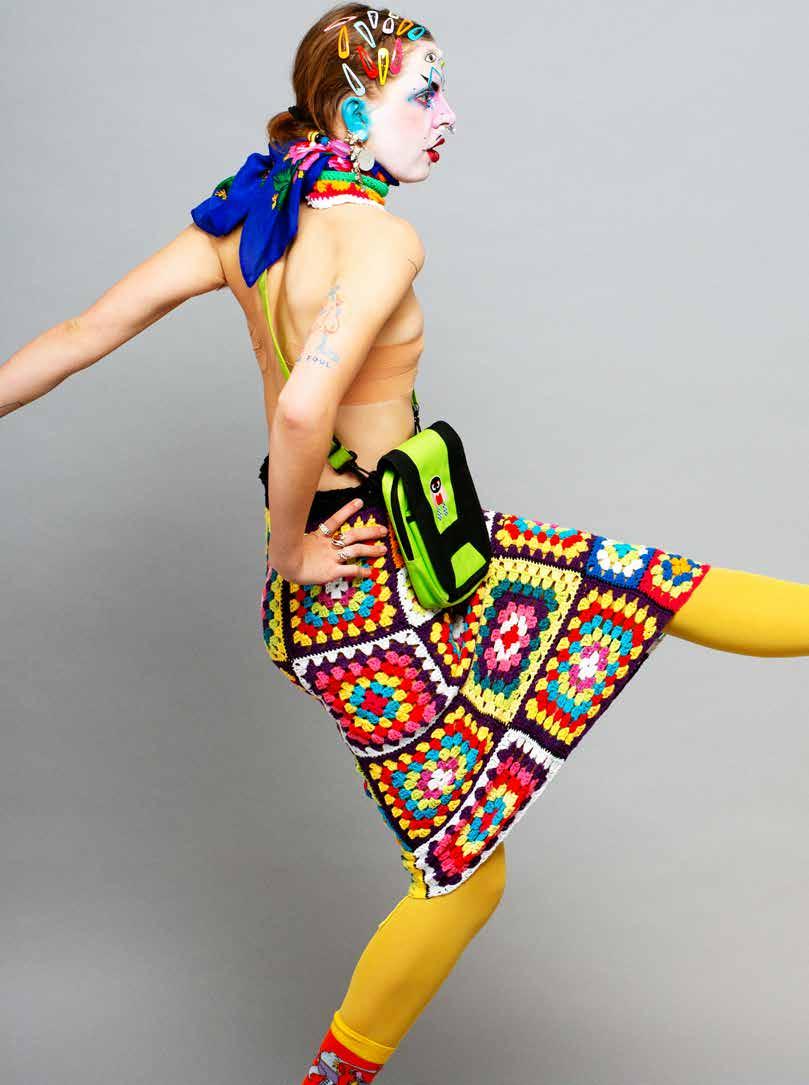

For years certain jobs have seemed to attract people from the LGBTQ+ community more than others. What might be behind this phenomenon
There are LGBTQ+ people working across all manner of professions and environments, as evidenced by our themed features this issue. But some jobs are seen as more stereotypically ‘gay’ or ‘lesbian’ than others – the most obvious that spring to mind being hairdressers and flight attendants for men, bus drivers and plumbers for women.
The question of why this might be has long been the subject of academic discussion, and we turned to James Ravenhill, a senior lecturer in the School of Applied Social Science at Brighton University, to try to get some answers.
James’ interests lie in LGBTQ+ health and wellbeing, and in gay, bisexual, and trans masculinities, and he has a wealth of knowledge in the various academic theories that lie behind the ‘gay job stereotypes’.
There are many different ways of looking at the issue; one explanation is around “refuge and safety”. Because certain pursuits are deemed by society to be more masculine and others more feminine, “one reason why gay people might end up in careers that are ‘gender discordant’ is because they learn really early that the pursuits more typically associated with people of the other gender provide safer domains,” says James. “Boys in particular are socialised in the demands of masculinity, what it takes to be a good boy… like chasing the girls, being naughty, troublesome, doing all the gender playing. They learn that that’s what it takes to be a good version of a boy, and when they fail at that the world is really hostile so they find sanctuary with the girls. The girls aren’t bothered about bullying them or calling them poofs, so homophobic discourse is used by men in particular to police boundaries of masculinity.”
One idea James says he loves is that “gay people are free of the gender role constraints that some straight people almost unquestionably feel they are subject to”. He continues: “We get to queer everything. We get to go, ‘I know men are normally bus drivers but I’m a woman and I’m going to be one. Screw you…’ A gay identifying woman goes, ‘I don’t feel constrained by the gender expectations people have of me because I’ve already fucked it all up, look at me, I sleep with women. I’ve already fucked up femininity because women sleep with men.
“It’s not a conscious thing, it’s more that they’re relieved of gender roles or strain.”
Another theory addresses the phenomenon of cabin crew, and James gives the example that a working man’s pub in the Midlands could exclude gay men, but “when they take off from Birmingham International airport and they’re in charge of that craft, they get to exclude. It’s their domain.
“Airlines are really interesting because onboard a plane is like a microcosm of gender power relations. There are two or three pilots who are most likely to be men, and they’re in charge, then the cabin crew have a really important safety job but it’s a domestic job too, it’s cleaning and serving.”
He refers to a research paper around cabin crew and it being “a feminised job, they do fairly domestic duties and yet they are in charge of, what, 300 people, including powerful men, so gender plays out really interestingly on a plane. You’ve got the masculinity in the cockpit, the femininity in the cabin. But then these people that are doing this feminine role, if they say you can’t sit there, or you’ve got to sit down, people respond to what they say, so all of a sudden they have this power that their gender on the ground doesn’t afford them.
“What I love about researching gay people, they are quite active in attempting to queer and subvert all the time and I love the idea of a really camp queen trolley dolly, cleaning, serving toasties and then the emergency sign comes on and it’s ‘everybody sit down, you do exactly what I say’ and you’ve got all these men in first class on £300,000 a year in top companies, tough masculinity, golf and the missus and whisky, doing exactly what that cabin queen is saying.”
These are just a couple of the theories that are available, and in themselves rely somewhat on stereotypes. But as James concludes, this is no surprise as it follows a century and a half of post-Industrial Revolution, where men were expected to be the strong workforce, the breadwinners, not to get sick. Women were expected to raise children, be caring and patient. ”Now we are at the point where we are reflecting on the last 50 years – why are gay people still working on airlines and not building sites? [Because building sites] are hostile places.”

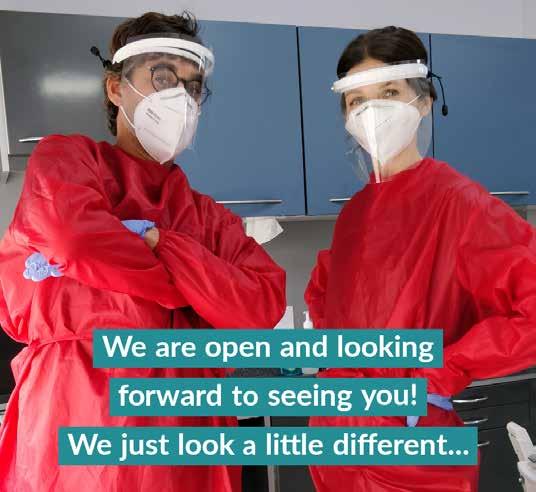
Christina Chatfield, director of Dental Health Spa in Brighton, encourages people to think of a career in an underappreciated profession
) In the current climate of job losses, it’s unusual to hear of a business taking on new staff – especially when that business is recruiting from what may seem unrelated and unlikely sources.
But for Christina Chatfield, who runs Dental Health Spa in Brighton, having passionate people with skills across a range of areas is important to ensure patients get the right sort of care, especially when many find the area of

dental health intimidating.
Recently three of the dental nurses that have trained at her spa moved on to new jobs, which left her with vacancies for apprenticeships.
Christina herself started out in the profession on a Youth Training Scheme in the 1980s and has given opportunities over the years to many people who may not have considered a career in the profession, and was keen to tap into the current available workforce.
“You need to have a calling inside you. It’s a very rewarding career if you have those people skills and I would encourage people to look at it”
“If I advertised on indeed.com I would be inundated,” she said. “I’m so fed up with CV senders who are just wanting a job. As a health profession we are working with people who have all sorts of healthcare needs. I wanted to see people that have real passion and appreciate the opportunity to learn. From dental nursing you can go on to practice management, orthodontics, being a hygienist or therapist.”
Since losing her three nurses she has taken on four apprentices who lost their jobs in very different areas: one from BA, one from a media organisation, one from a travel company and one from retail, all actively wanting a dental career than merely a job to tide them over.
But she explains that it’s important to have the people skills, the ‘soft’ skills. “Most people have the academic ability to learn anything, but you can’t teach those soft skills. You need to have a calling inside you. It’s a very rewarding career if you have those people skills and I would encourage people to look at it.”
While dental nursing is an area that has been dominated by women, more and more men are now coming in at nursing and hygiene levels.
She says the dental apprenticeship scheme is not widely known about. While there are classroom-based courses, much of the training is done on the job and the pay is good – it’s not just an excuse to have cheap labour.
Christina also wants to encourage patients to talk more openly to their dental professionals about their fears. The current restrictions mean many are not having regular checkups so problems are being overlooked – the most obvious being oral cancers. But she says patients should be encouraged to talk about the Covid issue too, explaining that many dental healthcare professionals have been trained in testing and are an underutilised workforce in that respect.
“People should talk about the virus a little bit more. We will never persuade the anti-vaxxers of course, but we should be able to talk quite openly to those who are sitting on the fence a bit. If people are unsure they really can ask their dentists or dental healthcare professional.”
D For more info on Dental Health Spa, visit: www.dentalhealthspa.com
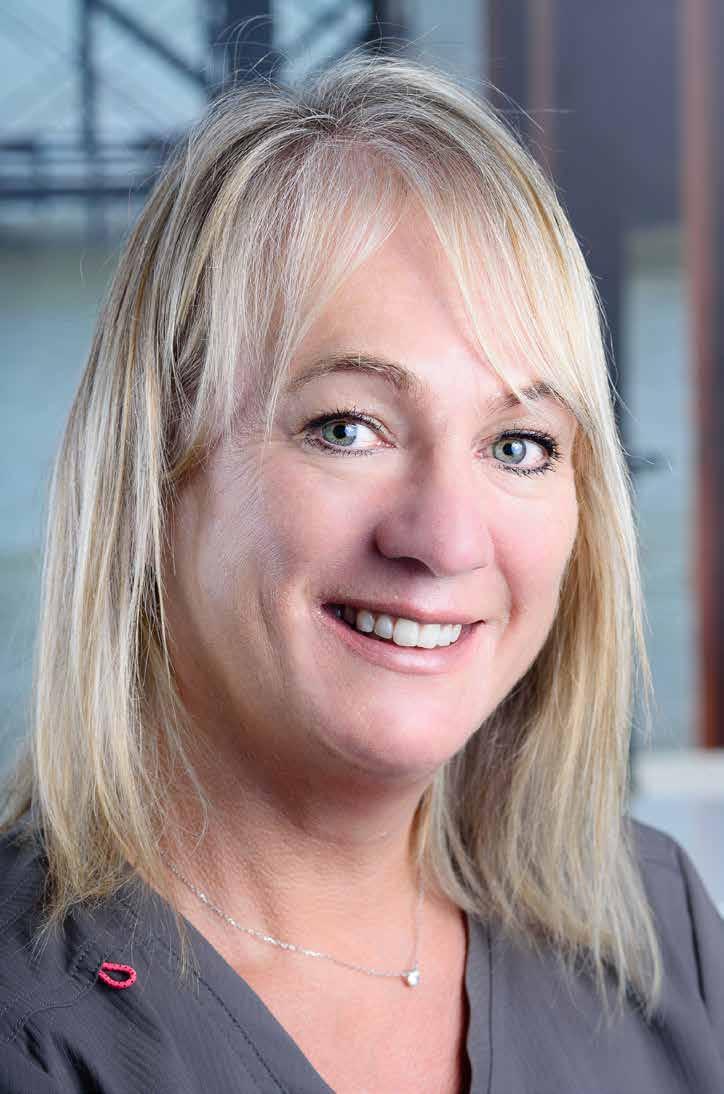
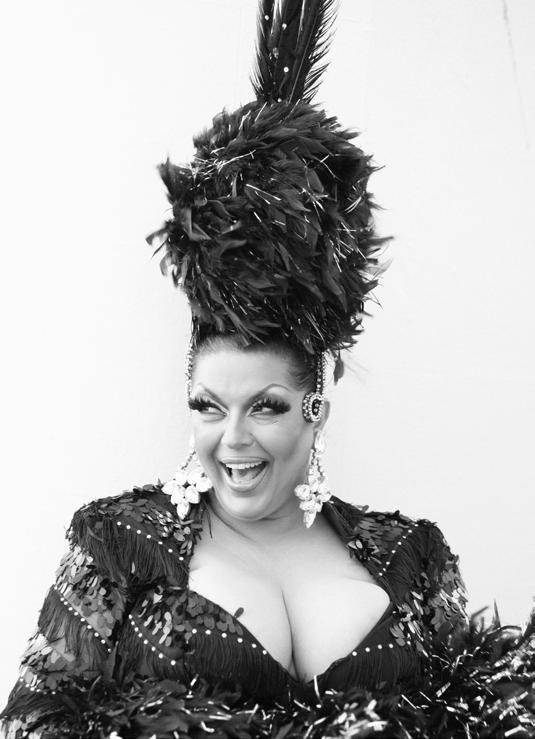
Dolly Rocket on forging a new career in the pandemic
) For the many performers who work across LGBTQ+ venues throughout the UK, the lockdown restrictions have had a particularly pernicious effect, stripping them of their livelihoods and the ability to exercise their creativity in front of their legions of fans.
But some have found other work which allows them to use their particular skill sets in ways they may not otherwise have even imagined.
One such entertainer is Brighton favourite Karen Sharman, aka Dolly Rocket, who found an opportunity dropped into her lap when Olly Carter, founder of LGBTQ+ friendly home help organisation Kingsway Care, asked her to come onboard as a companion for the elderly and isolated people the company works with.
The curvy cabaret diva, who has been on the scene for 40 years, had been despairing of what she might be able to do when the Hanbury supper club, where she is mistress of ceremonies, had to shutter again because of
the pandemic restrictions, despite owner Alex Proud having spent “a fortune” on making the place Covid-safe, including adding mezzanines, a balcony and a filtration system. “Yet I can go into a supermarket and do all sorts of other things where those measures aren’t in place. It’s messing up people’s livelihoods. I don’t see how we’re going to come back from this.
“We don’t know if our clubs are ever going to open up,” says Karen. “I have done this for 40 years – it’s all I do. I am 58 this year and I was considering that I would have my career until I couldn’t do it anymore. I thought, what else can I do? I have a certain skill set, but how do I take that into a job market at my age?”
She has done some online filmed story reading in costume for children, but beyond that there’s been no other avenue for her performance skills. But then: “Olly contacted me and said he’d set up a care company and would I consider coming on as a companion.”
She undertook online training to get her Care Certificate but admits to having had some resistance to the idea of going back into a learning environment. “I have not been in education since I left school. I had undiagnosed dyslexia and I had a real resistance to it because of stuff from school. I’ve not done anything where I had to be tested. It was weird at my age.”
But having that piece of paper means she is now able to use her talents to help others, and she’s finding it rewarding on many levels.
“I’m a companion for elderly and especially LGBTQ+ people. Basically elderly people who are isolated or lonely, so my job will be as a regular companion to go around and chit-chat to people. It’s perfect. I’m a very worldly person, I’ve been on the LGBTQ+ scene for 40 years and I’m LGBTQ+ myself. There are all kinds of people in Brighton; I thought it would be a good fit for me as another career. Also to give back and keep the wolf from the door.
“Olly is also going to do things like helping people get benefits and stuff. He’s set up a wonderful company, new and fresh looking at care in people’s homes.
“Because I am a singer I do sing to some of my clients. I am able to use the skills I have from my work as a performer – whatever is going on in your life you switch to a persona to a certain degree. If I am depressed I can switch into a persona that allows me to be magnanimous etc and that’s quite important. They are transferable skills.
“It’s very important that all sorts of people do the job [of caring], [understanding the needs of] LGBTQ+ people and to know differences. If I was trans man or woman in my later years I would not want to be in my home with someone who was judgemental of my lifestyle.
“It’s really important to be able to support them. I have wigs etc in my home; it’s obvious that my lifestyle is a bit unconventional to some. Olly is very mindful of who he brings in. People with a broad world view, no judgement. It’s not something that’s been addressed and it is essential. I look forward to meeting people in my community that are older I would not normally get to meet.”
Having done the care training, Karen is also able to take care of children and people with disabilities. “It’s serendipity it fell into my lap. I was thinking ‘what am I going to do with the rest of my life?’. This is not dependent on whether I can still sing or look good. It’s something that can run alongside and open up another avenue of work.”
Of lockdown life she says: “It’s been really difficult. People are going to want to get out as soon as they can. I have been lucky enough to have some government grant but I don’t know how people are surviving. People are all thinking ‘what are we going to do?’. We are all in a storm in different vessels – some hanging on to a plank of wood and some in a yacht.”
D www.kingswaycare.com
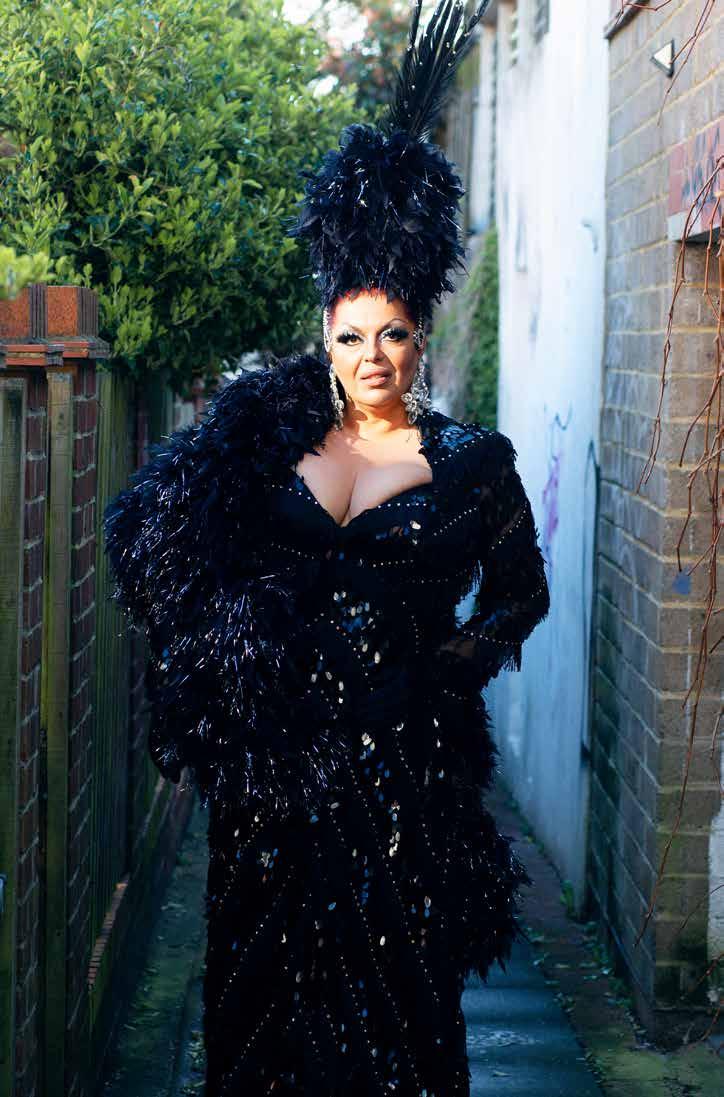
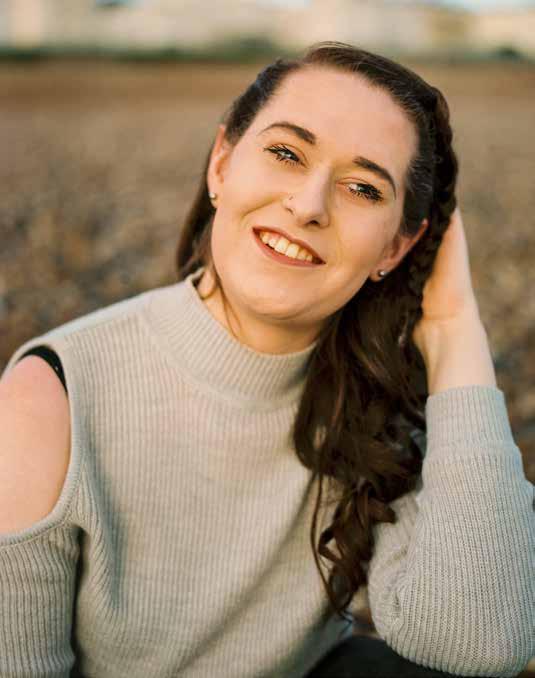
One trans woman’s search for fulfilment in the career of her dreams
) Faye Wheeler fell in love with musical theatre as a child when she saw her first ever show, The Lion King, and now, at the age of 27, she has finally been able to realise her dream of beginning to forge a career in the industry.
But it’s been a tough journey, from attending a mime class in Beckenham as a child, through various theatre schools, to discovering her trans identity and finally graduating from the drama school of her dreams, Mountview, last year.
The path started with BRIT Kids, a class for youngsters wanting to explore their creativity, where Faye was involved in acting, singing and dancing, all of which fuelled her passion.
“When I was in year 11 I decided I wanted to go to the main Brit School full time, training in musical theatre on top of A Level studies. I got in for year 12 and 13 and did a BTEC in musical theatre. From that, because they train you to get into doing BA courses and further ed, everyone was applying to drama school. I got quite a few knockbacks and was seeing friends getting places,” says Faye. She secured a place at a dance school on a three-year course, but halfway
through the year was struggling with her mental health. “I didn’t realise about my trans identity so was presenting as male at the time – another confusing thing in itself.”
This wasn’t helped by the fact that the classes were single sex. “I more related to the girls so found that really hard, being in a room full of testosterone. I felt I needed to drop out just before I finished first year.”
After taking some time out she applied for another university course in musical theatre in Chichester, but dealing with her identity, trying to make new friends and being far from her Croydon home all took a toll and again she had to drop out.
But then things began to look up. “In the summer of 2015 I was working out my identity and found out what transgender meant and that there was a whole community out there. I came out as trans to my family, who were very supportive. Before coming out I had applied to a pop music school (BIMM, the British and Irish Institute of Modern Music) in London to get my vocals more rounded so I could sing any
genre. I hadn’t come out as trans when I got the place but in 2015 just before I was going to go to the school foundation course I changed my name and everything and the college was very supportive. I went there for four years and when I graduated in 2019 it was the first time I felt I had achieved something as myself.
“When I came out as trans I thought that would be it as far as a musical theatre career was concerned as I had never seen a trans person in musical theatre as far as I was aware. I decided I would stick to pop music vocals and see if could make career in that as I thought the industry might be more accepting of trans people.”
But that didn’t feel right for Faye as she missed “performing and being on stage and in character and costume”, so musical theatre beckoned once more and she began again applying to drama schools. “Mountview [in Peckham] had always been my dream. It was the first of my auditions and a week later I found out I had got a place so I cancelled all the other auditions.”
“My huge goal is the West End. I want to raise more awareness around inclusive casting and be a voice for the trans community”
One of the course leaders was an advocate for trans inclusivity and Faye took part in a play with an all-trans cast – And the Rest of Me Floats. “I graduated in 2020. I’m 27 now – it’s been a long road, but I had the most amazing time. I had quite a few breakdowns as it was such an intensive course. I learned so much there.”
And there had been other obstacles to overcome when the pandemic hit. “They announced they would be closing the school at the end of the week and we all went home on the Tuesday thinking we had a few days left with our peers but then they had to fully close because there were a couple of coronavirus cases. That was quite devastating, we had to reset to doing everything online. It was so weird.”
But Faye’s career has now begun. She’s just finished her first payed-for project, a Zoom play tackling transphobia – Lost Phone by JB Pichelski – and there are potential plans for it out of lockdown. It was shown over four nights with an audience of about 50 on each. And at the beginning of March she was cast in a graduate concert at Cadogan Hall, singing Journey to the Past from Anastasia. The event, by Ameena Hamid Productions and The Grad Fest, was to raise money for the charity Acting for Others, and Faye was one of just 40 graduates out of 200 applicants to get a role. It is available to stream from March 29–April 4.
And the future? “My huge goal is the West End. I want to raise more awareness around inclusive casting and be a voice for the trans community.”
Photography by Livia Smith i www.instagram.com/liviamsmith/ i Follow Faye:
www.instagram.com/fayewheeler_/ Faye is represented by YOU Management

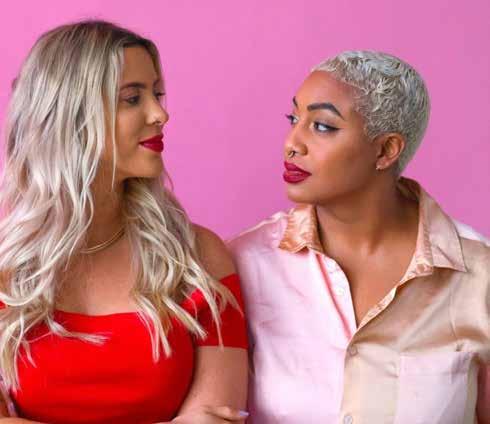
Lucy Sambrook and Toya Satnarine saw 150 diverse members sign up in just a couple of weeks to their inclusive membership platform aimed at revolutionising the media landscape for indie brands and experts. Here they talk about setting up the company and working together as a couple
) What were your previous jobs and how have they impacted on this venture?
Lucy: I trained as a journalist and have written for many publications, including London’s Metro and wellness publication Dose magazine. I’ve also worked in PR for the last few years, and have helped hundreds of people and biz owners get featured in the media – from yoga teachers to restaurant owners to drag queens.
PR agencies are great, but notoriously expensive to hire, and out of the price range of most freelancers and small biz owners. I’ve always wanted to launch a service that would make PR more inclusive and easier for people from all walks of life to access, and share their stories with the media.
Toya: My background is in dance, management and events – I’ve danced on stage and travelled the world touring with artists such as Mariah Carey. I’ve also worked on campaigns with major brands like Malibu, MTV, Nike, Adidas
Were you made redundant as a result of the pandemic?
L: I was made redundant just before the pandemic broke, which was seriously scary at the time! It turned out to be the kick up the bum I needed to go freelance, and then launch my own business though. Sometimes being pushed out of your comfort zone is just what you need.
How did you spot the gap in the market for this enterprise?
L: While working as a freelance PR during the pandemic last summer, I noticed that loads of people were launching amazing new business ventures or going freelance themselves. I was
getting approached by many people looking for help with getting press coverage, but they couldn’t afford my very average day rate, let alone thousands of pounds a month to hire a PR agency.
Me and Toya put our heads together and thought, something isn’t right here. So, we set out to launch PR for the People, an inclusive community supporting all people to get their brand featured in the media. For £25 per month, we teach our members DIY PR skills and how to approach journalists themselves.
We have a Facebook community that journalists can join for free to connect directly with our members for journo requests, quotes and case studies, and we also run monthly workshops with media experts and top journalists.
How did you go about getting the word out? We’ve been building a community on Instagram for around a year now, where we share free PR tips and interviews with journalists about how to get into their publications. We’ve also been doing interviews on podcasts, local radio and blogs to spread the word.
How have you been able to help people through the pandemic?
Working for yourself is so rewarding but it can also be super lonely, and it’s hard to find ways to promote yourself without spending loads of money on ads (especially during lockdown). We’ve had so many lovely messages from people to say thank you for sharing PR tips on our Instagram. Our members also use our Facebook group as a supportive space to network with journalists and other biz owners, which I think has helped through the pandemic.
How do you find working together as a couple?
Entertaining, stressful, fun and motivating all in one go! We’re total opposites in our skills, which does help – Toya is a numbers queen and Lucy is a writing whizz. We’ve found it’s really important to step back at the end of each working day and remember that you’re a couple (not just business partners) and you love each other.
Launching a business, it’s really easy to burn yourself out and work every hour of the day to try to get everything done. We try to put the laptops away at 6pm now and go roller skating or dance around the kitchen cooking dinner to fully relax together.
How LGBTQ+ friendly is the world of PR?
We’ve always found working in PR to be LGBTQ+ friendly on the whole, but the media still has a long way to go with representing diverse voices, which is something we’re hoping to help change. It shouldn’t just be those companies and people with big budgets that get to share their stories with the media. Journalists, newsrooms and editors are also on the whole still mostly white, male and cis-gendered, which is reflected in a lot of the stories shared.
“The media still has a long way to go with representing diverse voices, which is something we’re hoping to help change”
PR for the People provides journalists with a truly diverse (not based on wealth) directory from which to search for experts or interviewees for their articles – we have a huge range of professions signed up from doctors, lawyers, fashion designers, entrepreneurs, musicians, artists and activists. So, if you’re a journalist reading this, please do get in touch to join our community and let us support you in finding more diverse voices for your articles.
How has being members of the LGBTQ+ community yourselves resonated with people who have signed up?
We’ve been inundated with lovely messages from people saying the industry was crying out for something new, and that the community we’re building is amazing, which is so cool!
Many of our members are part of the LGBTQ+ community and reached out to us as a result of us being open about our relationship on Instagram, so I think this has resonated with some people and made them feel comfortable. We wanted PR for the People to be the opposite of what people think of when they think PR – a big corporate faceless company. We have had quite a few members come to us a bit broken from having spent loads of money with a PR agency and not getting the results they’d hoped for. We want people to know that as a solo entrepreneur or small biz owner, you can achieve amazing results by doing your own PR. more info
D www.prforthepeople.co.uk
F www.facebook.com/PRforthePeople
I www.instagram.com/prforpeople
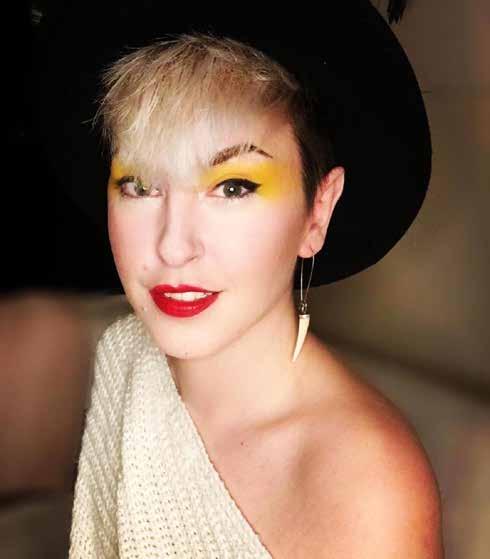
Cabaret’s space lesbian Billie Gold ruminates on the unusual avenues she has explored to make ends meet while the pandemic has put her cabaret performances on hold
) In her own words, Billie Gold has been “doing some weird things to keep going” while clubs and bars across the world remain shuttered thanks to the coronavirus pandemic. Among them was a series of bum prints. In case that’s not self-explanatory, or you’re reading in the American vernacular, they were prints created by her own body parts as a spin on
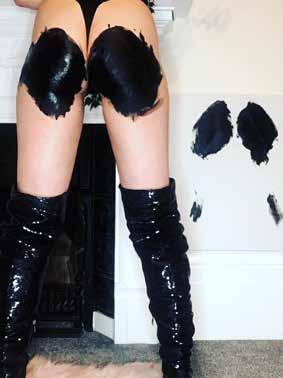
the artwork she carries out alongside her usual performing career. “I didn’t want to do T-shirts or mugs, so I did bum prints, seven of them, all one-offs. They all sold and I ended up with quite a lot of paint on my arse.”
If that was a rear window on Billie’s circumstances, she has also opened up to a more direct gaze. “To keep afloat I’ve been webcamming for the longest time, but it’s not as lucrative as you might think. I have the privilege of having something to sell. It’s like a chat room – really expensive therapy in lingerie. It’s technically sex work and I found it quite interesting to tell people that was what I was doing to do ‘the big shop’, but as a community we are very supportive.
“The day I tell them to take my profile down I will be very happy. When sex work is born out of necessity it’s not a good thing. I am not the best one to say ‘it’s so liberating’ – I didn’t feel that – but it is for some people. You do have to summon a lot of energy and you do have to take care of yourself. When you have to find a way, it’s whatever that way may be.
“You have got to be innovative. We [performers] are all in mourning for our careers and waiting for them to come back. That’s what we are first and foremost. It’s very easy to lose yourself in mourning, you have to find the urge to get
up every day and find another way of making money.
“Some days I have had to choose between sugar and milk. Over lockdown it’s been tough to keep food on the table. I’ve been doing some freelance content writing but that ebbs and flows.”
But while things have been pretty dire for Billie, paradoxically the pandemic that robbed her of her beloved stage career is now providing her with a wage – as a Covid tester.
“It’s lovely to be part of a national effort,” she says. “Seeing it from the inside makes me feel better about what I have put on hold. People are amazing, although the days are really long and difficult. But I am one of the lucky ones.”
And she has nothing but praise for the way in which the testing centres at Brighton university sites she works at are being run. “I am 70% hand sanitiser at the moment. The safety precautions are second to none. I have not seen one positive test yet and we carried out 4,000 tests between the two sites last week.
“It’s super-busy but everyone understands the safety precautions and they roll up their sleeves and get on with it.”
“I didn’t want to do T-shirts or mugs, so I did bum prints, seven of them, all one-offs. They all sold and I ended up with quite a lot of paint on my arse”
The job has also opened up a much-missed avenue of social interaction. “Everyone who works there used to do a different job so we are all sharing our stories about what we used to do. I went eight months without work, eight months of hunting for it. I live alone, so something good about Covid testing is I am around people.”
There have had to be lifestyle changes though –early starts are not generally the domain of the late-night performer, so 6am wake-up calls are something of a novelty, but “the getting up in the morning gets easier and easier, which, as a performer, is unheard of. If you are seen at 6am it’s usually because you are still up. I did have a lie-in till 8am today, which was nice.”
But there is, allegedly, light at the end of the world’s longest-ever tunnel, and with that in mind Billie’s spirits are raised even further. Potential gigs are slated as early as June 17, with the return of Billie’s weekly femme Lipstick night at the Queens Arms, and she is “going to make sure it’s a massive show”.
And on a final note, Billie says: “I am proud of myself for hustling my way through it all. I hope it will feel like a bad dream in a few months. If I never hear the words lockdown or sanitiser again I’ll be happy. I just want to get my arse back on stage.”
So whoever snapped up those bum prints made a great call.
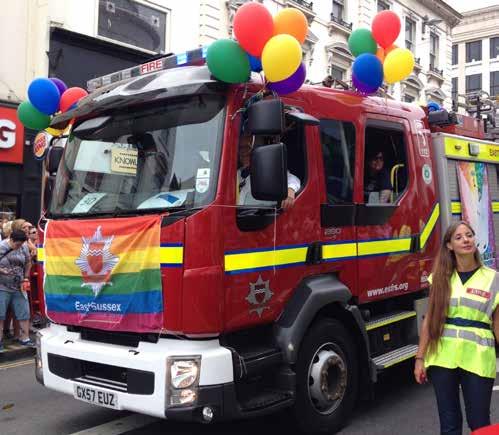
East Sussex Fire & Rescue Service (ESFR) is gearing up for a recruitment campaign in which it is actively encouraging applicants from diverse backgrounds, including LGBTQ+ communities. Jaq Bayles spoke to two women whose stories inspire
) The Fire Brigade Union has had a national LGBT Support Group since 1994, and its chair and one of the founding members is Yannick Dubois, ESFR station manager – business safety (based in Hove), who has seen many changes and improvements in inclusivity over the years.
Indeed, when she joined the service it wasn’t especially welcoming to women, LGB or people of colour – of the 30 people on her training course in Buckinghamshire she was the only woman.
“There were just a few lesbian and gay people
who met in pubs to see if there were other people like us in the service,” she recalls. “At the time there were a lot of issues, LGB people were going through hell. It was the ‘90s and equality and diversity were not the best.”
It took around six years for Yannick to come out: “I needed to meet with other women, other gays and lesbians, and eventually we formed a group that became part of the structure of the service.”
But while there are plenty of ‘out’ women across the service as a whole, the pattern is
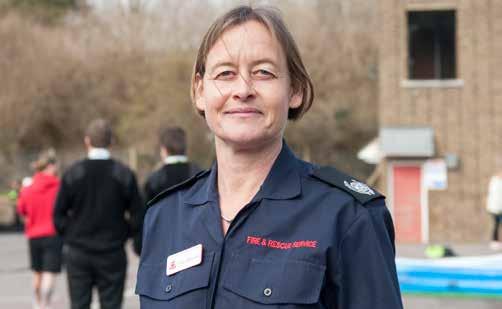
not repeated when it comes to men. Yannick knows of only one gay man who is out in the whole of the Sussex service, but struggles to pinpoint why that may be, given that the environment has become a lot more inclusive and there are work courses aimed at educating around diversity.
Colleague Jules King, assistant director –Safer Communities, and chair of Women in the Fire Service UK, says she would be “astounded if there were not more gay men in our workforce”, and adds: “There’s something that’s preventing some of my male colleagues feeling it’s not safe for them to feel their whole selves at work. Is it like football or rugby, where there are not many openly gay men? It’s a fantastically supportive environment where I can be wholly myself, I’ve been open about my sexuality and I’m comfortable with it.
“My dad told me to stay in bed as long as possible because you get shorter during the day, and to wear a couple of pairs of socks. I just made it”
“It’s OK to be different and celebrate diversity. I bring different elements to the work – being more diverse I have different experiences. Just by being myself I have different life experiences, my family is different, I have adopted children, my daughter has special education needs. My colleagues will have different experiences from me. We can look from different perspectives and there’s always more than one way to serve.”
Like Yannick, Jules has noted many changes in the service since she joined in 1994, although there were a full three women on her training course. She came to the job after stumbling across an ad for East Sussex Fire Brigade, which went on to say words to the effect that it “particularly welcomed applications from women and black and minority ethnics”.
“I remember thinking I didn’t know women could be firefighters. I showed the ad to a good friend who said: ‘Jules, you can do that’. I told my mum and she said: ‘you can’t do that dangerous job’.”
Back then there were other obstacles to joining the fire service too: “You had to be
between 5ft 6in and 6ft 3in.” Only just at the lower end of the scale, Jules wasn’t sure she’d make it. On the day it came to being measured: “My dad told me to stay in bed as long as possible because you get shorter during the day, and to wear a couple of pairs of socks. I just made it.” Applicants also had to be under 30, but now anyone over 18 can apply.
Both women obviously love their work, and are at pains to point out that it’s not all about running into burning buildings – in fact, it’s far less about that anymore, thanks to all the education and inspection work that goes on.
As an inspecting officer, Yannick looks after fire safety measures in hotels, care homes, pubs, “every single commercial building”. Similarly, Jules points out that she is “responsible for all the prevention, protection and response activities. Looking after the business safety, also prevention, which is community safety”, adding: “We want to stop the emergencies from happening in the first place. We want to help people learn and educate them.”
Yannick adds: “It’s an amazing career, you work for the community, you’re part of a team, it’s very diverse in terms of what you are doing, you never know what that’ll be from one day to the next – fire, a road traffic accident, flooding, helping an elderly person. It gives you a great sense of pride and community spirit.
“I love my career and how we have progressed in terms of diversity. We are at Pride every year now in the parade. In the beginning we used to go around all the Prides in the country to just show the community that we are supportive, engaged and very much welcome LGBTQ+ people. We are changing all the time for the better.”
And she is particularly proud of the LGBT Support Group having won first place in the Fire and Rescue Service Equality and Diversity Awards, presented by the Department for Communities and Local Government (DCLG), in 2008.
While anyone working as a firefighter needs to be prepared to face some tough scenes and scary moments, these are offset by more heart-warming moments.
Jules says: “Most significantly when the bells
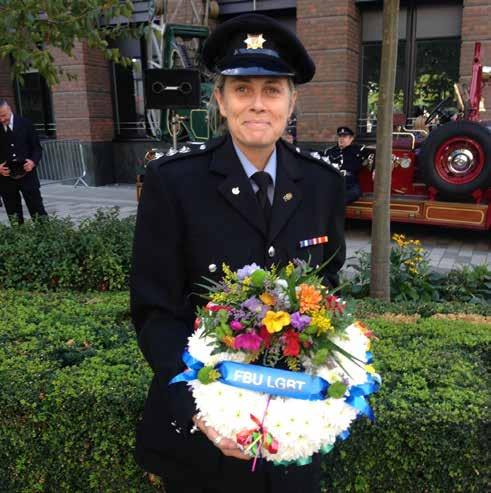
go and there’s an emergency response and you go and make someone’s most hideous of days that little bit better, with the ability to bring some peace.
“Some of the uplifting events are more about the little things. You turn up to an incident and someone’s lost something but you’ve been able to go back into the house and salvage some of their treasured possessions.”
On the downside, she recalls “being the first officer attending incident where a double decker animal transporter had tipped on its side just outside Ringmer. There were 33 pregnant cattle and only two survived. The human tragedy you may go to is devastating but there’s something about animals, I think because they are so helpless.”
Yannick’s first call was to a stable fire. “That was quite difficult and always stuck in my mind. It was the first time I was faced with death and they were horses. That’s the sort of thing you have to be prepared for.
“I have had times when I have been scared – where suddenly you feel flames all around you.” But on a lighter note, she has rescued horses stuck in mud, dogs from a house fire, and extracted people safely from mangled cars in traffic accidents.
All these things make up the varied fabric of fire services life, and underpinning it all is the sense of family. “We have a very good wellbeing structure to look after each other. Within the watch you spend so much time together night and day, and we all know each other very well. It’s a bit of family structure, we all know each other’s other half, that’s
why it’s so important to be out at work because we do spend a lot of time together.”
) To find out more and apply to become a full-time firefighter in the upcoming recruitment drive, visit: www.esfrs.org.
East Sussex Fire & Rescue Service statement on inclusivity
East Sussex Fire and Rescue Service is here to keep our communities safer – whether responding to emergencies, working to prevent them happening in the first place or providing support, our firefighters, officers, control room operators, business and community safety teams, support staff and volunteers all play their part. In order to improve the way we deliver services to our communities, we need to ensure we have a service that is reflective of the community it serves.
We value diversity and recognise that different people bring different experiences, ideas, knowledge, and culture, and that this difference brings great strength. We want our workforce to be more reflective of society at all levels in the organisation. Having a range of perspectives, cultures and experiences brings a greater understanding to our organisation, which contributes to decision making.
We are therefore actively encouraging applicants from diverse backgrounds to consider a career as a firefighter, find out more about our applications process and apply to become a wholetime firefighter in our upcoming recruitment drive.
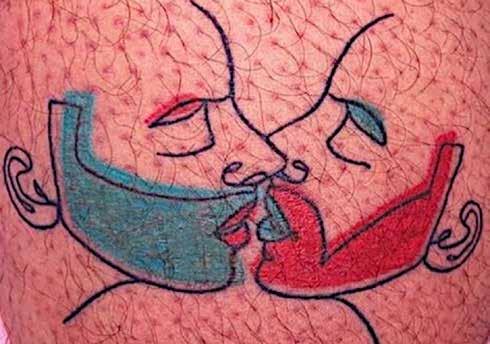
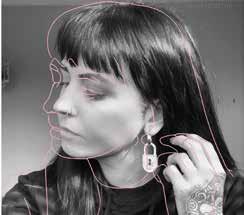
correlation to my sexuality. Tattooing just then became a professional outlet for my art.”
Rachel Badham looks into whether LGBTQ+ people are more likely to get body modifications
) After getting my first facial piercing nearly two years ago, I went home to show my housemates, the majority of whom identified as LGBTQ+. One of the first comments I got from them was ‘having a septum ring definitely makes you look more gay’. I heard a similar remark last year when I was in a bar with friends with my large thigh tattoo on display. Long story short, a man quickly gave up flirting with me when an outlooker pointed out to him: “She has a thigh tattoo, she’s obviously gay”. While that definitely cracked me up, it made me consider why body modifications seem to be so heavily attached to the LGBTQ+ community - is it just a stereotype, or do queer people really have a greater affinity to tattoos, piercings and all things body modification?
While others had stereotyped me in for my body modifications, I have made similar assumptions about others. If I see someone with brightly coloured hair, heavy tattooing or multiple piercings, I often think they are more likely to be part of the LGBTQ+ community. When researching this phenomenon, there’s actually very little concrete evidence to suggest LGBTQ+ people are more likely to get body modifications. There’s a fair amount of work on the disparities between men and women in terms of modifications, but much less solid research on the differences between the LGBTQ+ community and their cis-het counterparts. However, there are a lot of interesting theories on the topic.
Queer tattoo artist Jj Motto shared her thoughts on the importance of body modifications to LGBTQ+ people: “I have been getting tattooed and body modifications since I was teenager. I used it as a form of self-expression that would go on to change many times but always something I wanted and I chose to have done. I may not have been in control of my feelings as a teen with regards to being gay but I was in control regarding the art I liked, the fashion I followed and the tattoos I got. Tattoos and body modification are an act of freedom, the ultimate form of self expression and even an act of defiance in some societies.”
Creating a safe space for LGBTQ+ clients is paramount to Jj, who believes it’s important for customers feel comfortable in the studio: “Knowing the artist is part of your community creates a safer and more relaxed environment which results in a better experience for both the artist and customer.” For many LGBTQ+ people such as Jj and her clients, body modifications bring a sense of control, freedom and many are even inking their inspirations on to their bodies to remind them to embrace their sexuality or gender identity.
“Body modifications have the potential to reflect your personal narrative; they can create a new understanding of a body which may have been through trauma”
I later came across a Q&A website which affirmed this theory. A handful of people were discussing the link between LGBTQ+ identity and tattoos, one person suggested that LGBTQ+ may be more open to modifying themselves, saying: “They already know they face social condemnation for a fundamental part of their identity”. Another made an interesting point about how tattoos provide an opportunity for people to reclaim their bodies, which is particularly important for many LGBTQ+ people who often have their bodies policed or criticised.
While stigma around LGBTQ+ bodies continues to be prevalent in modern society, modifications allow for people to claim autonomy over themselves and create their own version of beauty.
Body modifications have the potential to reflect your personal narrative; they can create a new understanding of a body which may have been through trauma – an experience all too common in the LGBTQ+ community. LGBTQ+ culture also has a history of inspiring body modification, with Jj saying that her identity inspires much of her artwork: “Although it didn’t inspire me to become a tattoo artist per se, the art I was making, whether painting, print-making or mixed media pieces, almost always had a
An increasing number of people are getting LGBTQ+ Pride-themed tattoos, with a handful of these people telling Buzzfeed about the stories behind their body art. One person said their rainbow-adorned arm was a “symbol to accept myself in all aspects of my life and I am proud of who I am”. Another said their Pride themed tattoo was a mode of “proudly expressing” themselves after being continuously judged for their identity. Jj, who now owns the Studio & I clothing store and tattoo studio in York, and is known for tattooing queer icons such as Lady Gaga, Prince and David Bowie on her clients, says: “LGBTQ+ icons play a real important part in our lives and can help many overcome hurdles through their art, views and ongoing
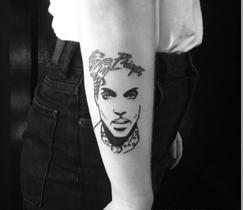
fight for equal rights. This is the reason why many of my clients choose to have their idol permanently inked into their skin; an admiration and a respect for someone who has supported them being out, loud and proud.”
Due to the overall lack of research, it’s not clear if there is a greater proportion of LGBTQ+ people with body modifications, however it does seem apparent that they hold a certain importance for the queer community. To me, my tattoos in particular hold an importance to my identity; while my thigh tattoo may make me look more stereotypically gay to others, my inked wolf is my symbol of resilience after years of struggling with my mental health and trying to terms with my sexuality. So while no one can say for sure if statistically, more people in the LGBTQ+ community have body modifications than our cis-het counterparts, what is certain is that tattoos, piercings and all things modification are a symbol of our pride, strength and individuality.
We Asked People To Share The Stories Behind Their Pride Tattoos - Sarah Karlan for Buzzfeed, May 31, 2015

Brighton blogger Artie Carden talks to Rachel Badham about being an LGBTQ+ disabled person in the creative industry
) Since the coronavirus pandemic began, Brighton YouTube creator, blogger, writer and actor Artie Carden has been shielding at home, but that hasn’t stopped them from delivering weekly content about life as a LGBTQ+, chronically ill and disabled person with a love for literature and the arts. The bisexual, non-binary creative grew up in Hove, and has been making YouTube videos for around a decade: “When I was growing up, YouTube had just started, but I didn’t see myself in any mainstream creators. But for me, it didn’t start because of my identity, it was just something I enjoyed doing.”
Having trained in the performing arts for 12 years and featuring in a handful of music videos and short films, Artie decided to refocus their energy on writing, and now dedicates much of their time to their channel and blog. While being a creator allows Artie to discuss their identity freely, it’s not without its problems, as cyber-bullying is becoming increasingly prevalent: “There’s a lot more online hate at the moment – people are bored in lockdown. I’ve been called a cockroach online, I occasionally get TERFs on my Harry Potter critique videos.”
“My disabilities are invisible, which pushes me out of some disabled communities. There’s a lot of gatekeeping in the disabled community and I usually don’t meet those standards”
So in what seems to be an increasingly hostile internet environment, why is it that many LGBTQ+, disabled people decide to pursue blogging and vlogging? For Artie, being online
provides a sense of community, particularly during the pandemic: “There’s quite a big community of disabled creators online. A lot of us can’t leave the house so we find our community on the internet – there’s loads of us, but people still don’t think we exist.” They also hope that their videos, particularly those discussing life with chronic illness, will reach someone who needs them.
Being a creator also provides Artie with an autonomy that they feel LGBTQ+ people are lacking in creative industries such as the theatre: “There’s this idea that the film and theatre industry is accepting – I never felt this when I was studying drama. LGBTQ+ people cannot get their foot in the door 99% of time, and in the world of TV, film and theatre, queer people just aren’t well represented.” Artie says they “missed out on the queer scene of Brighton” growing up, adding: “Going to Pride is difficult – it’s very centred around cis people. And it’s still not accessible for disabled people.”
As a result, the online LGBTQ+ community has become pivotal to people like Artie. Some content creators have amassed great wealth from their content, however, like many creative pursuits, a certain degree of unpaid labour is usually required to begin with.
Speaking from experience, Artie has found unpaid labour is a big issue for creators, actors and writers: “Particularly as an actor and writer, I’ve been told I should want to do work for free for exposure, but I’m at a point where I don’t do things for free very often, because it takes a lot of energy. And LGBTQ+ and disabled people deserve more support, which includes money – our communities are
disproportionately affected by poverty.”
They continue: “With my own channel and blog, I don’t mind working for free because it’s all under my control, I can discuss anything I want to, but if I’m writing or working for someone else, I deserve to be paid for my labour. Big publications are the worst for it –we know they have the money, so why aren’t they paying people?” So, it seems while the creative industry has the potential to provide a space for LGBTQ+ and disabled people, there’s still a long way to go, particularly for smaller, freelance workers.
Living with disabilities and chronic illness has also presented a unique challenge to Artie as a creator and blogger; they say filming takes a lot of energy, and while online creative work is more accessible than a 9-5 job, it doesn’t provide the same stability. In addition, there is still a lot of stigma surrounding disabilities online, with Artie noticing that disabled people are often viewed in polarising ways: “When it comes to online discourse surrounding disabilities, either you’re not disabled enough, or you can’t do anything at all.”
Although Artie says they have learnt to be unapologetic about their existence, they are sometimes ostracised online even within disabled communities: “My disabilities are invisible, which pushes me out of some disabled communities. There’s a lot of gatekeeping in the disabled community and I usually don’t meet those standards.” However, they also found there are many accepting corners of the internet, such as the weekly Sick Sad Girl group meetings they attend, where Artie ‘feels like they’ve found their people’.
Having shielded throughout the entire pandemic due to chronic illness, Artie found the situation took a toll on their mental health. However, reading, writing and filming provided a creative outlet for them. While the pandemic has limited many people’s work, particularly in creative industries, Artie discusses their plans for the future of blog and YouTube channel: “There’s a lot of things I’d like to do but the pandemic is getting in the way a bit. I’ve got some things I’d like to do about chronic illness, and some analysis’ of shows and books.” In the meantime, they’re continuing to post regularly to both platforms, speaking out about the realities of being a disabled, LGBTQ+ creator.
“Going to Pride is difficult – it’s very centred around cis people. And it’s still not accessible for disabled people”
Despite the challenges which come with being a creator, and a member of the LGBTQ+ and disabled community, Artie says that they are proud of the content they put out into the world. And even in the hostile online climate, they’re continuing to call out ableism, injustices, and spread some queer joy in a time when we need it more than ever.
D Artie’s blog: www.artiecarden.com
D YouTube: www.youtube.com/ArtieCarden
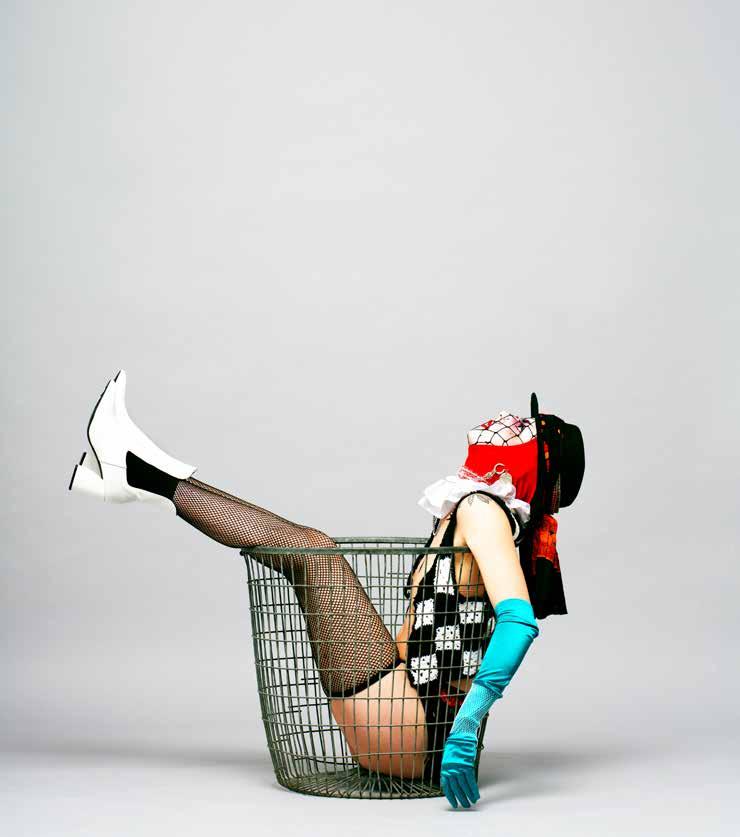
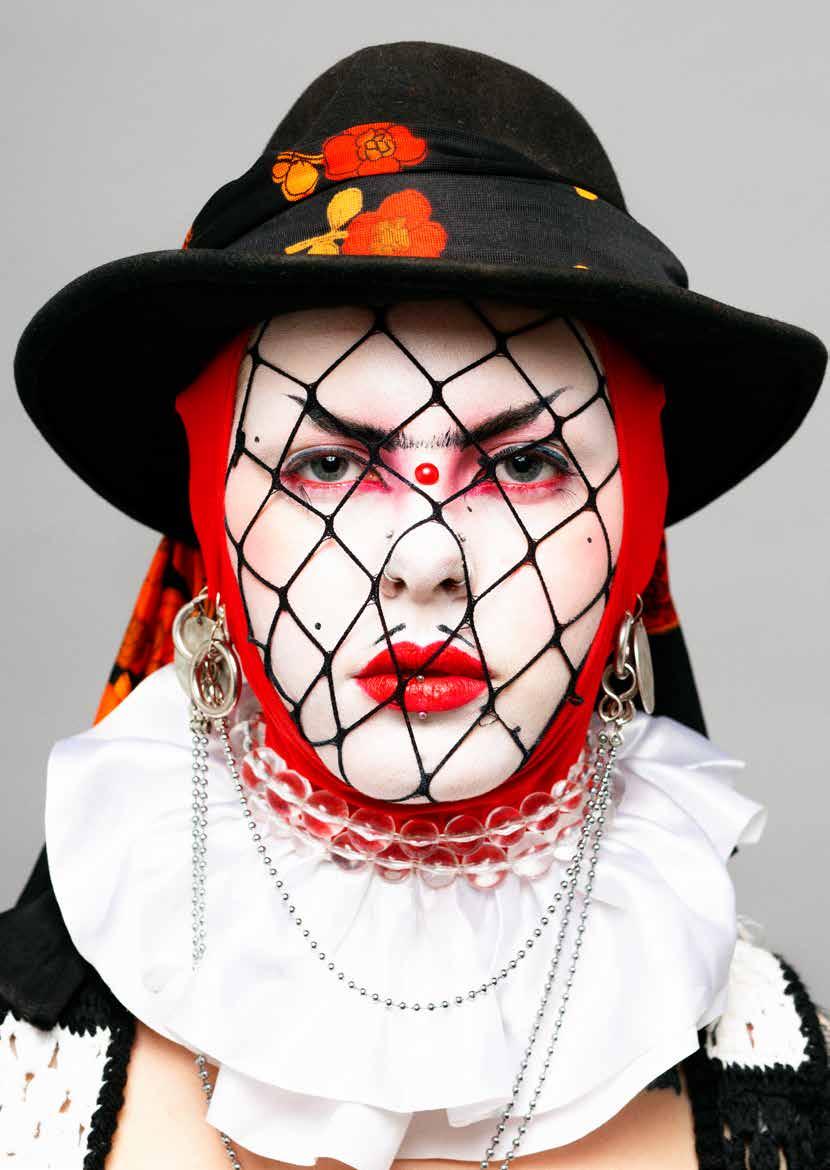
I AM WHAT I AM, THEY ARE WHAT THEY ARE
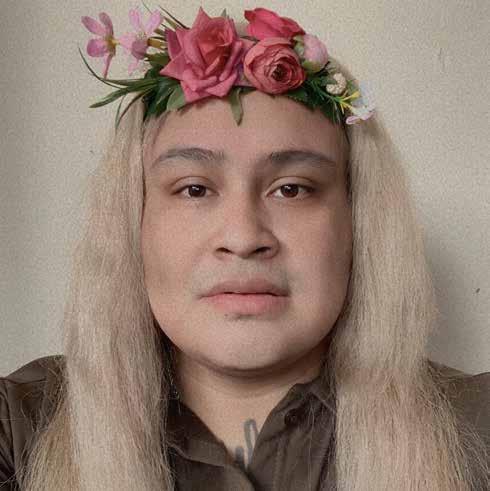
By
Peter Markham,
a
correspondent
with www.immigrationnews.co.uk and IAS, a group of lawyers which represents asylum seekers around the world.
) Positive, uplifting experiences have been difficult to come by over the past year or so but my meeting with Arthur Britney Joestar is right up there.
Arthur Britney, 29, was an asylum seeker from El Salvador who made history late last year. In a world first, they won an appeal to remain in the UK related to their non-binary identity.
What’s quite clear from talking to Arthur Britney is that there had been a great big Britney longing to get out of them way before they arrived in the UK three years ago.
El Salvador has an appalling record when it comes to those who have minority sexual orientations or gender identity issues.
Arthur Britney had known they were different from a very young age. In a macho society like El Salvador, identifying as non-binary was a bit of a non-starter and so back then they identified as gay.
The consequences of daring to publicly express their real self even in a minor way were horrific. First, they were severely beaten up by passing policemen simply for having bleached hair.
A 15-minute walk to work along San Salvador’s bustling boulevards became a daily traumatic ritual, with constant name-calling from complete strangers who threw bags of urine and rubbish at them.
There was only one thing for it. They had to get out of El Salvador. Seeking asylum in the UK seemed a good call because their online research showed it was a country which would help those
in their position. Tell Home Secretary Priti Patel that and one can imagine her rage.
They were housed in Liverpool while their claim was processed. An eight-hour interview followed with immigration officials and it was then that the grim reality began to hit home.
“I want to be really honest. At the beginning I wanted to believe that the Home Office was on my side, that they wanted to protect me. The truth is what they really wanted to do was get me out of the country.
“They skipped over the real issue, which was the persecution I suffered and the evidence I was able to provide,” they told me. “I felt they didn’t take me seriously and they didn’t manage the evidence properly.”
Arthur Britney wanted to find a job but their status as an asylum seeker prevented them from doing this. Indefatigable, they gave up their time to work free of charge for the Many Hands One Heart charity, which helps LGBTQ+ asylum seekers. They built up a massive support network and learned English along the way.
However, there was a huge setback. Their application to remain in the UK was rejected twice, and in double quick time.
“It broke me slowly. It was a slow torture,” they explained. “I had suicidal thoughts. I’m not ashamed to say that. At one point I said to myself that I’d prefer to die in the UK with dignity rather than go back to El Salvador and risk being tortured or killed.”
The saying goes that you make your own luck
– never more true than for Arthur Britney. They were offered counselling by Many Hands One Heart to help them get through their asylum ordeal. The counsellor happened to be an expert in gender expression.
As the therapy sessions wore on, Arthur Britney realised that they were non-binary and, until then, had just never had the strength or opportunity to be fully open about it.
With the help of a determined lawyer, Kristian Wood of IAS, their case was reopened. By now Arthur Britney’s new non-binary identity was at full throttle. Their Britney persona was flying and they’d become an activist, even rubbing shoulders with Prince Harry at a conference in London.
More Arthur Britney luck came to the rescue. The eyes of their team lit up when they saw it was Judge Bruce who’d be hearing their appeal. She criticised previous decisions that the police attack against Arthur Britney had not been persecution.
“I want to be really honest. At the beginning I wanted to believe that the Home Office were on my side, that they wanted to protect me. The truth is what they really wanted to do was get me out of the country”
“It was a physical assault, by the police, motivated by nothing other than homophobia,” Judge Bruce said. “Five minutes is a long time to be beaten. I do not doubt that it was for the appellant a terrifying experience.
“Having had regard to the country background evidence,” she concluded, “and the evidence personally relating to the appellant, it follows that the appeal must be allowed.” Judge Bruce also flagged up that previous hearings had been wrong to use the pronoun ‘he’ when referring to the applicant.
“The way the judge handled the case: she just understood me, all the tiny details. She saw the whole picture,” Arthur Britney said afterwards. “At the end, she turned to look at me and started speaking to me in Spanish, to tell me she granted me the right to stay in this country and the right to be who I want to be. I just started to cry. I felt like I was born again.”
The very next day, Arthur Britney was offered and accepted a paid job.
In a nod to songs sung by countless drag queens, when it comes to Arthur Britney they are what they are, this is their life and, may I say not in a shy way, they did it their way.
Arthur Britney, your very presence makes the world a better place: Home Office, take note. Vive la difference! Now I’m off to write the screenplay before someone else beats me to it.
Read a longer version of this article on the Scene website – www.scenemag.co.uk. Find out what happened when Arthur Britney came face to face with their idol Britney Spears!
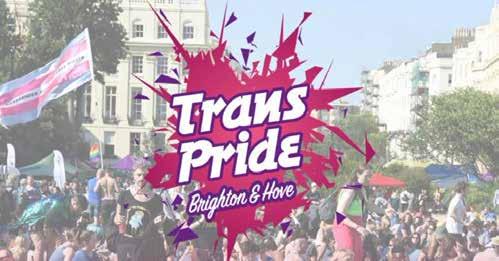
Sarah Savage, chair of Trans Pride Brighton & Hove, reflects on last year’s online event and updates us on what’s to come
) With all of the uncertainty surrounding holding public events this summer, I think it’s best to be as transparent as possible about our plans for this year’s Trans Pride Brighton & Hove (TPBH). The safety of all the wonderful people who’ve supported our event over the years is at the forefront of our minds when making decisions.
TPBH will decide whether to go ahead with an in-person event by April 10, 2021 and will communicate this on our social media channels – f @TransPrideBrighton t @ TPrideBrighton. If we have to postpone the inperson event, we will host a Trans Pride Online event on Saturday, July 17, 2021.
I have to be honest and say that even after reading the latest government advice, the likelihood of us being able to hold an inperson event has not improved. We would not recommend rushing out to book travel and accommodation at this point. The risk that we may be forced into a last minute cancellation does not appear to have diminished, but we remain open-minded and will make a final decision by April 10.
Let me introduce myself, my name is Sarah Savage, my pronouns are she/her and I have been the chair of TPBH for the last 18 months. I was a member of the first ever TPBH committee back in 2013 and have headed up the protest march team ever since. I am thankful and very aware of all the work that dozens of previous volunteers have put into building our charity. I want to continue that work by staying true to our ethos of grassroots community organising and also improve the sustainability of the charity.
It goes without saying that the Covid-19affected Trans Pride Brighton Online 2020 was unlike any event we have held before. I’m really proud of how the small team of volunteers dealt with the challenges that this brought. I loved how online communities reacted to our trans celebration.
Last year’s event was not problem free, however. The feedback survey has again highlighted issues with how TPBH interacts with people who have disabilities. The Trans Pride Online stream was beset by problems with subtitles and with the audio. We would like to apologise for this
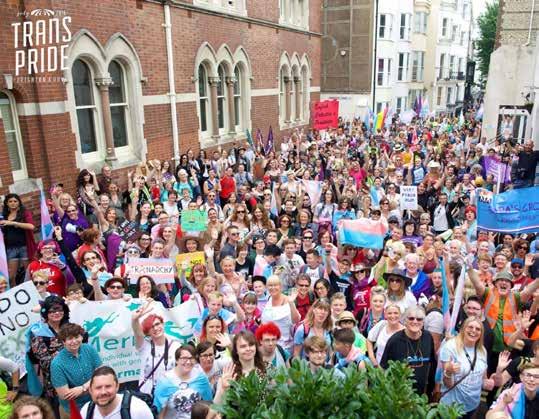
and commit to doing better in future. This is an issue that keeps coming up, that despite our best efforts we still fall short of being supportive to those who are most disadvantaged among our community.
Members of the QTIPoC community have also raised valid concerns about how representative the structure of TPBH is and how the charity could do more to authentically represent our diverse community. We also would like to apologise for this and are thankful that we can have these conversations, but yet again this is a problem that has happened before. We can’t let this continue and it is obvious that something major within the structure of TPBH needs to change.
“I believe that Trans Pride Brighton belongs to the community and whether we have an in-person or an online event in 2021, the future of our charity is looking bright”
If TPBH doesn’t have the trust of all members of our community, we will never have a truly successful event. It is clear that the structure of the charity must change and respond to the growth we have seen over the years.
In response we have applied for and won a grant from Comic Relief’s LGBTQ+ Covid-19 Recovery Fund, in partnership with METRO Charity and NAZ. The project this funds will allow us to bring in expert advice from equality specialists, taking the workload off the community volunteers’ shoulders. In the coming weeks we will be inviting local organisations to tender for this process to carry out an Equality Impact Assessment and write bespoke policies which will guide TPBH’s actions in the future.
The second part of this project is all about adding capacity and resilience to the committee. For the first time in our history we are able to pay trans and non-binary people to organise TPBH. We have been able to create two new positions, a project manager and a community manager, who will work for two days a week for six months. This is really exciting and opens up a whole host of opportunities for the future of TPBH.
At all stages we intend to listen to every individual and community who attend TPBH each summer, there will be opportunities for consultation and feedback whenever possible. We will soon be starting a series of steering committees, inviting people to take part in shaping the future of our community event.
I believe that TPBH belongs to the community and whether we have an in-person or an online event in 2021, the future of our charity is looking bright.
D For more info on TPBH, visit: www.transpridebrighton.org f @TransPrideBrighton t @TPrideBrighton
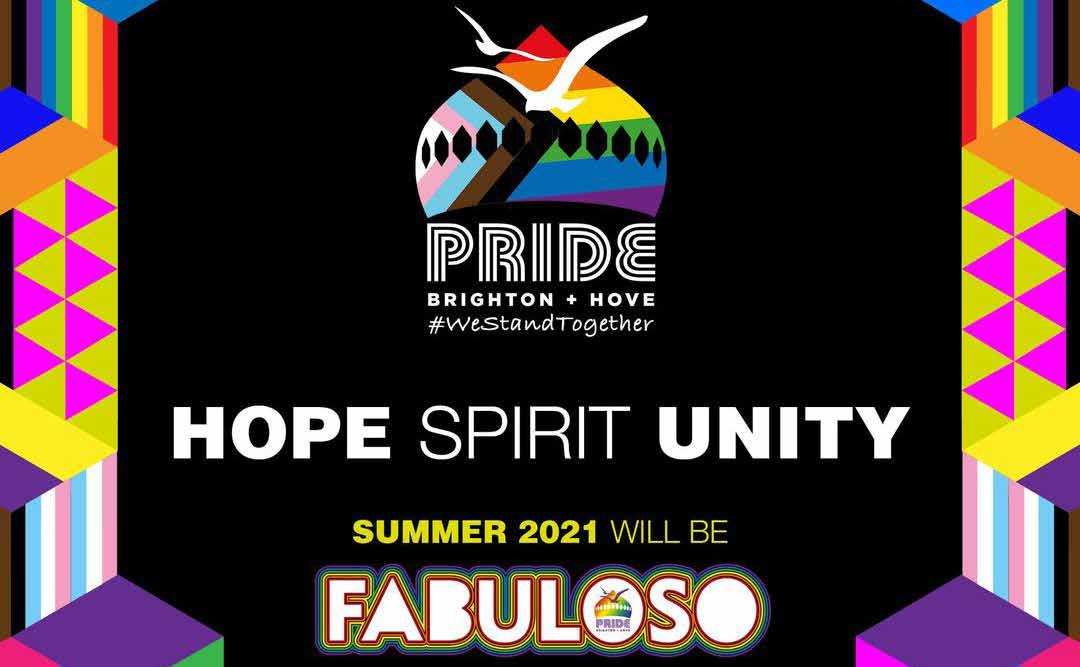
With Brighton & Hove Pride confirmed for August 6-8, 2021, the organisers respond to some questions about the event put by Scene magazine
) Brighton & Hove Pride organisers outline how they are responding to the needs of all members of the LGBTQ+ community.
How can Pride use its platform to challenge the rise in extremist narratives and hate incidents, and ensure that the promotion of Pride is also a promotion of inclusion and support for targeted intersectional
LGBTQ+ communities, such as trans, people of colour (PoC), queer, younger people etc?
We are 100% committed to supporting all members of the LGBTQ+ community, both at our official Pride events as well as in their day to day lives. 2019 was the first time we have used the lampposts for an awareness campaign across the city to make people

aware of Pride’s Hate Crime campaign and it gave great visibility and education to visitors as well as residents around why Pride is still necessary and the significant and real challenges that some members of our communities still experience on a daily basis.
Going forward our campaigns across the city and social media will continue to develop these messages and themes to highlight marginalised communities and directly support these groups with resources and through fundraising.
How will Pride promote and profile QTIPoC and BAME LGBTQ voices and communities?
An essential part of Pride is listening to and supporting all members of the LGBTQ+ community and, as the Black Lives Matter movement showed us, it is still very common for marginalised sections of our community to feel they are not being heard.
“An essential part of Pride is listening to and supporting all members of the LGBTQ+ community and, as the BLM movement showed us, it is still very common for marginalised sections of our community to feel they are not being heard”
In 2018 we introduced the Pride Cultural Development Fund to promote creative/ professional development, international exchange and showcase opportunities. To date over 180 creatives have been involved; a very high proportion identify as QTIPoC or present culturally diverse narratives. Among the various strands, the Pride Cultural Development Programme (PCDP) has so far offered:
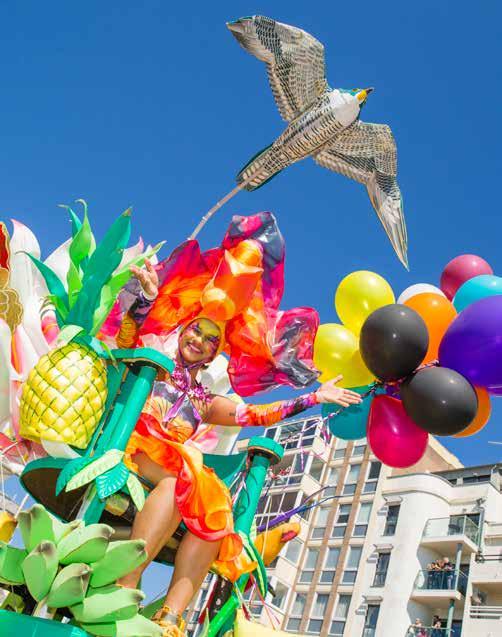
Small grants to individual artists, creative collectives and community groups to help cover project costs – costumes, instruments, artist fees and venue hire for performance, rehearsal or studio space etc.
The grant awardees included a series of portraits entitled Hijras of India produced by Bharat Patel, a BSL-signed reading of Shanni Collins‘ children’s book of rhymes exploring LGBTQ+, disability, illness, fostering, adoption, gender, ethnicity and culture to promote love, understanding and respect to children aged 3-10, and other funded activities including a Trans Literary Salon, a theatre performance and a radio show.
A PoC artist was commissioned to create a new mural for the exterior wall of the Marlborough Pub – artwork that was a special feature of the Trans Pride and Pride seasons in 2018 and 2019.
In partnership with Socially Engaged Art Salon (SEAS), Pride presented Colour My World (CMW), one of the biggest and most diverse exhibitions of LGBTQ+ narratives ever seen in the city featuring creative contributions from over 60 artists, filmmakers and activists from the UK, Europe, Middle East, Africa, Asia and the Americas. The fully
accessible BMECP Centre (Black & Minority Ethnic Community Partnership) hosted a satellite CMW exhibition featuring the work of artists invited to participate via an international open call.
CMW also had a two-week tenure at Jubilee Library featuring eight guest professional artists – seven of whom identified as QTIPoC and the work of the eighth artist featured the QTIPoC community as the subject matter. The art was seen by the many thousands of visitors every day.
BMECP also provided the venue for the Pride in Our Community open day hosted by QTIPoC drag act Son of a Tutu, which featured a mixed programme of pop-up activities that attracted a high volume of diverse visitors – many of whom had never engaged with Pride previously.
The partnership with SEAS/BMECP continued in 2019 with Pride’s support for the Riot! exhibition celebrating the 50th anniversary of the Stonewall Riots. The work of local and international artists was exhibited over two floors of the building alongside a supplementary programme of QTIPoC-led workshops, talks, screenings, performances and creative interventions.
2017.
“Going forward our campaigns across the city and social media will continue [...] to highlight marginalised communities and directly support these groups with resources and through fundraising”
Jubilee Library hosted three separate PCDP exhibitions throughout the July/August 2019 Pride season featuring QTIPoC artists and/or subjects – Stonewall Solidarity, Queer Letters and neXus. The latter was also featured at Vrystaat Arts Festival Fringe in South Africa and presented the contributing artists with a unique opportunity to collaborate with their peers and raise their profile in the international arts arena.
Small grants were also awarded to a very diverse range of applicants, including graphic artist Josef Cabey whose tribute to black LGBTQ+ icons and pioneers featured a vibrant series of digital artwork. Alanna Blake in collaboration with Allsorts Youth Project also received a grant for a portrait series featuring LGBTQ+ young people under 26.
Larger grants were awarded to Marlborough Productions, Traumfrau and New Writing South:
• Marlborough Productions’ pursued their ongoing mission of making Brighton & Hove Pride a safer space for QTIPoC, women and the HIV community, offering empowering representation and activities.
• Traumfrau joined forces with The Queer Songbook for a unique collaborative event celebrating Brighton’s vibrant community and queer voices.
• New Writing South presented The Coast is Queer, a live LGBTQ+ literature event.
Obviously, the plans for the 2020 PCDP were impacted by the global pandemic, however, Pride was able to support the neXus 2020 project by contributing to the print costs for the local LGBTQ+/QTIPoC artists exhibiting work at pop-up sites at Brighton Dome, Jubilee Library, 14A Jubilee Street, Attenborough Centre and at Plus X which is still in situ as they were hugely impressed with the quality of the work on display. We are also proud to have donated resources and support to the BLM Brighton movement.
Despite the rest of the PCDP 2020 programme being severely curtailed, Pride fully intends to continue with a range of meaningful engagement activities in the future by supporting artists to nimbly flex between physical and digital environments. The aim is to grow PCDP into a year-round programme that will complement the existing cultural calendar with events throughout LGBTQ+ History Month (February), Brighton Festival/ Brighton Fringe (May) and Brighton Digital Festival/Black History Month/Photo Biennale (October).
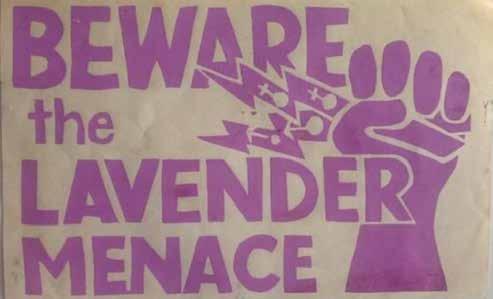
Rachel Badham looks at how queer people developed covert ways of talking to each other while their lives had to be hidden in society
) For centuries, LGBTQ+ people have used secretive signs to subtly communicate with one another without being persecuted, and to give meaning to a subculture which hadn’t yet been recognised by hegemonic culture. The communications predominantly used by gay men have been widely documented; many are now familiar with Polari, the language used mainly by queer men to both conceal their sexuality in public. The ‘hanky code’ is also a longstanding tradition which allows gay men to measure sexual compatibility based on displaying different coloured handkerchiefs from their back pockets.
However, the symbols used by self-identifying queer women are lesser known. The colours violet and lavender are often associated with the LGBTQ+ community, however they were originally a symbol of lesbian interest. Prose written by ancient Greek poet Sappho, who speaks of young women with “violet tiaras”, is the first documented instance of a queer woman expressing same-sex interest while referencing the colour. In the 1920s, queer women were known to gift lavender or violets as an expression of sapphic interest, or would wear purple pins (or the actual flowers) on their lapels to signal their involvement in the community.
Lavender then became associated with the wider LGBTQ+ community, and its queer connotations came into the spotlight when the early gay rights movement emerged and lavender sashes and armbands were distributed to a crowd of hundreds in a 1969 ‘gay power’ march. Despite the queer meaning of lavender eventually becoming more universal and much less secretive, it was reclaimed by the lesbian community in the 1970s when a group of queer feminists became known as the Lavender Menace.
Much as men used Polari, queer women also used slang terms to communicate with one
another, as there was limited language to describe sexual relations between two women due to historical repression of both queer and female sexuality. One of the earliest known slang terms for lesbian sex was ‘game of flats’, which originated in the 17th century, because the act could be visualised as two playing cards (also known as ‘flats’) rubbing together. Another term, popularised by Sarah Waters’ classic lesbian novel Tipping the Velvet referred to oral sex, usually when performed by other women. Queer women have also been known to use secretive communications to conceal their activities when they met up. Alla Nazimova, a 20th-century Hollywood actress known for having relationships with other women, has been credited with creating the phrase ‘sewing circle’ as a code name for her gatherings of fellow lesbian and bisexual+ actresses, such as Marlene Dietrich and Tallulah Bankhead
Much like gay men using the ‘hanky code’, women have adopted a variety of slang terms to indicate their sexual preferences, interests and roles. Many are familiar with the ‘butch’ and ‘femme’ lesbian labels, however lesser-known terms which were only understood by queer women include the 1950s slang ‘pancake’, which referred to a butch woman who assumed both
top and bottom sexual roles. Another 1950s term used to refer to bisexual+ women was ‘gillette blade’, meaning ‘cuts both ways’. Slang terms to describe queer women’s sexual interests continue to be used today, and although many are now known by outside communities, they remain an important mode of queer communication.
Lesbian and bisexual+ women are acknowledged more today than they have been in the past, but secretive communications are still used in countries where the LGBTQ+ community continues to be persecuted. A BBC report, The Secret Language of Lesbian Love, found women in Burundi, Africa, continue to use secret modes of communication via the internet. Same-sex relations are illegal in Burundi, but an underground network of queer women communicate online and meet once a month, where they wear T-shirts with a discreet matching symbol to mark their identity and independence. The symbol is unknown to outsiders and was not shown or described in the report to protect the community.
Queer women in Burundi also use codes when talking to one another online, consisting of internet shorthand and obscure symbols used by lesbian and bisexual+ women around the world, which are only identifiable to those within the community. One woman who spoke to the BBC said: “We don’t have dating apps, but we have social media... there are certain shorthands there too. A meme we may have picked up from somewhere else, or a coded phrase. Nothing that anyone else outside the lesbian community would ever be able to pick up on.”
For queer women in countries such as Burundi, where they risk discrimination and persecution because of their identity, secret codes and symbols which are only understood by other sapphic women are a lifeline for many, and the creation of the internet has facilitated queer communications and brought them into the new age.
For centuries, secretive symbols and languages have been used by lesbian, bisexual+ and queer women to express themselves, and although they are not discussed as frequently as the communications used by gay men, they have played an integral role in unifying queer women in times when they weren’t accepted by the wider world.
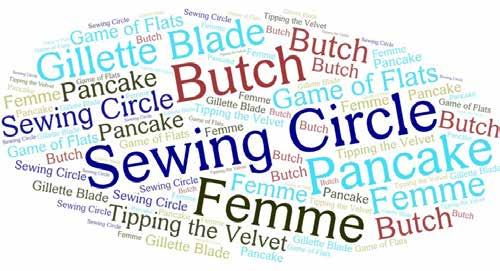
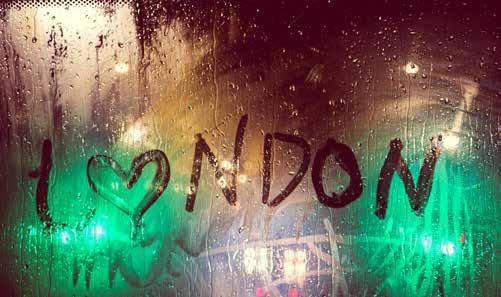
London has always been a vibrant hub full of community spirit with many charities, venues and businesses bringing everyone together with a vast array of events and services. Steven Banks catches up with a few organisations to hear what’s going on
) Cancer is a Drag. As a small registered charity, like all others Cancer is a Drag is struggling during this pandemic to continue to support people and their families living with cancer. It has been unable to hold any live fundraising events and has therefore gone online. The charity’s founder, Alan Bugg, has been hosting Isolation Bingo as their alter ego Avaline A’Love and the kindness of friends and supporters has allowed them to raise over £2,000 by these events taking place since May last year. They have also been booked for a few lockdown birthday events on Zoom, however, this is about 10% of what they would normally raise. It’s been a tough time but they are very pleased to have been able to support three families in the last six months. Collaborations are in place with Lenard Pink and his Walking Tours of London, and Charlie Hides will be presenting one of their iconic isolation bingos in the charity’s honour. Luckily the charity’s supporters are utilising Facebook to do as much fundraising as they can. Coming soon there are plans in place for Walk a Mile in their Shoes, a drag walk that people can do with friends to raise funds for the cause. D Visit www.cancerisadrag.org for more info.
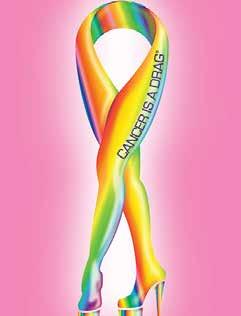
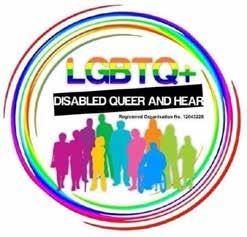
) LGBTQ+ Disabled Queer and Hear. The past year has been very challenging for the charity, it has been streaming online shows every month and, throughout this difficult time, regular contact has been made with the LGBTQ+ disabled community and currently there is an ongoing Zoom coffee morning to try to keep people motivated in April and beyond. More details can be found via its social media.
The charity has also launched a new website –www.lgbtqdisabledqueerandhear.co.uk – and plans are in place to produce a monthly paper with regular bulletins of what’s happening. The charity has been working with the LGBTQ+ disabled community roundhouse, liaising with hospitality venues and Pride events and arranging for things to be more accessible and inclusive. More information will be available in early April. If anyone would like to volunteer to help with any fundraising or events, email the founder of the charity Wayne Allingham: lgbtqdisabledqueerandhear@gmail.com.
) Pride in London. Potential plans are in place for Pride to return after last year’s event was postponed. Despite the event normally taking place in early July, the new date has been confirmed for Saturday, September 11 with safety measures in place. Plans are underway and people can expect to see familiar
favourites return such as the parade, main stage in Trafalgar Square and cabaret stage. D For more info, visit: www.prideinlondon.org
) Proud Cleaning - LGBTQ+ domestic cleaners. London’s first queer cleaning company is run by and for LGBTQ+ people and allies. First founded in December 2020, after the realisation that there was a gap in the market for LGBTQ+ cleaners, the company offers friendly, warm, trained and efficient staff guaranteed to give you a thorough and affordable service, keeping you company as well as safe during these times, What a fabulous way for our allies and ourselves to support the community leaving you with a lovely clean house. Certainly a way to make us all feel proud at the moment. D For more info, visit: https://proud.cleaning/
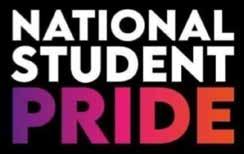
) National Student Pride Online, April 19 - 25. The last year has been a gruelling time for us all, particularly students. After last year’s sell-out festival weekend with headliners The Pussycat Dolls, this year sees, for the first time, a full seven days of events. Tickets are free. D For all events and to book, visit: www.studentpride.co.uk

) International Conference on LGBTQ+ Tourism and Events. Everyone loves to escape to the sun and boy do we need it right now, so this is an ideal event to find out specialist information on LGBTQ+ tourism with plenty of researchers and scientists on hand to find a way for practical solutions to have an ideal holiday safely. Everything from weddings, hospitality management, tourism statistics and trends, family travel, travel resources, sporting events, will be included over the two days. The event will be digital and will take place from April 22 - 23 D To find out more or to volunteer, visit https://panel.waset.org/support
From May we look forward to seeing all venues open their doors, which will include indoor events. If your venue, charity or business would like to appear in next month’s edition of Scene, email Steven Banks: londonnews@scenemag.co.uk.
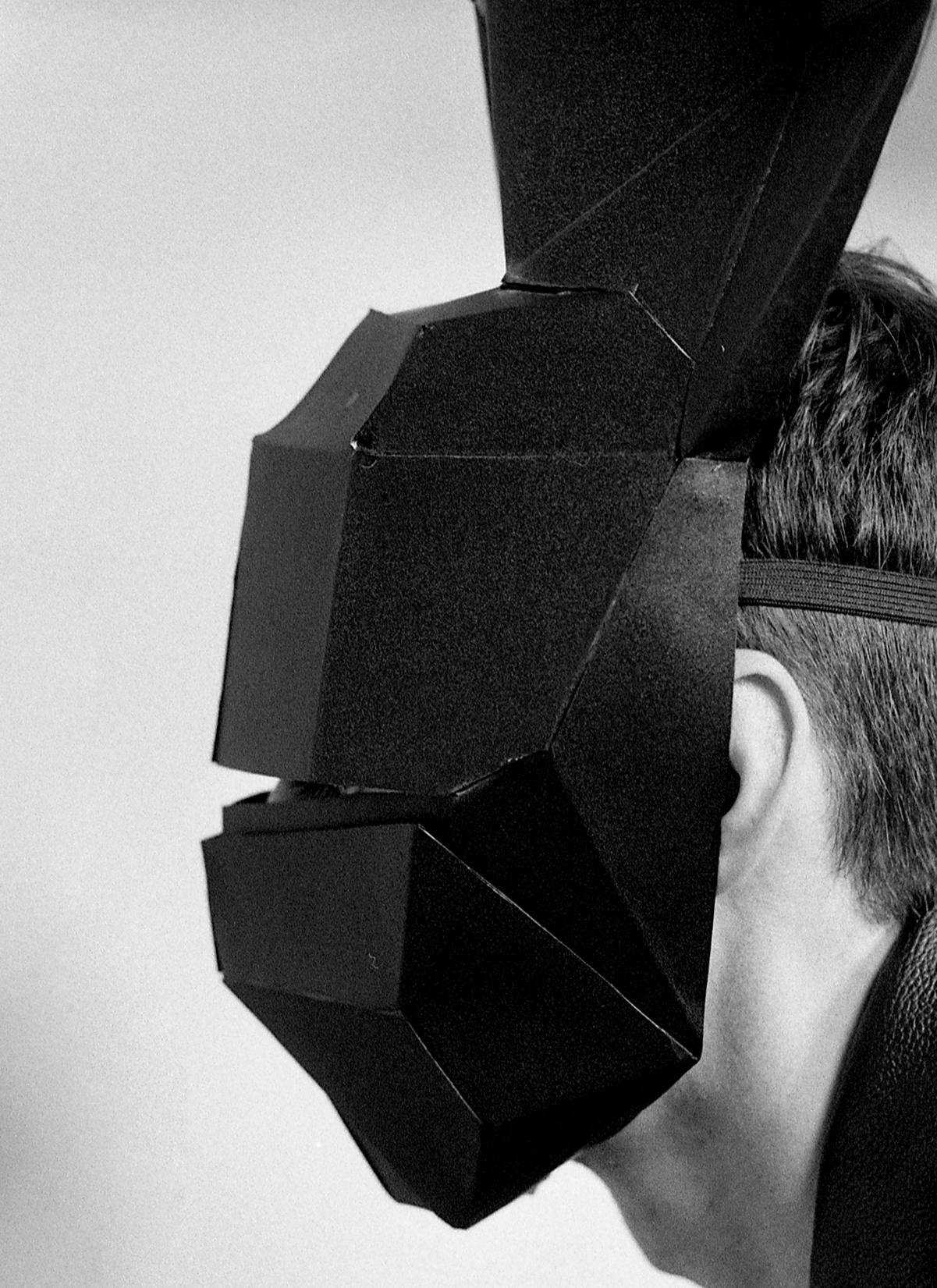

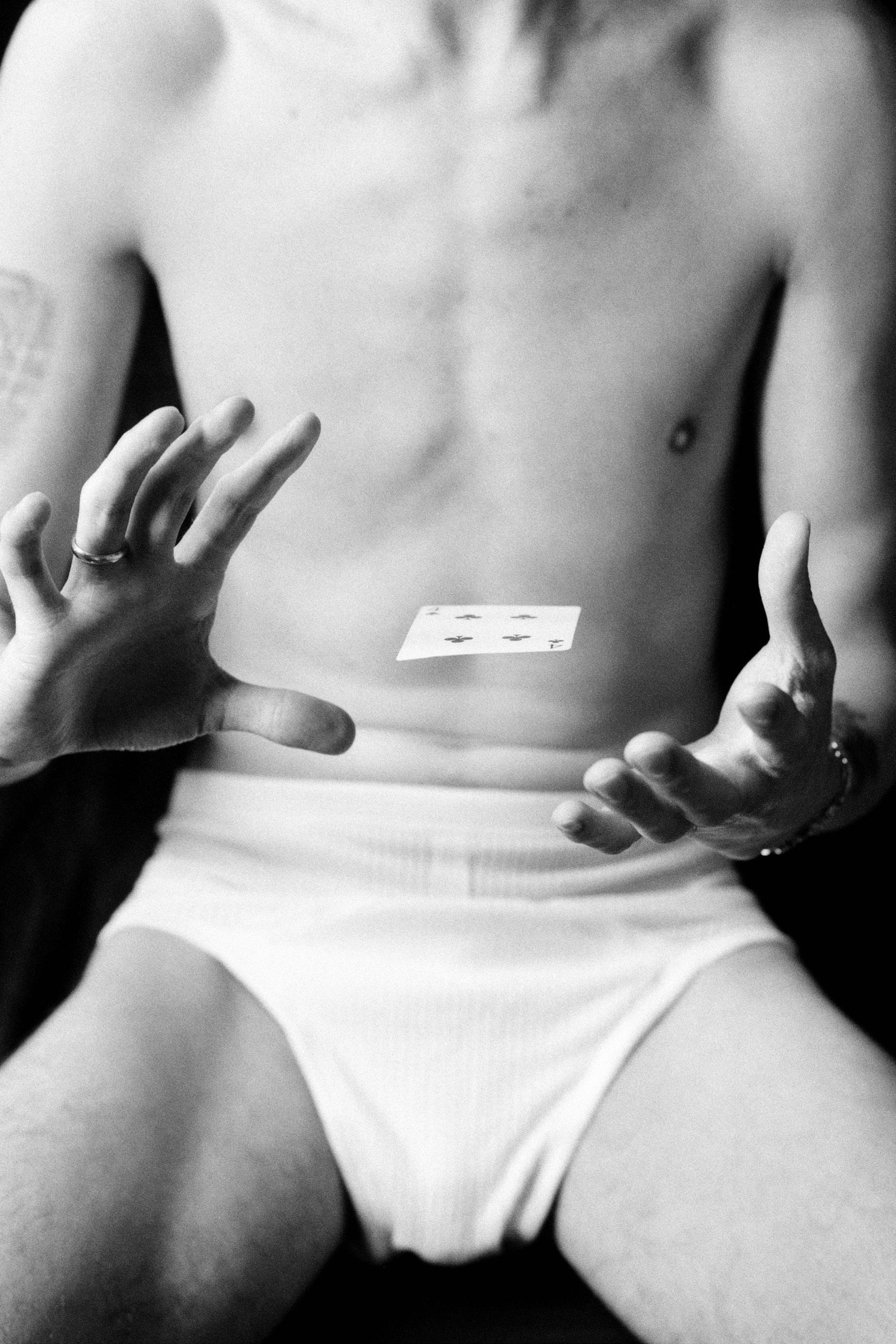
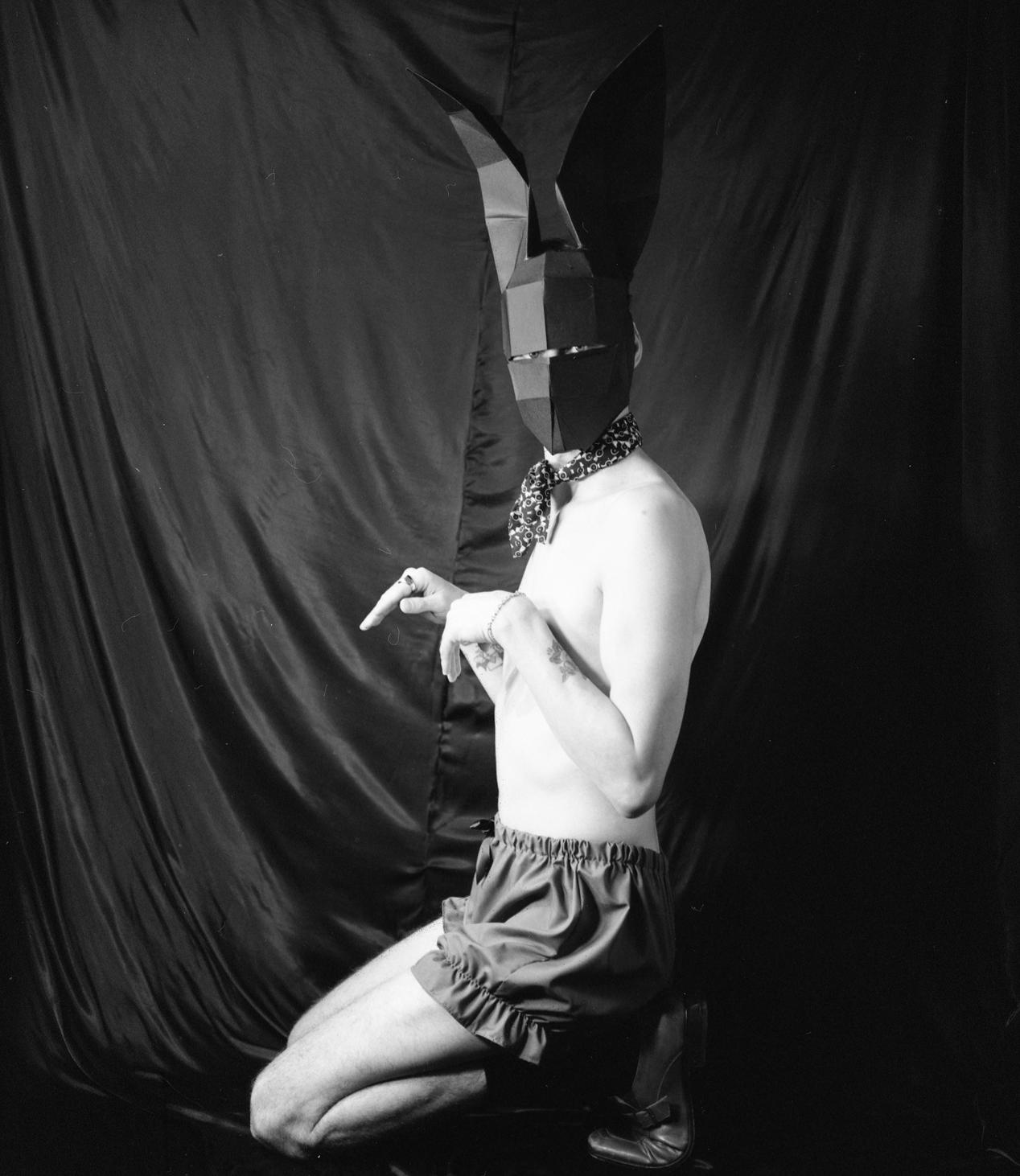
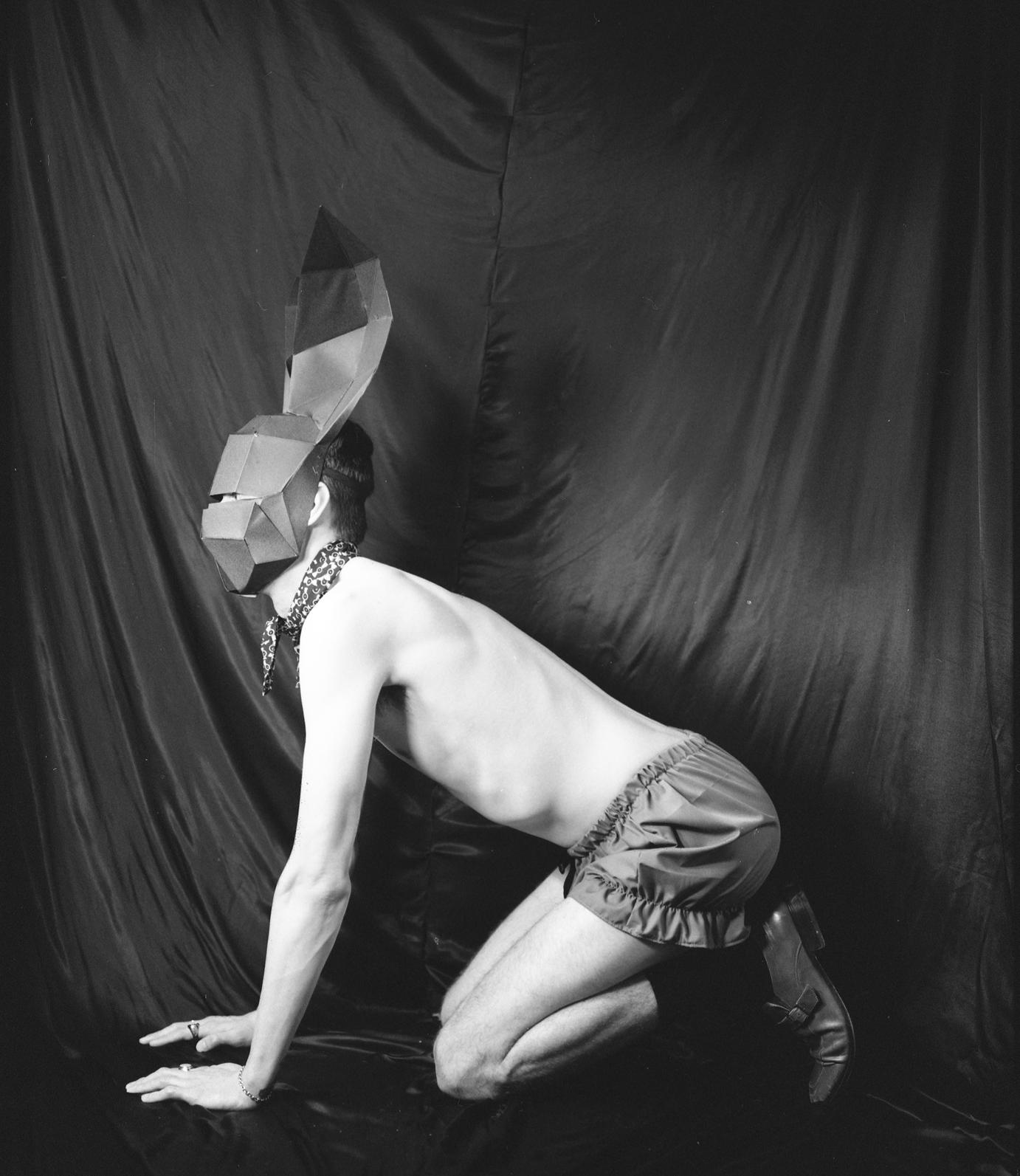
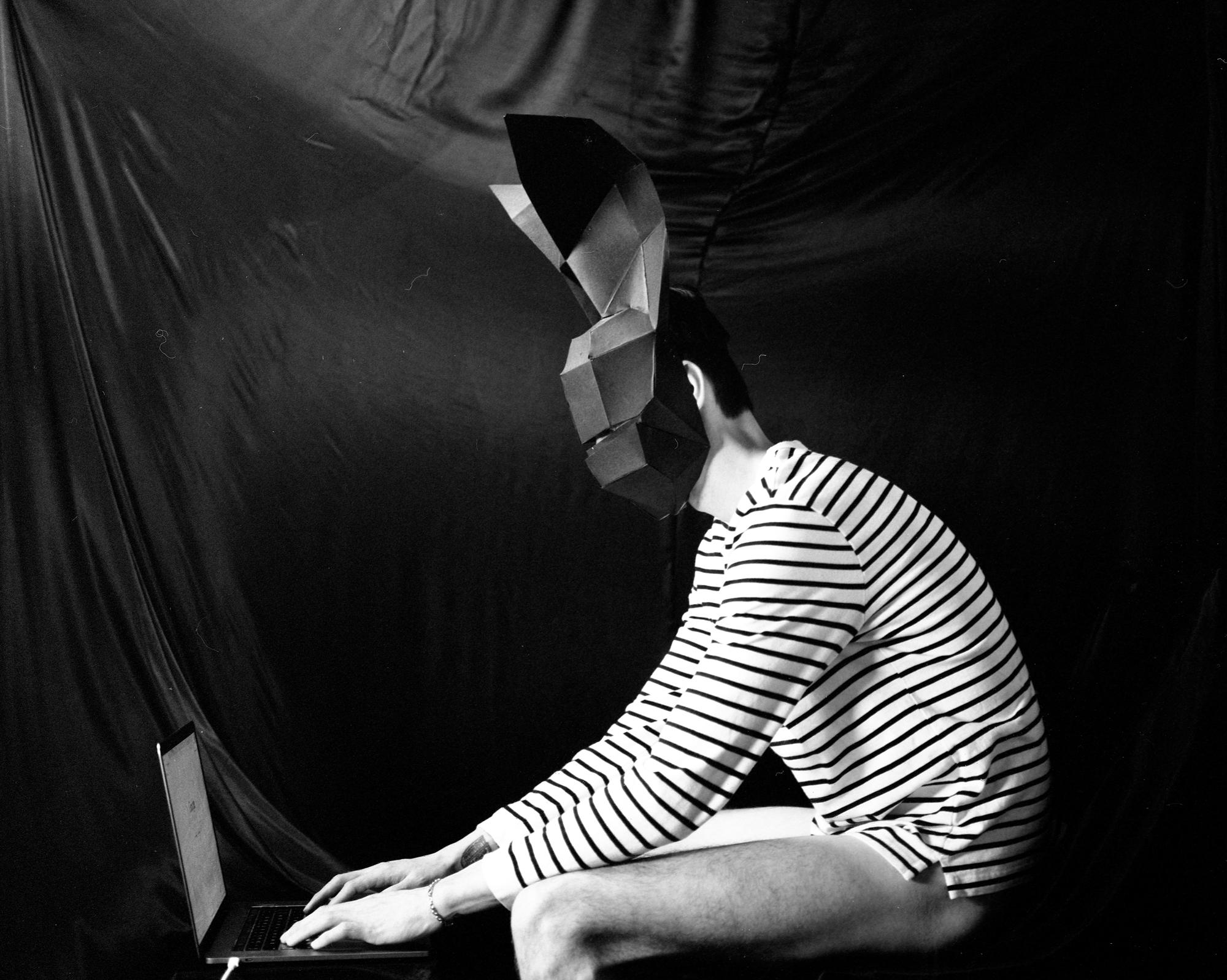
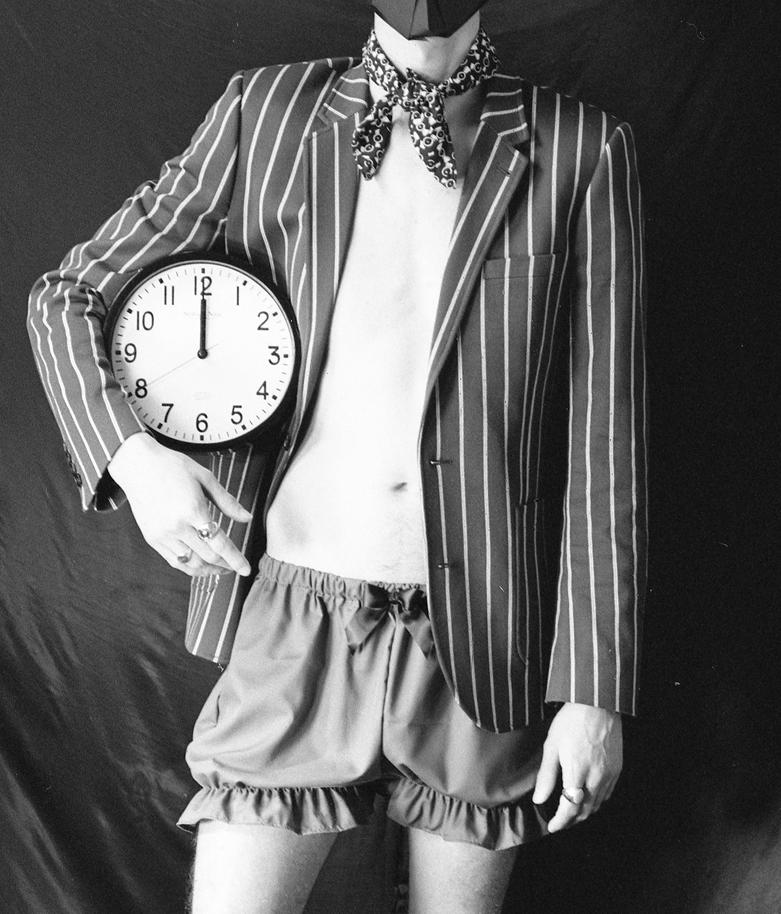
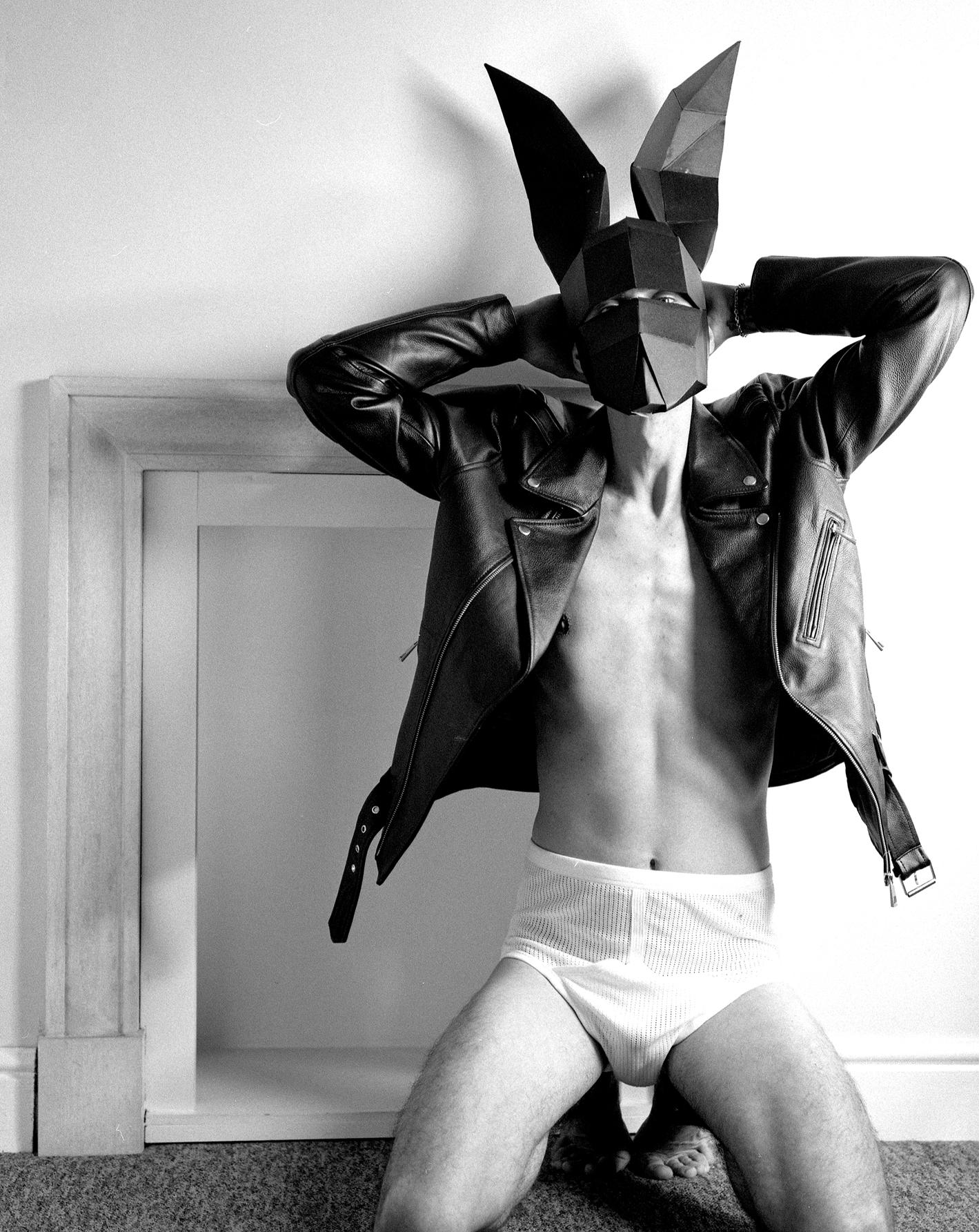
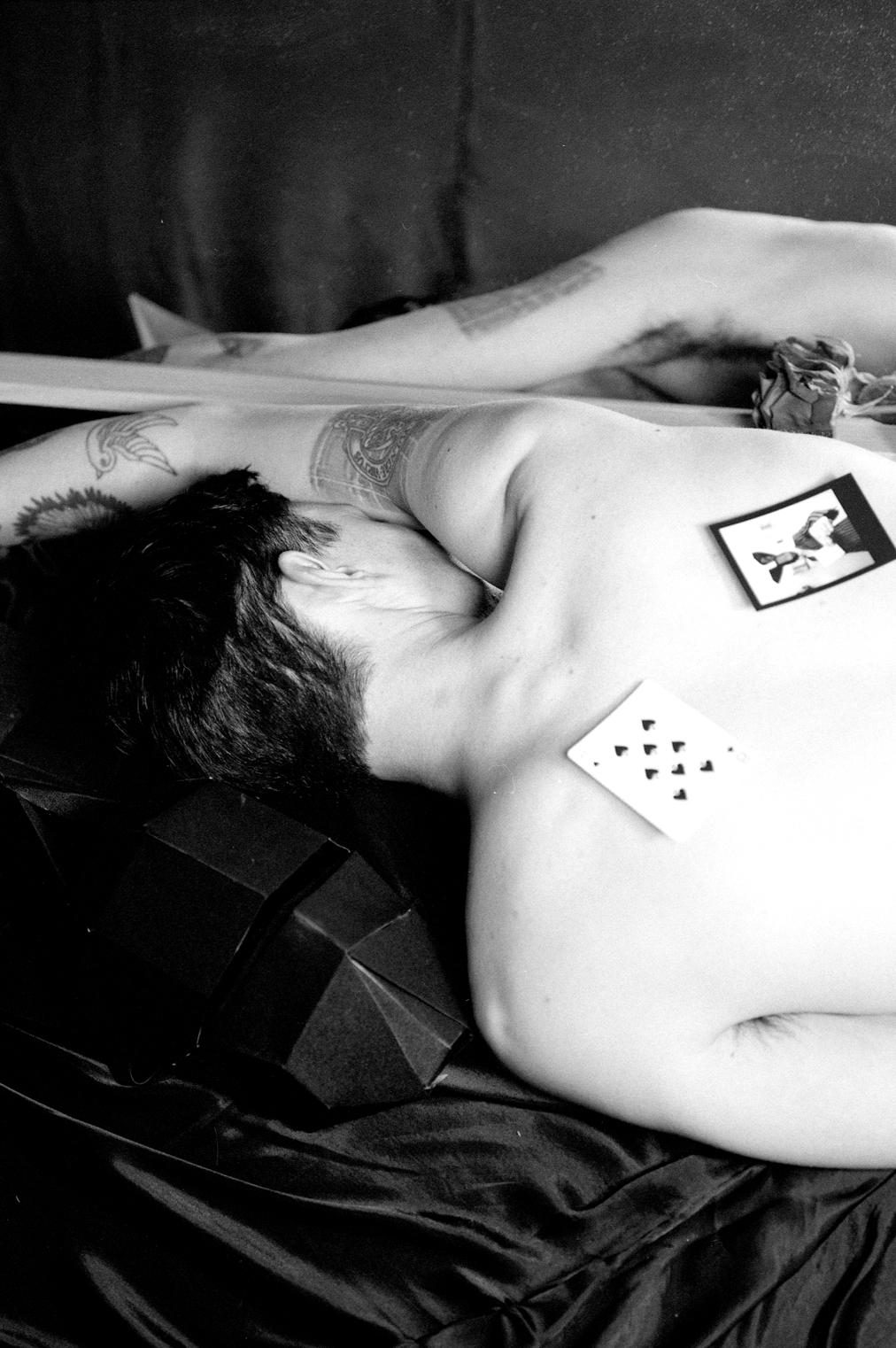
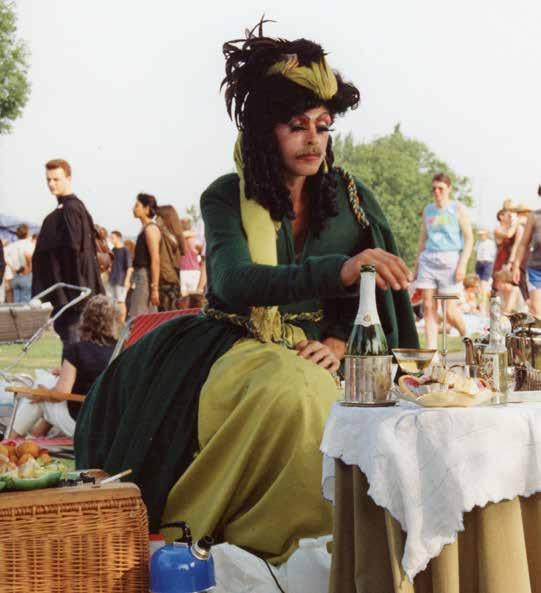
) The Queer Digital Museum is more than just an art exhibition, it’s an archive of LGBTQ+ history and anyone can contribute.
Maybe you have old photos, videos or letters that bring LGBTQ+ history to life. It could be a photo from a legendary night out in 1992 or something more intimate. We caught up with the founders of the project to find out more.
Exhibition curator EJ Scott (Museum of Transology) said: “This is a living, digital archive about Brighton’s LGBTQ+ history that has today’s community at its heart. It will serve to strengthen our understanding of the important role queer culture has played in shaping the city we live in today. By giving members of the community the freedom to add their own memories and memorabilia to the site, they’ll
retain a sense of grassroots ownership over it and so it will continue to grow.
“As well as the iconic moments and glamorous people the local LGBTQ+ scene is adored for, it will also have everyday stories by ordinary people, recording and sharing personal moments with lovers, friends and family that are close to our hearts, but are often overlooked, precisely because they’re part of our everyday lives and culture. It’s vital we record these stories so that our sense of belonging and our community’s contribution to society is not only preserved for future generations, but is nuanced, inclusive and recorded in a way that reflects our queer community’s cultural values.”
The Digital Museum has been developed by Marlborough Productions with support from
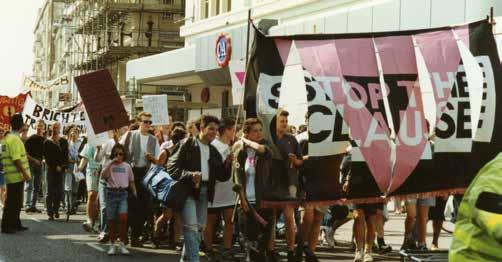
University of Sussex, funded by the National Lottery Heritage Fund David Sheppeard, Queer Heritage South project director, said: “Brighton & Hove has an extraordinary wealth of LGBTQ+ heritage, but to date there has been limited opportunities to share it and especially for younger people to learn about it. We are excited that this website can be a place to share some of our community’s amazing stories!”
Be sure to check out My Queer Museum, the accompanying podcast. Interview highlights include Juno Dawson discussing her successful This Book Is Gay, which was a big step in Juno’s transition journey, leading to her more recent work, This Book Is Trans.
Other podcast guests include: Brighton Gin founder Kathy Caton discussing Brighton’s celebrated LGBTQ+ pubs and venues; Marlborough Productions’ creative director Tarik Elmoutawakil giving us some highlights from his teenage diaries; Rainbow Chorus singer and choir leader Aneesa Chaudhry discussing mixtapes; Janet Jones, Finally Queer The Pier (Brighton Museum & Art Gallery) community curator, discussing a shirt that opened her eyes to queer culture.
“As well as the iconic moments and glamorous people the local LGBTQ+ scene is adored for, it will also have everyday stories by ordinary people, recording and sharing personal moments with lovers, friends and family that are close to our hearts, but are often overlooked, precisely because they’re part of our everyday lives and culture”
Queer Heritage South will be making an important contribution to Brighton’s extensive LGBTQ+ history. So many aspects of queer history have disappeared. Until recent years, queer people were obliged to live in the shadows to avoid arrest or social rejection. They kept the queer part of themselves hidden from view, leaving their stories untold. It makes you realise how important a mainstream show like Drag Race really is. Queer culture might be out and proud in the mainstream today, but that’s a very recent development. Projects like this help to redress the balance and preserve queer history for future generations.
David Sheppeard added: “We’re delighted to be opening our Queer Digital Museum after a year that has really demonstrated how precarious, but vitally important community heritage is. It brings us together around stories and experiences, it builds empathy, it allows us to learn from the past and shape the future. We’re so grateful for the generosity of the contributors to the Museum so far and are excited to see what else we can unearth – please get in touch if you have something to share, we would love to hear from you.”
D For more info and to contribute, visit www.queerheritagesouth.co.uk
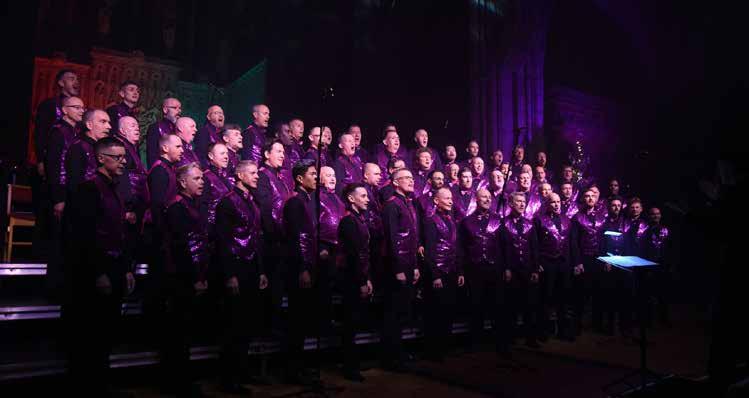
Alex Klineberg catches up with Nick Ford, chair of the Brighton Gay Men’s Chorus
) The Brighton Gay Men’s Chorus (BrightonGMC) was founded in 2005. Prior to its foundation, Brighton – of all places – did not have a gay men’s choir. BrightonGMC offers a space to socialise that isn’t a bar or nightclub. You can join without auditioning, so you don’t need pipes like Whitney to be a part of it. BrightonGMC meets every Tuesday from 7.3010pm in central Brighton. After singing, they head to the pub. It’s a great way to meet new people. There are no age restrictions.
Choirs have become more popular in recent years. What’s more, singing in a choir has been proven to have positive mental and physical health benefits. Singing is a very physical and expressive act. You can find plenty of academic papers on the benefits of singing. Around 2.8 million Britons are thought to be part of a choir, probably a lot more than you imagined.
Singing in a choir is very much a social act. Chair of the 100-strong BrightonGMC, Nick Ford, has spent the past 12 months being optimistic. The chorus, which prides itself on singing, supporting and socialising, unfortunately had no concerts for the whole of 2020, so supporting and socialising came to the fore. There’s a chorus-wide WhatsApp group so that members can keep in touch, there are weekly Zoom rehearsals followed by chorus members going off to a ‘virtual Brighton Tavern’ – the usual post-rehearsal haunt – for drinks and chat afterwards.
The chorus has also managed to recruit new members during this lockdown year – no mean feat.
BrightonGMC also created a couple of videos that were put online last year, a compilation of highlight clips from previous shows, and
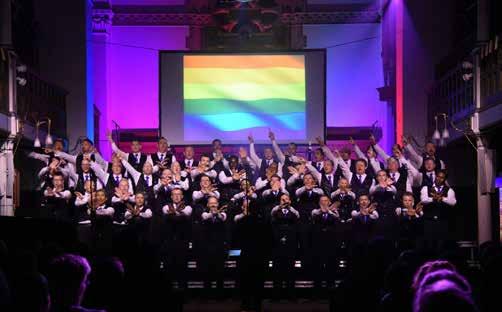
some original individual member material was presented as a social media advent calendar in the run-up to Christmas. And although singing practice is currently performed remotely with a one-hour Zoom session a week, preparations are underway for when shows can go ahead in 2021, possibly the second the second half of the year.
The chorus’ patron is the legendary June Brown (Dot Cotton herself and Lady Gaga’s spirit animal). BrightonGMC is the largest gay men’s chorus outside of London.
According to Nick: “At the moment we are looking at a late-summer concert for 2021, as opposed to our usual summer concert that coincides with Brighton & Hove Pride. The chorus very much looks forward to welcoming back our audience and singing together once again.”
BrightonGMC does a lot of charity events, including co-organising the annual World AIDS Day Charity Concert in Brighton. You can sponsor it – head over to the website for more details. If you’re looking for new experiences post-lockdown, you can even join. Membership is open to anyone, even if you’ve never sung before. The musical repertoire is huge and all of the arrangements are unique, covering everything from Gloria Gaynor to Beethoven.
D www.brightongmc.org/
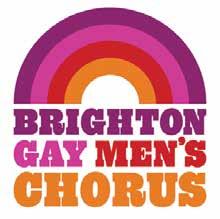
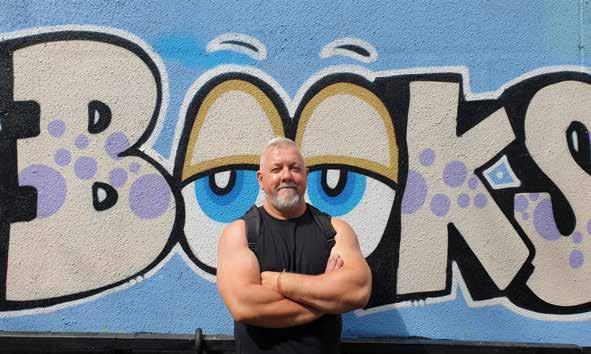
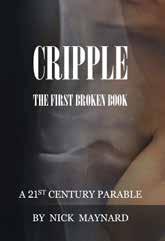
) Nick Maynard Cripple: A 21st Century Parable (£13.99, published by New Generation Publishing). This book is written in an interesting style so you can – literally – flip the narrative anyway you choose. It’s fiction and formulated in a staccato way; filled with footnotes and appendices and feels fragmentary but also fluid in a creative, unsettled kind of way. Like listening to a story being told, one you know, but which is presented in a different way, shifting perspective, narrator, time or geography, so you skip around the meaning in long narrative arcs, always in view of the protagonists but with the light and shade of the passing of the day altering the way you see them. It’s certainly a book setting a very high bar that it doesn’t always reach, which is no criticism of the ideas, but it would benefit from the attention of a constructive editor and the depiction of dialogue is clunky in parts. The plot is pretty simple, Carol and Jonathan live together, mother and son, carer and cared for, able bodied and quadriplegic. They have the same windows they look out of, on to the same world, a rather delightfully portrayed Manchester of 20 years ago. What they see and how they wrap and warp that into their own lives, dreams and narratives gives this book its momentum. It’s a story about hope and needs, about unexpressed queer desire and how a stranger can become a focus for a world out of reach. The author knows Manchester very well and captures its brick-lined streets and rain-streaked patina magnificently, the city becomes a character all its own. Each chapter has a rune, suggesting perhaps casting a handful of runes, leading to some kind of meta reading or randomness. As the book moves through your hands, the author parses what it means to be mobile, broken, stuck, desired, loved and the various ways the human mind finds exuberant flights of astonishing freedom, breaking the bonds of physical limitations to find a raw honest expression of self. Like the reader, this book is not perfect but it wants to be loved, as do the main protagonists, and that burning desire is much to be admired.
) Matt Cain The Secret Life of Albert Entwistle (£16.99, published by Headline Review). What a lovely book this is, I sighed when I finished it, it touched me. It follows the journey of quiet, unassuming postman Albert, in his 60s, living alone since the death of his mother 18 years previously in a small northern town. With no friends and nothing to look forward to, the lonely future he faces terrifies him. He realises it is finally time to be honest about who he is. He remembers George, a man who touched him in many ways, who he can’t forget, so sets out to find this long-lost love of
his life, and has an unforgettable and life-affirming adventure on the way with people who support and challenge him, ending up in a famous London gay bar to face his truth. Cain’s prose is warm, filled with humour and wry observations of life, tinged with regret and reflections of what-might-have-been but also with a passion for renewal. It’s utterly charming and seduced me into almost being unable to put it down. The narrative is suffused with joy, skipping around with an inventiveness that carries the plot along. Arthur is written with such gawky, passionate reality that you join him on his journey of discovery,
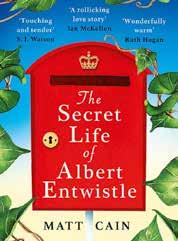
also realising that it’s never too late to strike out for the things you really, really want. Reminding us that shame, lies and regret also fade with time, the book is wonderfully affirming, filled with love and humour. This is a delightful book, one which confirms the satisfying joy of love’s recovery.
) Isabel Costello Scent (£12.99, published by Muswell Press). When Clementine and Edouard’s last child leaves home, the cracks in their marriage become impossible to ignore. Her work as a perfumer is no longer providing solace and her sense of self is withering. With the narrative journeying through Provence and Paris, the present day and the sun-dappled past, this unflinching look at how the desire for a compelling relationship and fulfilling life tears at the fabric of established life is a portrait of sensual struggles. The book is a sensual treat, filled with olfactory observations and passion. The appearance of an old lover, one filled with electric possibilities and re-embraces of her bisexual past, introduces discord and conflict into the calm days of her existence. Costello’s prose expertly leads us into the unsettled mind of the protagonist, examining what sacrifice and fear can drive you to do, the arguments and accusations, realisations and regrets of having spent a long time with one person, and the implications of suppressed or forgotten desires resurfacing and demanding acknowledgment. Costello’s narrative thrusts the
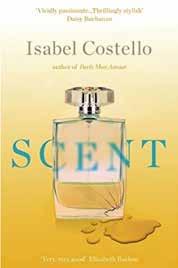
truth under our noses, we smell the complex scent of fear, the astringent sting of truth, and the warm undertones of honesty, and examines the price that finally being honest with yourself.
) Charles Moriarty X (£40, https://beforefrank.com/ collections/x). This superbly finished photography book from photographer Moriarty takes us on a very personal journey into his work from the past 10 years. We see gay men through his eyes, some of them looking back at us, others very used to being looked at, but all captured by this unblinking gaze
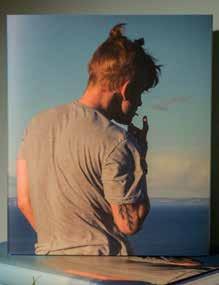
which reduces them all to still, intimate images. Opening with a Dylan Thomas poem, there is an ethereal, detached feeling to this book, and it features a diverse selection of men, each unique in their own way. The images are presented fresh, unadorned, asking us to present our own ideas of the underlying narratives at play here, but they are all clearly queer, superb images of the male form and some startlingly honest portraits. His work is precise, detailed and careful. Moriarty photographed the iconic cover for Amy Winehouse’s debut album Frank and works across the entertainment industry and is part of the permanent collection at the National Portrait Gallery. The book is a hefty tome, 200 pages of 60+ very sexy men and through the variation of captures, some intended, others with a feeling of secret moments, clandestine verses candid, there is also a feeling of the creator captured in this collection, the carefully curated choice sharing his own progression and acceptance of his queerness. Gary Needham has the last word with an essay which explores connections to other modern queer art photographers such as Goldin and Mapplethorpe.
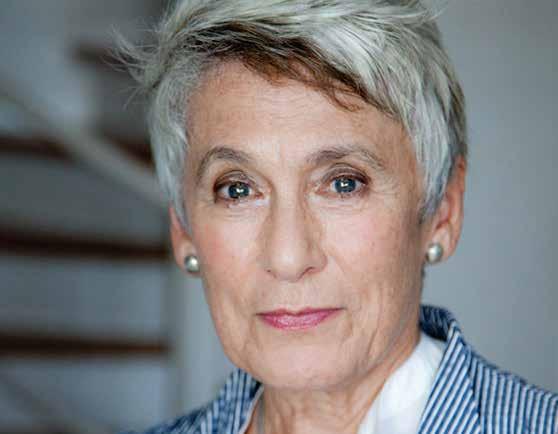
Diana Souhami writes biographies of eminent lesbians, plays, books about 18th-century mariners and murder mysteries. Alex Klineberg caught up with Diana to discuss her new book, No Modernism Without Lesbians, and her long career as an author
) It’s been 35 years since Diana wrote her first book, Gluck: A Biography of Hannah Gluckstein. Gluck was a society painter noted for her androgynous image, passionate affairs with women and ‘one-man’ shows. When the book came out in 1988, publishers did not want the word ‘lesbian’ on its cover. Fast forward, and her latest publication has the word in its title. It may even be seen as a selling point.
Diana, who is currently enjoying lockdown life in Cornwall, where she’s renovating a cottage, has written about some of the major figures of Modernism before. Is her latest book a synthesis of previous research? “The other books led to this. As they accrued, I realised how influential the lesbian community in Paris at that time was. Defying the patriarchy. Breaking from family. If they married it was a lavender cover-up. I saw how important it is to get out of an oppressive
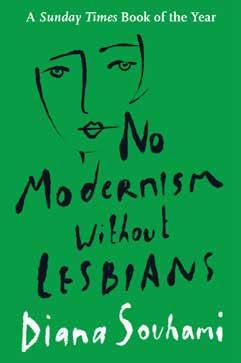
environment. This is a common factor with the women I’ve written about. They approach defiance as a positive thing.”
“I’ve been criticised for writing about well-off women. But Sylvia Beach (one of the characters in the book) wasn’t well off at all. She published Ulysses and opened Shakespeare & Co in Paris.” The bookshop is still hugely popular today.
Of all the women in the new book, who was she most drawn to? “They’re all so fascinating; if I had to choose a favourite, I’d choose Sylvia Beach because she was so feisty and she had no money. But also Bryher, the novelist and heiress – she was more trans. She felt herself to be born in the wrong body; it’s interesting to hear her talk about it. She did have psychoanalysis and she was a friend of Freud. She helped to finance his escape from Austria during WW2.” Bryher inherited a huge fortune and used it to support artists.
How does Diana go about researching her books; does she spend time wading through archives? “All the documentation with Gluck was in a cardboard box. Her nephew was her executor and he had all her papers. The box was full of letters and diaries. I took them to my flat and the story of Gluck started to emerge. I couldn’t read some of the handwriting and they used all kinds of nicknames. But if you stare at it long enough it starts to make sense. Research is what you uncover but you have to have a feeling of knowing the person you write about.”
Diana is very much a storyteller. Her books are a pleasure to read because she knows how to get the reader’s attention and keep it. “It’s also important to leave stuff out. I have an adage: if in doubt, out. You can’t go off on tangents if you suddenly find a new cache of papers. You have to tell a story. I don’t just want a birth to
death trajectory. With the first book I did on Gertrude Stein and Alice Babette Toklas, I was telling a story of two women who fulfilled the conventional happy marriage, even though they were unable to legally marry.” Their life together defied convention but it was ultimately a stable and happy one.
“With The Trials of Radclyffe Hall, the idea was that her whole life was a trial. I need to have a conceptual underpinning. Sometimes I think I’ve lived most of my life with people who aren’t there.” They might not be around anymore but Diana’s books bring them back to life.
“Right from the start I knew I wanted to be a good writer. To do it well. It’s got to be cohesive. It’s got to be shaped and cared for. I also knew I wanted to be in the mainstream. I was pleased to see that the Wall Street Journal chose The Trials of Radclyffe Hall as one of the five best lesbian biographies.”
Does Diana think gay women artists have been ignored? “I do. I think the balance is being redressed. What’s interesting about the women in Paris is that they weren’t being associated with gay men or the straight world. They succeeded by forming their own community. Historically, gay men have been insulted, but in so many cases, gay women have been met with silence.”
I had to ask Diana about Greta & Cecil, her biography of Greta Garbo and Cecil Beaton – it’s a great read. He was gay and she was predominantly lesbian, but they had a strange love affair. Garbo was one of the most famous actors of the last century, yet remains an elusive figure. Diana explains: “She didn’t want to be labelled; she was so shut off. She was not transparent; I think she was a loner. I often think something terrible happened to her in her childhood. She certainly had an affair with Mercedes de Acosta.”
“Cecil wanted to be her, how do you find a label for that? He also wanted to marry her. I didn’t want to pin it down; I wanted to look at it. Hold it up to the light. Garbo was the perfect image, but who she was as a person was quite hidden.”
So, of all the women she’s written about over the years, which one did she find the most fascinating? “It’s a hard one. It’s like saying which is your favourite child. In some ways, Gertrude Stein would be my favourite. She was so commonsensical in real life and yet she wrote really innovative prose.”
In conclusion, does Diana see her books as forming one giant project, or is each one separate? “Each book started off feeling different. I’ve written books about lots of other things. I call my oeuvre ‘Di’s Dykes’! It does become sort of like a genre, if you like. Lesbian visibility and gay visibility has improved so much since I started writing. All my books are still in print.” And long may they remain so.
) No Modernism Without Lesbians by Diana Souhami is published by Head of Zeus.
D www.dianasouhami.com

BY NICK BOSTON
) Live from London – Spring. Voces8’s spring festival continues, with a performance of Fauré’s Requiem on Friday, April 2 at 7pm.

Voces8, conducted by Barnaby Smith, are joined by the English Chamber Orchestra, with soloists Andrea Haines (soprano) and Jonathan Pacey (bass), and the programme also includes Barber’s Adagio, Fauré’s Cantique de Jean Racine, Bach’s O Jesu Christ and Mein’s Lebens Licht. Then on Sunday, April 4 at 7pm, Voces8 perform Bach’s B Minor Mass with the Academy of Ancient Music. Violinist Rachel Podger is the guest leader, and soloists include Carolyn Sampson (soprano) and Iestyn Davies (countertenor). You can join Robert Hollingworth and his ensemble, I Fagiolini, for one

of their successful Sing the Score sessions, this time singing Byrd’s Deus Venerunt Gentes, on Sunday, April 18 at 7pm. And finally, I Fagiolini perform the Byrd, along with music by Victoria, Leighton and Vaughan Williams, as well as world premiere commissions to mark Earth Day on Thursday, April 22 at 7pm. Concerts are streamed live online then available on demand until the end of April. Tickets and info at voces8.foundation. ) London Symphony Orchestra Online. The LSO has teamed up with Marquee TV, and you can catch

concerts via the platform for free (with registration). John Wilson conducts the orchestra in Ravel’s Valses Noble et Sentimentales, as well as Bennett’s arrangement of Gershwin’s Porgy and Bess – A Symphonic Picture (from Thursday, April 8), then Gianandrea Noseda conducts Tchaikovsky’s Symphony No. 6, Pathétique, and the premiere of Mark Simpson’s Violin Concerto, with Nicola Benedetti (from Thursday, April 22). On YouTube, you can also catch repeats of their earlier Beethoven Piano Concertos Marathon, with Krystian Zimerman, and Sir Simon Rattle conducting. These are available free for 48 hours only, from Saturday, April 24 and Sunday, April 25check for times at www.lso.co.uk
) Edward Gardner Verklärte Nacht (Chandos CHSA5243). Arnold Schoenberg’s (1874-1951) Verklärte Nacht (Transfigured Night) is inspired by a poem by Dehmel, in which a woman walks with her lover in a moonlit forest, and confesses she is pregnant by another man. Her lover ultimately forgives her, and the intensity of their love and the beauty of the moonlight brings them together. On this latest recording, Edward Gardner and the BBC Symphony Orchestra have cleverly explored some lesser-known works from the same period, notably Oskar Fried’s (1871-1941) setting of Verklärte Nacht, Op.9, for mezzosoprano, tenor and orchestra (with
Christine Rice and Stuart Skelton the soloists here). Fried’s setting is lush and atmospheric, with warm narrative duets contrasting with more emotionally charged solos from both characters. Rice and Skelton are beautifully matched, and Skelton shimmers at the top of his range on Glanz (glow). It is perhaps a little more obvious than Schoenberg’s intense instrumental interpretation, which here receives a wonderfully mysterious and atmospheric reading, contrasting the full weight of strings at the climactic moment, with an incredibly light touch for the lilting night music and glassy solos. The disc begins with another surprise – Fieber (Fever) by Franz Lehár (1870-1948), for tenor and orchestra. This is highly episodic – perhaps understandable when expressing the delirium of an injured soldier in hospital, flitting between calling for the nurse, thinking of his girlfriend, remembering battle and even an image of his mother,

before finally succumbing to death. Skelton is bold and emphatic, yet he also captures the sense of confusion and anguish. Skelton returns in the four Lieder des Abschieds, Op. 14, (Songs of Farewell) by Erich Korngold (1897-1957). Full of yearning, the songs employ frequent yearning vocal leaps, and Skelton’s placing is impeccably tender. Korngold’s orchestration is rich and sumptuous, and here as throughout, Gardner and the BBC Symphony Orchestra is on top form.
) Alexandra Papastefanou Tunder Appreciated (First Hand Records FHR112). Greek-born pianist Alexandra Papastefanou has performed all of Bach’s keyboard works, and to date, her recordings have also focused on Bach, as well as her own compositions. Now she turns to Robert Schumann (1810-1856), covering all the works for piano written in 1839. The following year, 1940, is known as his Year of Song, in which he wrote over 160 vocal works. It was also the year he finally married Clara, after the extended and embittered battles with her father. While not as

prolific a year, 1839 did generate a considerable number of works for the piano, and in many ways, they reflect the turbulent time of that year before he was finally able to marry the love of his life. Papastefanou has coined the term Year of Piano for her survey of this output, which she plays with clarity, avoiding overindulgence in the more romantic, expressive passages. So the Humoreske, Op. 20, is suitably boisterous and playful to begin with, yet the stuttering rhythms of the second section have a subtle unease, followed by darker, expressive then tender and lilting third and fourth sections. Schumann said when writing this “I have been sitting at the piano, composing and writing, laughing and crying all at once”, and there are certainly a lot of moods to capture here. The same might be said of the 4 Nachstücke, Op. 23, with a slightly pacy, agitated funeral procession, and swirling, darkly turbulent night revelry. Papastefanou takes some freedom with the tempi in the Arabeske, Op. 18, yet could perhaps take a little more time in the expressive recitative-like moments, but the rippling repeating rhythms have a real flow. The Faschingsschwank aus Wien, Op. 26, (Carnival Jest from Vienna), is fascinating, with its embedded reference to La Marseillaise, at that time banned in Vienna, and lively dances, rippling textures and central sad Romanze. Again, Schumann’s moods change from moment to moment, yet Papastefanou makes sense of these transitions, making coherent sense of the contrasts. A fascinating collection of lesser performed works here, and Papastefanou performs throughout with virtuosic command and sensitivity to the constantly changing moods.
More info
For more reviews, comment and events, visit: n nicks-classical-notes.blogspot. co.uk
T @nickb86uk
E nbclassical@hotmail.co.uk
BY ENZO MARRA
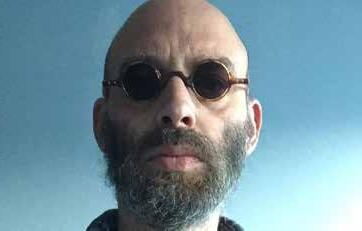
) I would like to introduce you to or remind you of Marion Charles, an artist whose studio is at Phoenix Brighton. Born in south London, she studied sculpture with Ben Franklin at Redhill & Reigate School of Arts & Crafts, and at Goldsmiths College with Ivor Roberts Jones. She has been awarded the Royal Academy Award for Sculpture and a postgrad year at Wimbledon College which allowed her to work with Israeli sculptor Menashe Kadishman.
Her drawings are now figurative in tone but not based on observation, their impact more caused by their immediacy and the directness that is involved in their application. Their inspiration ranging from the concept of the landscape, the face and its different emotional displays and resonances, the nude figure and how it can be seen, stood, striding, stood up. The range of mediums she utilises allowing a wide variety of strokes and surfaces to be seen, adding to the subject matter that they are used to portray. Inks, pastels, felt tips, wax, collage and water-based pigments. Drawn and painted, pencil strokes visible, washes and blocks of dried pigment, previous layers peeking through, the manners of their creation as visible as the subject matters they have been deployed to represent. This freedom allowing each series she begins to have little or no constraints other than the need for a support to hold them together.
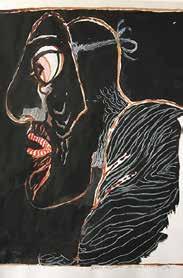
Her cast of figures included in the Blessés de Guerre series are both suitably visually and psychologically dark in the same instance, threatening without any blatantly obvious signifiers dragging us to such a conclusion. The darkness of life as important to portray as more positive reactions to at least keep us rational and somewhat thankful.
The Bedroom series, an exploration of the nude from a very different viewpoint, allowing her to portray the emotion that could be unvoiced in the mind of the body that is being denied the protection and security of worn clothes.
Their final achieved appearance differing with each change in inspiration, yet as a whole still unified by the intent seen in their individual execution. Her freedom to use colour in subdued and extravagant manners giving each series a coherent identity, never reducing the forms executed to empty stylisations or graphic depictions. Each addition to each series, needing to exist not merely another permutation. Each honest and necessary, another expression that demanded to be freed and seen. Their final achieved appearance differing with each change in inspiration, yet as a whole still unified by the intent seen in their individual execution.
Over the years she has brought up her two sons as a single parent while being involved in teaching life drawing, sculpture and other related art subjects. These joys and social realities feeding and guiding the realms that her artworks will next spread their wings into. Having reacted to undergoing heart surgery, the concept of the bedroom and of protest, her deployed imagery is very much an extension and a mental unpacking of her experience and unique viewpoint of the lived world.
BY SIMON ADAMS

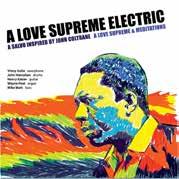
) VINNY GOLIA, HENRY KAISER et al: A Love Supreme Electric (Cuneiform). American saxophonist John Coltrane’s masterpieces, A Love Supreme and Meditations, are among the most spiritual, devotional works of jazz. Both were originally performed acoustically, which makes guitarist Henry Kaiser a brave man in attempting to rework the two pieces for electric instrumentation. He hasn’t slavishly copied the originals, rather delivering “a salvo dedicated to John Coltrane”, which transforms both pieces into new, enhanced compositions. What results is a sonic maelstrom of wailing guitar, pulsating Hammond organ riffs, and a furious rhythmic drive that sends both pieces into a new place altogether. Purists will recoil in horror at this attack on two of jazz’s unassailable heights, others will greet these new versions with undisguised glee.
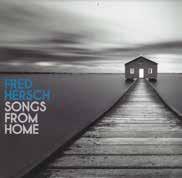
) FRED HERSCH: Songs From Home (Palmetto). Piano genius – and gay icon – Fred Hersch describes this set as “kind of a comfort food album, with a little badass stuff in there. I didn’t want to make an easy listening album, but I did want to play some music that would make people happy.” Which is what he has done spectacularly well, turning in a set that embraces a contemplative Wouldn’t It Be Loverly from My Fair Lady as well as truly moving version of Jimmy Webb’s classic Wichita Lineman, a jaunty The Beatles’ When I’m Sixty-Four and a stride version of the famous 1918 pop song, After You’ve Gone, not to mention a Joni Mitchell cover and a couple of Hersch originals. Anything Hersch plays oozes style, but this set –recorded in lockdown in his home studio in Pennsylvania – also holds your hand and tells you everything will soon be alright.
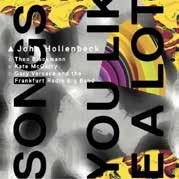
) JOHN HOLLENBECK: Songs You Like A Lot (Flexatone Records). American band leader, arranger and composer John Hollenbeck delivers his music with considerable wit and aplomb. He likes to entertain as well as inform. His latest set follows on from 2013’s Songs I Like A Lot and 2015’s Songs We Like A Lot with another set of popular classics, this time chosen by ‘You’, his audience, and arranged for two vocalists, a pianist and the Frankfurt Radio Big Band. Among the reworked songs are Peter Gabriel’s Don’t Give Up, The Bee Gees' usually saccharine How Deep Is Your Love?, and a radical rewrite of The Beach Boys’ God Only Knows. This is adventurous stuff that while easily accessible because of its well-known songs is also challenging in its musical demands. Take time to enjoy this fine set.

With many of us desperate to park our bum in a theatre, Alex Klineberg shares some of the best shows, postlockdown, to a bring a bit of gay jollity back to our lives
) The theatre industry has been wiped out since March 2020. In lockdown, we’ve been sitting at home consuming TV, films, music, books and podcasts. The performers who produce so much of the content have been left with little or zero income. Writers can keep on writing. Established stars might have the cash to keep them going for a year, but the vast majority of performers are not Mariah Carey. There’s a huge amount of pent-up demand for live events, so when theatre comes back it’s likely to do so in a big way. With a roadmap out of lockdown, theatre productions are now being confirmed for summer and beyond. Here’s our round-up of the theatrical highlights to look out for. Be sure to support the arts and go see some shows when it’s legal to have fun again.
Based on the true story of a Sheffield teenager who dreamed of being a drag queen, Everybody’s Talking About Jamie became an unlikely smash hit when it opened in 2017. The West End production will return on May 20 at London’s Apollo Theatre. Popular with all age groups, it’s a heartwarming and high camp show you should definitely check out.
Hairspray
John Waters’ 1988 cult classic turned out to be Divine’s last movie. Set in the early ‘60s, the film is a bad taste tribute to small-town Americana and pop culture. Despite being a minor hit upon release, the film never went
out of fashion. In the age of Drag Race, Hairspray hasn’t dated at all.
The musical has been running since 2002. Like Everybody’s Talking About Jamie, it’s a supremely camp, feel-good show. It’ll be heading to the London Coliseum for a limited run from April 22 - August 28 with Michael Ball filling Divine’s wig.
Witness for the Prosecution
Based on Agatha Christie’s courtroom drama, this production pays tribute to her book and the 1957 film. Who could forget Marlene Dietrich’s imperious performance? As this is an Agatha Christie story, someone has been murdered and an air of genteel menace prevails. Dorothy Parker said that any
playwright who includes a courtroom scene should be shot, this play is something of an exception. It opens on May 18 at County Hall in London.
The Queens are back! You know, Anne Boleyn, Catherine of Aragon, Jane Seymour… and the other three. You may have heard of them. They had the misfortune to marry Henry VIII, a monarch who had a fixation with beheading his wives. Only this time, they’ve formed a girl band and they’re seeking pop stardom.
It’s an ingenious premise for a musical. Six sassy queens ready to sashay out of the history books and slay. You’ll learn a thing or two about British history in the process. The

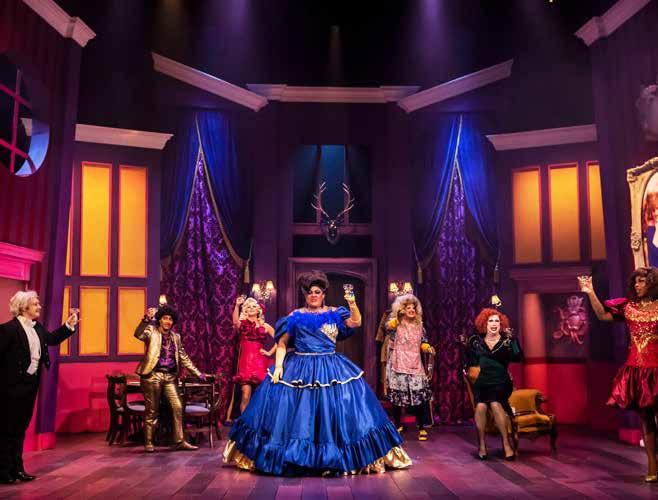
musical is also a very 21st-century expression of Girl Power. SIX was 2019’s Olivier Award nominee for Best New Musical. It’s coming to Theatre Royal Brighton from August 3 - 7.
Death Drop is a ‘Dragatha Christie’ drama set on Tuck Island in 1991. The assembled guests begin to reveal their sordid pasts and we have a murder mystery on our hands. As the suspicion mounts, we hurtle towards the whodunnit moment. This is a lighthearted romp starring Drag Race performers Courtney Act and Monét X Change.
It’s billed as having “more twists and turns than a drag queen’s wig”. Death Drop is set to
return to London’s Garrick Theatre from May 19.
Heathers: The Musical
Heathers is one of the great American teen movies, and one of the most iconic ‘80s movies from any genre. It’s one of those films people rediscover every year. And those types of films often get turned into musicals – because, money!
Set in the all-American highschool Westerberg High, Veronica Sawyer is the nobody dreaming of being a somebody. She ends up befriending the Heathers – the nasty but cool girls. When the hooligan teen JD shows up, things start to go downhill. This film clearly
inspired Mean Girls. American highschool films have become a genre unto themselves, with their own unique tropes and narrative arcs.
Heathers: The Musical ran for two successful West End seasons. It will be heading to Theatre Royal, Brighton from May 25 - 29. The Frock Fairies in Sleeping (with) Beauty – Adult Panto
What could be more British than pantomime? A pantomime starring Baga Chipz, Divina De Campo and Blu Hydrangea will also be on the bill.
Baga, Divina and Blu, aka The Frock Fairies, arrive with bespoke gifts for Princess Beauty. But the “evil minger”, Carabosse, shows up and leaves a curse upon Princess Beauty: she will prick her finger and die on her 18th birthday. The kingdom despairs.
This is a high camp panto – are there any other kinds? – that promises rude jokes, trashy songs and many gags. This is an Adult Panto so you might want to leave the kids at home. Otherwise they will be subjected to unfiltered filth from Baga Chipz! One night only on June 28 at Theatre Royal, Brighton.
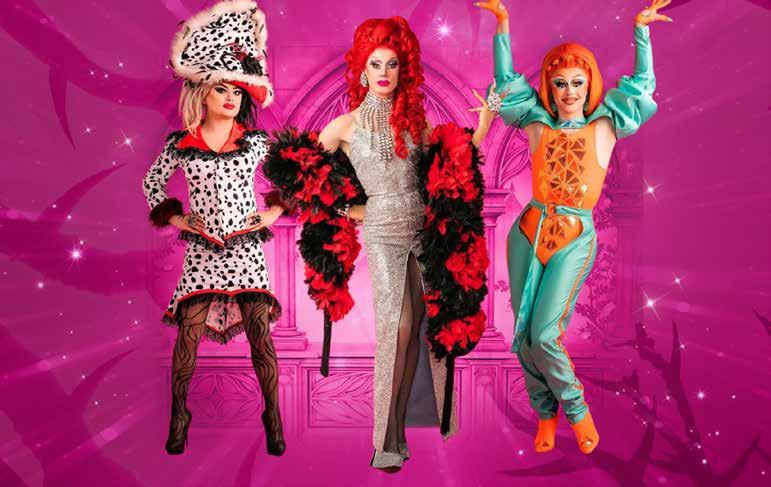

) VIY (Eureka Blu-ray). Based on a Gogol novella, this has the distinction of being the only horror film produced in the Soviet Union. In 19th-century Russia a young seminarian stays overnight at the house of a witch who is simultaneously a wizened old hag (intriguingly

played by a man) and a beautiful young woman. After her death he has to perform various funereal rites but the undead witch fights back using supernatural powers and, in the film’s spectacular climax, a panoply of freakishly weird hellspawn. VIY’s sense of time and place rivals that of Bergman’s The Seventh Seal and while it’s unlikely to truly scare modern audiences, its dark fairytale atmosphere is strangely unsettling. The first pressing includes a 1990 version of the story which mimics Hammer films in its style, but adds on lashings of perversity. The scene where the witch repeatedly stamps on her hapless victim’s gentlemen’s parts is pretty gruelling (or, depending on the viewer, very, very exciting).
) ROMEO IS BLEEDING (BFI Blu-ray). Peter Medak’s 1993 neo-noir got a rough ride from the critics and the audiences stayed away in droves. Being left to mature in the vaults for 30 years unfortunately hasn’t improved things. The film feels like a series of disconnected scenes with equally fractured dialogue. Gary Oldman, who narrates the story in flashback, is a corrupt NY cop who seems to have an unconvincing accent or an undeveloped character – possibly both. It’s hard to pinpoint the exact reason, but whatever it is his
performance is fairly unconvincing. He works for evil mob boss Roy Scheider and after a hit on a grass goes wrong he’s charged with killing Russian cartoon-style hitwoman Mona Demarkov (Lena Olin). There’s a great – well, weirdly watchable – scene where Olin tries to kill Oldman by strangling him. As she does it she gives this wonderful full-throated laugh and it’s exactly the same laugh that Tura Satana gives for no apparent reason when she’s driving in Faster Pussycat, Kill, Kill. Variety said the film could herald a new genre of ‘film noir camp’ and it’s hard to disagree. Critic Alexandra Heller-Nicholas gamely tries to make a case for the film in her audio commentary, but having an unreliable narrator is only interesting if he’s telling a pretty compelling story.
) QUO VADIS, AIDA (www. curzonhomecinema.com). In1995, Muslim residents of the Bosnian town of Srebrenica sought sanctuary at a base run by the UN which, to its eternal shame, stood by and did nothing as atrocities were committed
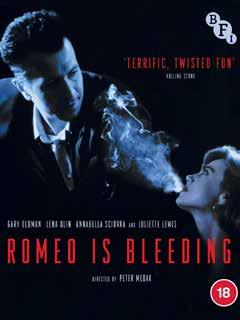
sometimes within full view of UN personnel. Jasmila Žbanic’s film focuses on a Bosnian UN translator Aida – a truly outstanding performance by Jasna Đuricic – who acts as an intermediary between UN officials, who blatantly renege on promises of help, and her own community. The film is as sweat-inducing as any thriller yet the overriding feel of the movie is one of dread: almost every scene seems to foreshadow the inevitable massacre which we know must eventually happen. The emotional stakes are ratcheted up with Aida’s attempts to try to save the lives of her husband and two sons. Đuricic goes through the emotional range of an operatic heroine but, of course, considering the subject matter this is done with a total commitment to realism. It’s a performance of great power and depth which held this viewer completely enthralled. Quo Vadis, Aida is an unnerving glimpse of ordinary people caught up in acts of genuine evil in which, thankfully, the director wisely doesn’t show anything too graphic. A harrowing masterpiece.
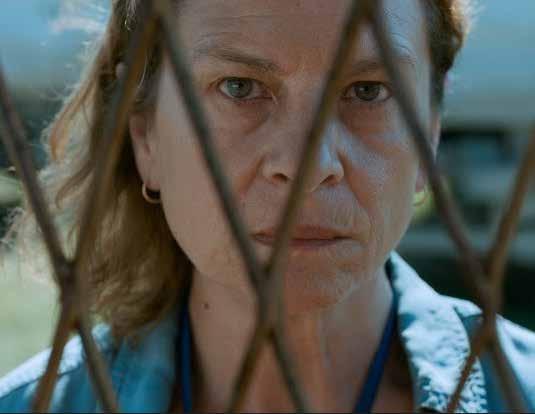
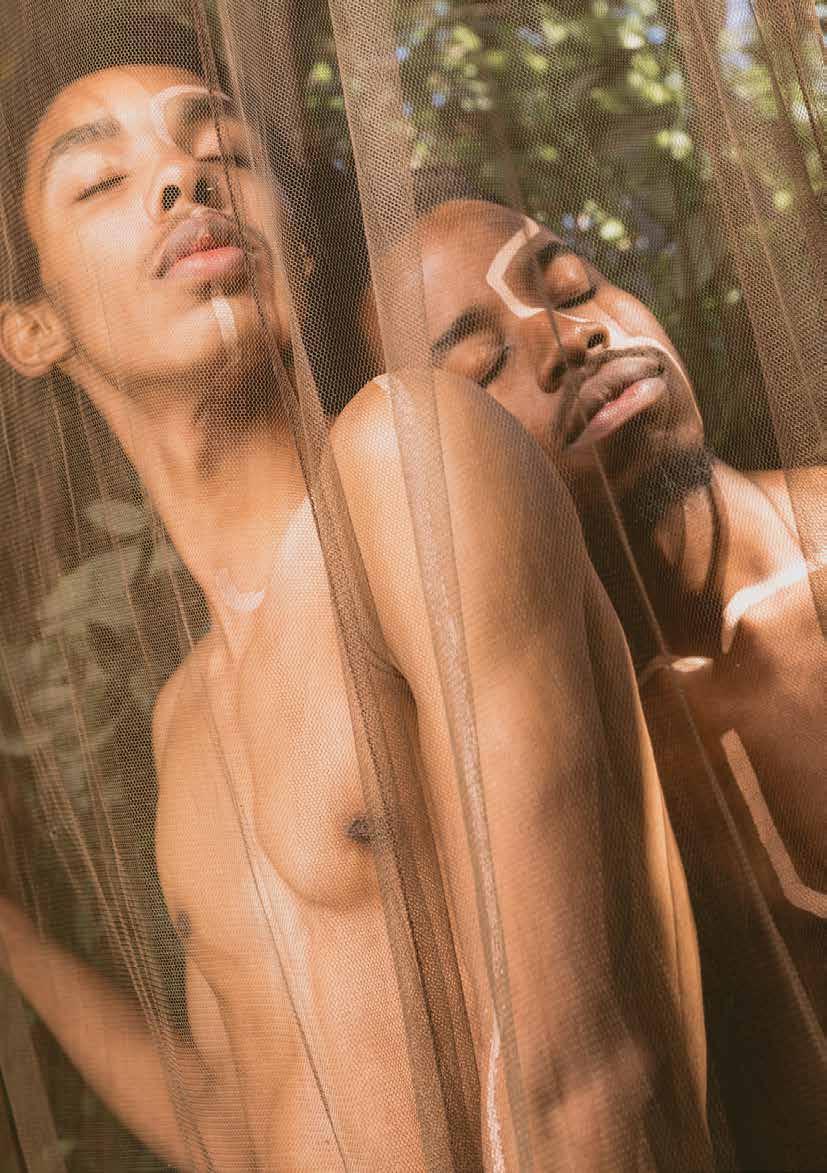
Cape Town, South Africa
Photography/words: Mas-ood Peterson, i @cpt_shooter
Models: Burton Miles, i @theeburtonmiles; Shareef Makalakala, i @shareef_d.artiste
My intention behind this photo was to visually portray two people of colour (PoC) in a safe, intimate, protected and sacred space away from the outside world where expression of queer Black/PoC love is shunned.
WITH ALEX KLINEBERG
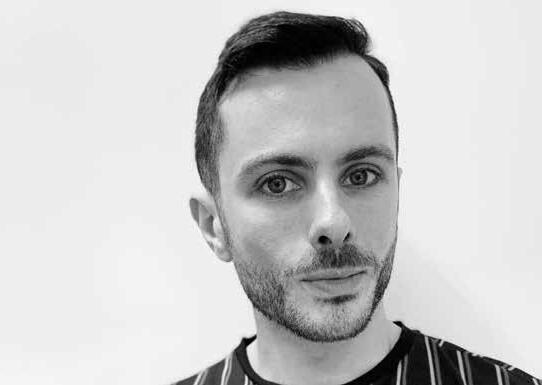
) Written and performed by Jack Holden (War Horse, West End; Ink, Almeida Theatre), CRUISE is a new play paying tribute to those who lived through the AIDS crisis. Hot on the heels of It’s A Sin, CRUISE is a timely production directed by Bronagh Lagan, filmed at Shoreditch Town Hall, with live 80s pop performed by John Elliott. Watch the performance online from April 15 – 25 at Stream Theatre, tickets £12.
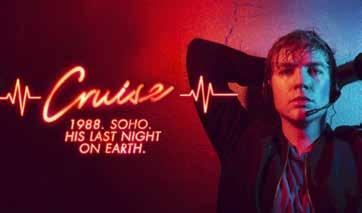
CRUISE tells the story of Michael Spencer’s last night on Earth. Diagnosed with HIV in 1984, he’s told he’ll have four years to live –at most. Along with his partner, he sells his house and parties like there’s no tomorrow, assuming there isn’t one. His partner dies two years later and he continues to spend and party.
On the last night of his four-year countdown – February 29, 1988 –Michael decides to go out with a bang. He says goodbye to everyone and continues to party. Having consumed a vast amount of drugs and spent all his money, Michael promptly… survives. Michael got lucky, but what kind of life will he live now, assuming it was over and finding himself broke? It’s a fantastic dramatic setup with endless potential.
Jack Holden said: “CRUISE is based on a true story I was told while I was a volunteer for Switchboard, the LGBTQ+ listening service. I was in a weird, unstable, self-destructive part of my early 20s. This story, among others, taught me my gay history, put my life into perspective, and helped me to grow up. The names and a lot of the events have been changed, and a hell of a lot of material has been imagined. This play is a tribute to a generation decimated by HIV and AIDS, a memorial for the old days of Soho, a celebration of electronic music, and an excuse to dance.”
Katy Lipson, theatre producer, said: “When you discover a script like Jack Holden’s CRUISE during a time when our beloved sector is closed it reminds you why it must reopen again. Making the decision to film CRUISE is just another way of adapting and ensuring this important story has a chance to reach audiences in a new and innovative form before we can bring it to the stage later this year for a live audience.”
Available to book and watch online from April 15 – 25 by visiting www.stream.theatre/season/61. Tickets £12 plus booking fee.
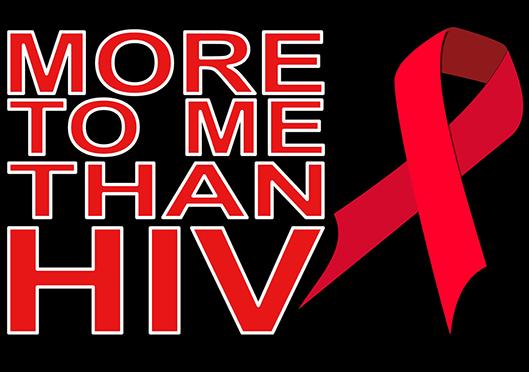
BY DAVID FRAY
) The Channel 4 drama series It’s A Sin has brought the early days of the HIV epidemic to a mainstream TV audience. It is a difficult, but rewarding, watch.
It’s not all gloom and doom though.
I think World AIDS Day should be renamed World HIV Day. You don’t hear the acronym AIDS anymore. AIDS, more often than not in modern times, is only associated with people who are diagnosed very late, or who do not access treatment.
It’s A Sin shows how things used to be. It is not like that anymore. There is a whole host of different treatment combinations; doctors work out which ones suit their patients best.
Most people now just take one simple pill a day, and can be confident knowing that their HIV is suppressed.
Effective treatment has been with us for 25 years now, with continued research happening at a great pace. New injectable medication that lasts for six months will soon be made available to people who struggle to take a daily tablet.
I am really pleased that It’s A Sin was commissioned. In today’s climate of Covid, people’s minds are focused on a virus that is serious and can kill. The programme has allowed people living with HIV (PLWH) to talk more openly about being HIV positive, and have the conversations that reassure those whose knowledge about HIV is not up to date.
Compared to the 1980s this is what we now know;
• Treatment is so successful that a person on effective treatment only sees their HIV consultant once a year, and they give a quick blood test twice a year to make sure the treatment is stable.
• The side effects of antiretroviral therapy are negligible, now that scientists know exactly how to stop the virus from replicating.
• If you are not living with HIV, and think you may be at risk, PrEP, a preventative pill, is so successful that people can have the sex they want, safe in the knowledge that they will not become HIV positive. It is available now, so ask for it if you find condoms difficult to use.
• We now know that a person with an undetectable viral load –achieved with effective treatment – cannot pass on HIV sexually to their partners, even if condoms are not used, and even if PrEP is not used. Look out for the phrase U=U (Undetectable=Untransmittable), and share this information with people. This is fantastic news, as many people find the barrier methods of safer sex inhibit sexual intimacy.
• Testing regularly and early diagnosis are two key factors in living a long and healthy life with HIV. It has been proven that PLWH can live a normal life expectancy.
We celebrate the lives of PLWH in our More to Me Than HIV exhibition. People are starting to break the chains of stigma, and realise that there is no shame in having a virus. Viruses are a part of nature, and we are all having to learn to live with them.
Visit www.moretomethanHIV.life for further information.
BY ROGER WHEELER
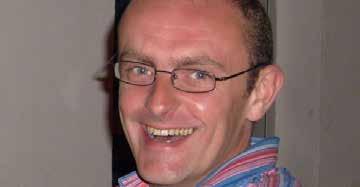
) Spring has sprung and, as Tennyson wrote, “a young man’s fancy lightly turns to thoughts of love”. Not that most young and not so young men have been thinking of much else throughout the rest of the year anyway.
When I was young, many years ago, there was a saying that “nobody loves a fairy when she’s 40”, but when you suddenly hit the big 4 O you realise that actually you are at your best. Maybe not the trimmest figure and no longer a smooth-cheeked 21-year-old hunk, but you know a lot more. You have acquired that undefinable thing called experience. Who wants to leap into bed with experience?
Today’s young hunks should give it a try and prepare to be surprised, plus they will probably get a cooked breakfast.
First, find your man, settle down, get married, suddenly you’re not really that gay after all, just an ordinary couple with exactly the same problems as everyone else only more stylish with better holidays.
“To finally become a mature adult, we have to learn from mistakes, remain open to change and accept and adjust to the realities of life”
Being gay, we have always lived with an obsession with youth and good looks, this has always been the case, I’ve never understood why but I do it myself by admiring good-looking young men. Even after being married to one of the best-looking men I had ever met. He once caught me inadvertently looking at a particularly handsome specimen of manhood, he grinned and said so long as you’re only looking, which of course he knew. There are quite a number of gay men that prefer older men, I’m not complaining. It’s in the very nature of life that we will all grow old, so all those young hunks that studiously ignored my lustful glances 30 or so years ago are now so much older themselves. History is probably repeating itself, I wonder if they remember that they were once the object of desire and pointedly rejected the overt gaze.
Of course you can’t avoid growing old, but growing up? That’s another matter entirely. From my, now, great age I have seen many quite elderly gay men, making what I can only say complete fools of themselves. Acting as though they are 25 again assuming that this will make them attractive to the young guys they’re looking at.
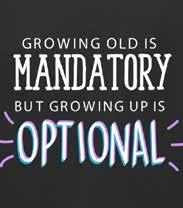
To finally become a mature adult, we have to learn from mistakes, remain open to change and accept and adjust to the realities of life. That’s the hard part, recognising that we are just mortals and that young men will no longer swoon over us, if they ever did. Growing up is optional, we can ignore the fact that bits of us are deteriorating, our hair may be falling out and we no longer have waistlines. None of that actually matters, just concentrate on your best features, charm, personality or your ability to cook as men love to eat no matter what. It’s an old cliché that men are like wine, some turn to vinegar but the best improve with age, it’s up to you.
BY ERIC PAGE
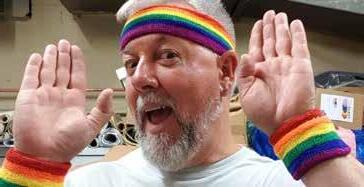
) I’m a fauxmasexual, or is that a FoMosexual? I used to be a Po-Mo Ho-Mo, then hit a retro stride for a few years and became a Meta-HoMo, then lost my Mo-Jo and dropped the Mo. I never meta better Ho. Ho Hum… It’s been a long winter of discontent; all the sling backs and shady arrows have been buried. I don’t go anywhere gay or do anything Queer, the most extravagantly bent I’ve been is to sport my rather racy Tom of Finland face mask in the corner Co-Op, no clubs, bars, parties, saunas, Prides, fundraisers or community events. I’m not missing out, no JoMohomo me, as there’s nothing to miss out on, I’m no longer the FoMo, but feeling more FauxHomo every day.
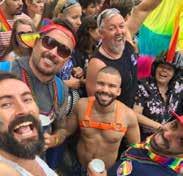
The lack of being in a huge crowd of other Queers is getting to me, not having any Queered-up LGBTQ+ peer space to waddle in, like an opinionated hippo, diminishes me. I miss judging everyone all the time, throwing shade and wondering in a VERY LOUD VOICE why they continue to dye their hair at 55, or ever thought THOSE leggings would look good paired with trainers. Whispering and giggling about what THEY sent me on Grindr or shuddering to see who keeps trying to catch my eye. It’s no fun bitching to yourself, about yourself, believe me, I’ve tried it. I can throw so much shade at myself that I’m practically eclipsed, but it can’t match the electric competition of meeting a random shady queen at the bar, at 2am, and having a round of clap-back tennis.
Miss Rona has made me into a nice person, a FauxHomo, I’m so glad to see anyone Queer, absolutely anyone, that I smize so hard over my mask my brows ache. Morrisons is my Legends, Asda my XXL, there were three Queers in the bread queue last weekend, and I felt like I was at Pride, although I’ve not had a single episode of inappropriate glitter appearing somewhere for more than 12 months. Rather sadly my aunt sent me a cheap glittery Xmas card which I rubbed around my Covid chubby cheeks just to add a touch of glam to my dark heteronormative days.
I, and I’m sure you, get so much affirmative energy from being around other LGBTQ+ folk, marching as an ally with the fierce crowds at Trans Pride, holding a candle at World AIDS Day, waving flags for IDAHOBIT, and rubbing the bellies of the hotties at Bear Weekend, joining voices and singing with the Rainbow Choirs, laughing with the Pink Fringe throngs, playing bingo with a frayed drag queen slightly drunk on a Sunday, and sliding through the crowds like a greased glittered salmon at Pride. Not to mention the throbbing, thrilling urgency of each lipsmacking Hottie So&So who caught my eye that night.
I miss you. All of you.
I am the sum of these things, they all rub off on me, nurture me, gift and give me so much learning, experience and raw unembellished live affirming fun. My gilded patina is your sweat left on my body after dancing widely to the latest throbbing tracks. Shimmering into my being, adding infinite variety to my experience. Without them, without you, Dear Reader, in my life, I am diminished. I keep some gay oil back, like a wise virgin (ask Jesus) but I still want to run with the foolish virgins, hopeful, deluded, barefooted; well in heels actually, but that breaks the metaphorical flow…
No Queer is an island entire of itself; everyone is a piece of the continent, a part of the main; and therefore never send to know for whom the bell tolls; but be exquisite and never explain.
BY BILLIE GOLD
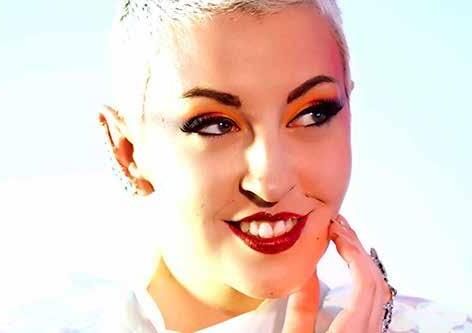
) At the present moment of writing I have my feet soaking in a concoction of hot water and salts, barely able to keep my eyes open, and I’m one of the lucky ones after eight long months of not working. Remember Fatima’s next job in cyber and the stream of hilarious spoofs it produced? Turns out it’s not actually that far from the truth in a couple of very contradictory ways.
Understandably, the government ad that encouraged us all to retrain was met with unprecedented anger, which I wholeheartedly agree with. Most of us have worked so incredibly hard to be the entertainers we are today, honing our skills and being the very best we can be, and my god do we love our jobs. But behind that ad there was a hum of panic. Should I retrain? What if the world never comes back the way it was? Am I simply done as a performer?
None of us are ready to say goodbye to everything we love, and in a lot of ways for me specifically, thinking of something else except my art as a job sort of felt like a betrayal to my career. But loving my job was never going to stop PAST DUE letters coming through the door. ‘Retraining’ as a turn of phrase was somewhat, how do I put it, cute. Retraining takes time, courses, and money, which as a suddenly out of work performer who has likely been left behind by government financial help, I and others simply don’t have.
“My career will never leave me, I don’t have to betray it, but I do need to pay my rent. I see no better way than fondling the snot of strangers hoping for a very quick end to the most boring apocalypse ever”
The performer community was outraged mainly because to Joe public it looked like our jobs didn’t matter, that they were ‘silly’. I refuse to regurgitate internet memes about art mattering, because I suspect we have all been in an Instagram scroll hole for the past year anyway, but the fact is the same. Looking at your life not from a stage and saying ‘how do I feed myself?’ is a very real thing that we have had to do and personally I have been surviving unconventionally until just recently. (Webcamming is much like therapy in lingerie, but we aren’t the only ones out of work, and there are hordes of beautiful people saturating the sex work market, so it’s not as lucrative as you’ve been led to believe).
“None of us are ready to say goodbye to everything we love, and in a lot of ways for me specifically, thinking of something else except my art as a job sort of felt like a betrayal to my career”
Thankfully my search for work has very happily come to an ironic conclusion. The thing that put me out of work is now my work. I have been working with the most fantastic group of people Covid testing and joining the national effort to make this horrible virus sling its hook.
And in the space of a week I have found myself humbled by how big this thing is. My career will never leave me, I don’t have to betray it, but I do need to pay my rent. I see no better way than fondling the snot of strangers hoping for a very quick end to the most boring apocalypse ever.
BY JON TAYLOR
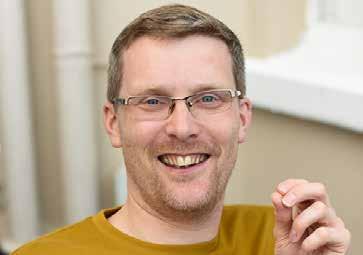
) Some people have callings when it comes to jobs or professions. They have a dream, a desire, an urge to become a chiropractor or a chiropodist or other things beginning with ‘ch’. You’d be all stunned to hear that I never felt such a calling. I never had a desire to become a vet or a policeman or a doctor or anything really. Apart from a pop star. I think we all thought we’d be pop stars when we were young. I wanted to be Cheryl Baker. She was my ‘ch’.
“Who knows where I’d be now. Hobnobbing with executives from around the world, jumping on to private jets and taking phone calls about the project in Cancún”
My Mum and Dad were both teachers and I saw what they went through in that profession, which was enough to put me right off it! So without having a career to aim for I just sort of fell into working in retail. And it’s alright, it serves its purpose. If it weren’t for the public it’d be marvellous! Ultimately I was very lucky to be in a position where I didn’t need to earn the big bucks or feel I had to climb a corporate ladder.
I’d inherited some money from my grandmother, which 25 years ago was enough for a deposit on a flat. Would just about pay for a decent secondhand car now. So, as my outgoings are relatively low, I don’t have to earn much to get by.
“For some people their work is their life. They eat, sleep and breathe it. It consumes them like a fire and absorbs all their energies. For me, my job is a means to an end”
So this meant that I didn’t have to push myself or drive myself forward into my career. On the downside it meant I didn’t have to push myself or drive myself forward into my career. Perhaps I could have become a higher-up retail kinda guy, working weird shift patterns and never having a weekend off. Perhaps it would have been necessary to go into more responsibility and therefore more pay kinda jobs. Who knows where I’d be now. Hobnobbing with executives from around the world, jumping on to private jets and taking phone calls about the project in Cancún. It’s not really me though.
“I never had a desire to become a vet or a policeman or a doctor or anything really. Apart from a pop star”
For some people their work is their life. They eat, sleep and breathe it. It consumes them like a fire and absorbs all their energies. For me, my job is a means to an end. My energies go into my creative life, into my singing, my writing, my performing. In an ideal world, I’d earn a bit of money from doing these things but that’s a bit of a pipe dream. But who knows. The ideal that we all look for in our work life is to be paid for doing something we love. Whatever that is. If you love being a teacher, that’s brilliant. If you fall into retail and find you adore it, that’s fab.
I’ll go back to my retail job in a couple of weeks and get that part of my life up and running again. I’ll need to find something else I think but, for now, it’s all groovy. Perhaps I’ll look to see if the position of Cheryl has become vacant.


How being queer became my career.
By Rachel Badham
) My queer identity is perhaps the most pivotal factor which led me to decide on a career path. As many people’s sexual/gender identity has little to no overlap with their job, the importance of my queerness to my work as a journalist probably seems a little bit unusual, besides the fact that I work at an LGBTQ+ magazine. However, discovering that I was queer and accepting my sexuality was not just a personal realisation, but it led me to decide that I wanted to pursue a career as a writer.
I realised I was queer when I was 14, although it took me a good while to actually accept it. I spoke to one friend about it during my time at secondary school, with most of our conversations involving me saying: “I have a crush on a girl in our class and about 20 other female celebrities, but I’m probably still straight, right?” I’m not entirely sure why accepting my sexuality was so strenuous considering all my friends and family have been so supportive of me. I usually attribute my difficulties to my internalised biphobia, which manifested as a result of negative representations of bi/pansexual people.
However, after a few years of not just denying
who I truly was to others, but to myself, I decided that enough was enough. While I did explicitly come out to my close friends before I began college, I made up my mind that once I started this new chapter of my life, I would just start living as my true self. I never publicly came out on social media as a lot of young LGBTQ+ people have done, but if anyone questioned me on my sexuality, I told them that I was queer. Or if anyone asked if I was dating or interested in someone, I was honest with them, regardless of the gender of that ‘someone’.
After a few challenging years of confusion regarding my identity, I finally felt much more at ease with myself. However, these years were also characterised by another kind of confusion - what the hell did I want to do with my life? I think everyone has been asked the age-old question ‘what do you want to be when you grow up?’, and unless you’re one of the few people who has always had a clear career in mind, those words were probably enough to send shivers down your spine.
When I was a young child, I would answer that question by saying I wanted to be a vet during
the week, because I loved animals, and then a pop-star at the weekend. However, as I got older I realised that this was not viable and I would have to consider other options. As a teenager, I had a handful of vague ideas about fields of work which I could enter into; at one point I considered marine biology as I enjoyed science and had dreams of travelling to tranquil coastal locations to study the beautiful wildlife. Fortunately I decided against it, as I realised the fact that I’m terrified of most sea creatures might cause some complications.
I always loved English literature at school, so I considered some form of writing as a possible career choice, but again my thought process was all rather vague. As I was struggling to accept and feel confident in my sexuality, I was also finding it hard to create a solid idea of who I wanted to become once I left education. As someone who hates life’s unavoidable uncertainty with a passion, this was an incredibly difficult period for me.
As I mentioned, I started accepting my queerness and speaking more candidly about it during college. As I became more confident about my identity and started to interact with LGBTQ+ culture more, I started to pay greater attention to the injustices that queer people were facing across the globe. It was during my time at college that the 2016 Pulse nightclub shootings happened in Orlando, which saw 49 people killed and a further 53 injured. This attack on the LGBTQ+ community enraged me so much that I felt compelled to write a piece on it for our college newspaper, examining whether our progress towards LGBTQ+ equality was beginning to stagnate in Western countries. I also openly discussed my own sexuality and whether I personally felt the level of LGBTQ+ tolerance was increasing in the UK and its schools.
As devastating as the context was which led me to produce the article, it was writing this piece which confirmed to me that I wanted to be a journalist – not only did I enjoy the writing process, but I found meaning in discussing issues which I felt strongly about, and found strength in the idea my words could resonate with someone or make them consider the inequalities which LGBTQ+ still face to this day. And I certainly wouldn’t have felt brave enough to submit the article had I not accepted my identity at that point.
Now four years and one degree later, I’m still a little surprised to say that I am actually working as a journalist. And I’m proud to say that at 21, I’m actually further than I thought I would be in my career, especially considering the effects the Covid-19 pandemic has had on the job market. My desire to be a journalist is not solely based on being queer, and I’ve written a handful of non-LGBTQ+ articles for other platforms, but I can safely say that my want for LGBTQ+ equality has been one of the main factors that has fuelled my passion for writing. And without embracing my own queerness, I wouldn’t have had the confidence to share my writing.
BY MICHAEL HYDES
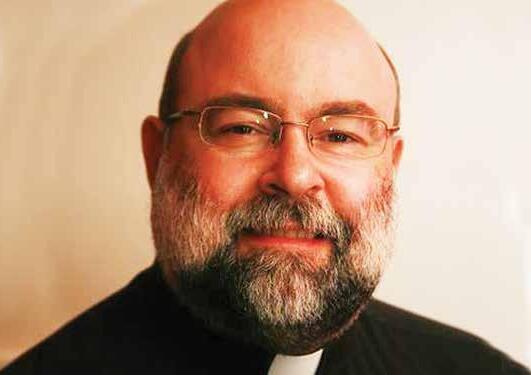
) At my first Pride event at Kennington Park in 1991, I met a group of people who were from an LGBTQ+ affirming church. The church was MCC North London and I remember going to their Pride service the following day. By the time it was over I knew I had found a new home; but if you’d told me that one day I would be the pastor of an MCC church I would have thought you were mad.
Life is full of strange twists and turns and finding our calling in life isn’t easy. I had met people who were in work that had felt ‘called’ to, but I had never felt called to anything. I became a chef because my mother said that people would always have to eat. I became an engineer because I was curious about how things worked.
“If your experience is anything like mine then you’ll find out fast that this can’t be about money or recognition. You are going to meet people who don’t understand why you care, or even believe that you really do”
In 1998 I felt the call to go to Kings and study theology. I still didn’t have any intention of becoming a pastor. and only went because I was curious to know what I didn’t know. In fact, even when I got my degree I still wasn’t sure what I was going to do next.
I often wonder if all virtue has selfish roots. People who have lost loved ones to cancer want to raise awareness and funds so that no one else has to go through what they went through. In a way it was the same for me. I knew what it was to be rejected, feel unloved, believe that being gay was some kind of cosmic error; and I really wanted to make sure that nobody else ever felt like that too. Being a pastor gave me a voice that I could use to make a difference. I knew that God had made me just as I was, and I wanted to make sure that others like me knew that same truth about themselves too.
“I knew what it was to be rejected, feel unloved, believe that being gay was some kind of cosmic error; and I really wanted to make sure that nobody else ever felt like that too”
Perhaps you are being called to make a difference, called by your heart to work in a field that supports those who have been disenfranchised or hurt in ways that you have experienced yourself? You don’t need to be a good person, just a person that cares. You don’t need to be clever, just feel like you want to make a difference.
If your experience is anything like mine then you’ll find out fast that this can’t be about money or recognition. You are going to meet people who don’t understand why you care, or even believe that you really do. You will have more people that want to tear you down than build you up. But you will feel real about yourself.
Nobody can tell you what you are called to. I have met doctors, therapists, artists, performers, speakers, writers, and many others who were called to their work. It doesn’t matter what it is, but if it matters to you and nurtures your heart then it is important that you follow it. Right now I can guarantee that there is someone just like you out there hoping beyond hope that you do.
BY MICHAEL STEINHAGE
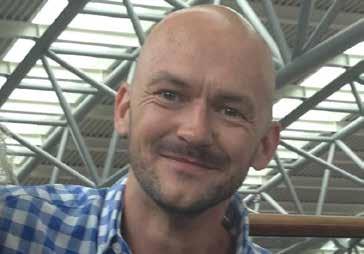
) I was to be a fashion designer. World famous, like Lagerfeld! I lay down on my bedroom floor, tip of the tongue clenched between teeth in concentration, and furiously drew and designed. Not just clothes but shoes and jewellery, and handbags to match, because without accessories, what’s the point of living? Or so I thought, aged 10. What boy even knows the words ‘fashion’ or ‘Lagerfeld’ at that age? Another ‘should’ve known then’ moment for sure, looking back. I apologise now, this is most certainly going to become a column packed to the fairy-light-wrapped rafters with stereotype after stereotype.
“Other usual queer careers, the prancer, the dancer or the hair stylist, were tempting, but not for me, as one must keep in mind what one gets in one’s gay starter pack when one first signs up”
Anyway. Two years later I was in a band, on the keyboard. Albeit briefly. All we ever did was draw pictures of us ‘being the band’, not actually pick up any instruments. Plus, two of my friends fell out over a playground incident involving a water bottle and a wet sandwich, and so the band that never really was, broke up.
Then at 14 I was moving to Hollywood Hills to be a plastic surgeon. I had seen Death Becomes Her, and had fallen in love with Meryl Streep, Goldie Hawn and all things Hollywood. There was glamour, and there was money to be made there.
Other usual queer careers, the prancer, the dancer or the hair stylist were tempting, but not for me, as one must keep in mind what one gets in one’s gay starter pack when one first signs up. In my gay starter pack, I got ‘flower arranging’, and ‘picking curtains that match the carpets that match the cushions’, but not ‘dancing’. And definitely not ‘doing hair’ either, as my friend Amy can attest to, following that day when we tried home-made highlights. Amy never liked the colour yellow after that.
“Two years later I was in a band, on the keyboard. Albeit briefly. All we ever did was draw pictures of us ‘being the band’, not actually pick up any instruments”
Still, a leopard has to stick to its spots, or used to, whatever colour they may be, and eventually you had to be sensible and become what you can. Funnily, I became neither florist nor interior designer – although both strong contenders, together with psychologist (like Frasier Crane) or lawyer (totally saw myself as Lucy Liu in Ally McBeal). No, I became a teacher, and for better or worse, that is what I still do and probably will to the day when I’m an old man in his sixties shaking a board marker at teenagers, waiting desperately for retirement. Or until I get a book deal out of this column, or the boyfriend wins the lottery with one of those pink tickets he’s always buying.
Of course, in these modern times, everyone can be who they want to be and do what they want to do. Read that news story of the straight rugby player who bumped his head and woke up a gay stylist? Anything is possible! Gay men can play football! Lesbians can colour hair! Just do you. And you know what? I’m all for it, because while I love a good stereotype, I love fighting one even better.
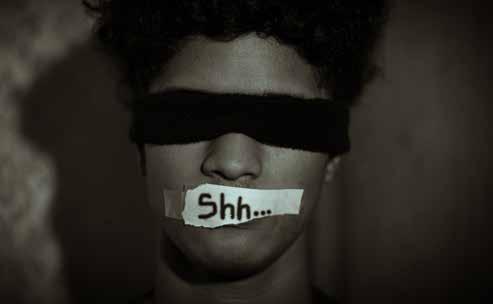
provided the opportunity for such development; your precious Pride would not even be on the radar.
We live in a time when our farming and fishing communities, not to mention all businesses in Northern Ireland, are just learning the limitations and challenges of our departing the EU and the agreements the government has signed up to as part of the exit ‘deal’. If dissatisfied, where is their democratic right to protest? Where is their voice?
By Craig Hanlon-Smith @craigscontinuum
) Much of the Brexit referendum, although not all, took several swipes at the immigration debate. This has continued apace since with mythological front-page stories about the so-called dinghy invasions and how our shores need to be protected from those landing on our Kent beaches. There are locals standing along the coast with binoculars as a 21st Century Dad’s Army although without any hint of humour.
Meanwhile, our apparent immigration restricting government has legally sanctioned mass immigration for Hong Kong residents fleeing an increasingly oppressive China, as it moves in to fully embrace the former city state as another province. The UK government has offered an open door on account of new security laws in Hong Kong and the disappearance of democracy at the hand of the Chinese state. But this piece is not about immigration.
I wonder how many of those Hong Kong residents seeking refuge in a newly welcoming United Kingdom are aware of our recent policing bill which passed its first reading in the House of Commons recently. A bill which will allow a more interventionalist approach to the policing of protests, if they are granted permits to take place at all.
The new bill makes special provision for the damage and defacing of property and the felling of statues, but also allows protests to be prevented by the police. Damage and public nuisance laws already exist, if the application of the law has not previously been enacted, that is a matter for the law enforcement agencies to reflect upon their own tactics. These laws already exist. So what is the point? These developments were considered necessary by the Home Office following the protests and marches of Extinction Rebellion and Black Lives Matter. The police described existing laws as tying their hands, particularly in relation to the climate change protests of Extinction Rebellion, which brought roads and public transport systems to a standstill. There was significant outcry at the Metropolitan Police’s handling of the events at Clapham Common a couple of weeks ago
following the murder of Sarah Everard, a murder it would appear at the hands of a police officer. The new policing bill would provide unquestionable legitimacy in law for the police to respond to all such events in this way in the future. In short, outcry all you want, it is now in the law for us to behave in a reactive and brutish manner.
New laws will allow the police to set noise limits, to provide prescriptive start and finish times and apply such rules to sole person demonstrations. The new bill establishes into criminal law restrictions protestors ought to have known about while clarity from police officers present at the event is not required. The new bill includes the new and vague offence of intentionally or recklessly causing a public nuisance but perhaps more worryingly grants the Home Secretary powers to amend the legislation without bringing the matter back to the elected Parliament.
“We have sanitised our contemporary Western events into glorified pop concerts with little heart and absolutely no soul”
Let us unpick this. First we should acknowledge that all you screamers who have been letting rip your excitement at the relaunch of Pride events this summer (premature if you ask me, but your health is your concern) would not be able to do so without the right to protest. The Pride Movement as we know it today began on June 28, 1969 when a black drag queen threw a brick through the window of a bar in New York City. Criminal damage because the queers fought back, they’d had enough. This was followed by years of angry, noisy protest marches in major cities around the world, including here in the UK. Protests which grew in size, grew in noise and morphed into Pride celebrations we take an automatic cultural advantage of and political disinterest in today. We have sanitised our contemporary Western events into glorified pop concerts with little heart and absolutely no soul. This was not always what we were. Pride today was a protest yesterday. This new legislation would not have
I am neither soliciting for nor suggesting the right to violent protest either with bricks through windows or the toppling of statues into rivers. The latter in the new bill will get you a prison sentence of up to 10 years when sentencing for rape starts at five. How is that not totally messed up? The government is rushing through this legislation during a global pandemic and while we are still living in lockdown with a roadmap out of it at least another three months ahead. This is not an accident, it is a deliberate strategy.
While we live under consistently shifting restrictions, the ideas suggested in this bill do not appear so ghastly and so the masses stay quiet. After all the law is there to protect us, right? Only two Conservative party voices dissented during the debate on this bill, one of them former Prime Minister and former Home Secretary Theresa May who raised concerns about the powers it grants the current and all future people in the latter role. Theresa May. She who was responsible for the ‘send them back’ trucks driving around our towns while David Cameron was PM, not to mention that, although Amber Rudd took the fall for the Windrush scandal, it was of Theresa May’s making. If Mrs May thinks this legislation is open to the abuse of power it is time to listen. She later voted for the bill to pass.
It will be forever disappointing to me that when Britney and Kylie came to Brighton Pride, neither one of them made reference to our fight, our struggle or even that without us, no one would know who they are. It took a drag queen to stand on that stage and throw a verbal brick into the audience by calling out our ever-increasingly Conservative political direction. Under this new legislation she may never be given the opportunity again, because Pride – the ‘cuddling up to Kylie’ business that it now is – will look after itself rather than encourage that kind of political debate or torch lighting.
And all those middle-class Brighton kids with your green hair and rainbow glittered faces stomping through town holding your ‘close the prisons’ paraphernalia above your privileged ignorant heads during the Black Lives Matter protests, I hope you enjoyed the ride because it looks as though that was your first and last time. Where are your voices now.
And to those members of the LGBTQ+ communities who proudly voted Conservative, shame upon you all.
Photography by Tom Selmon
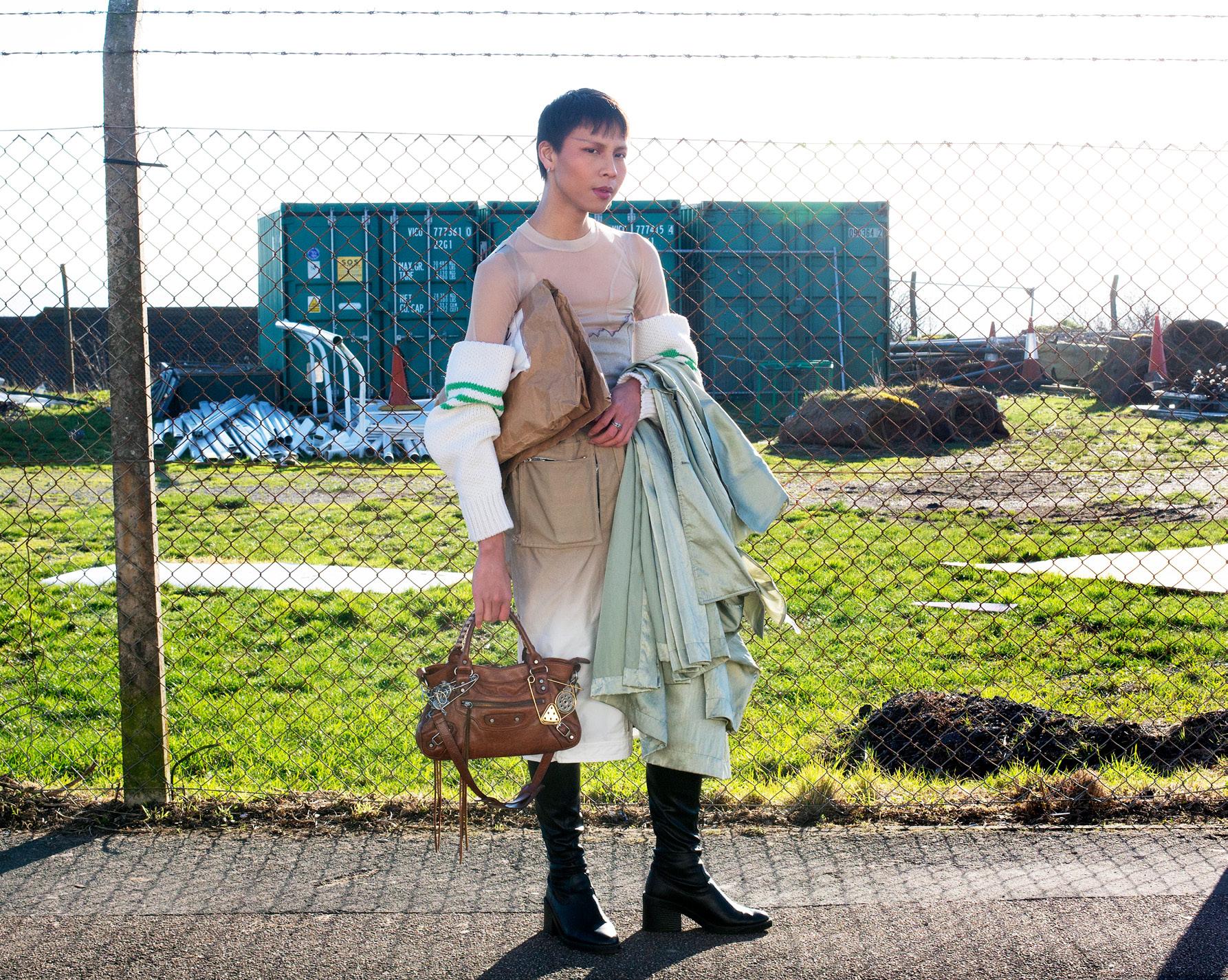
An. i www.instagram.com/phatbitch123/
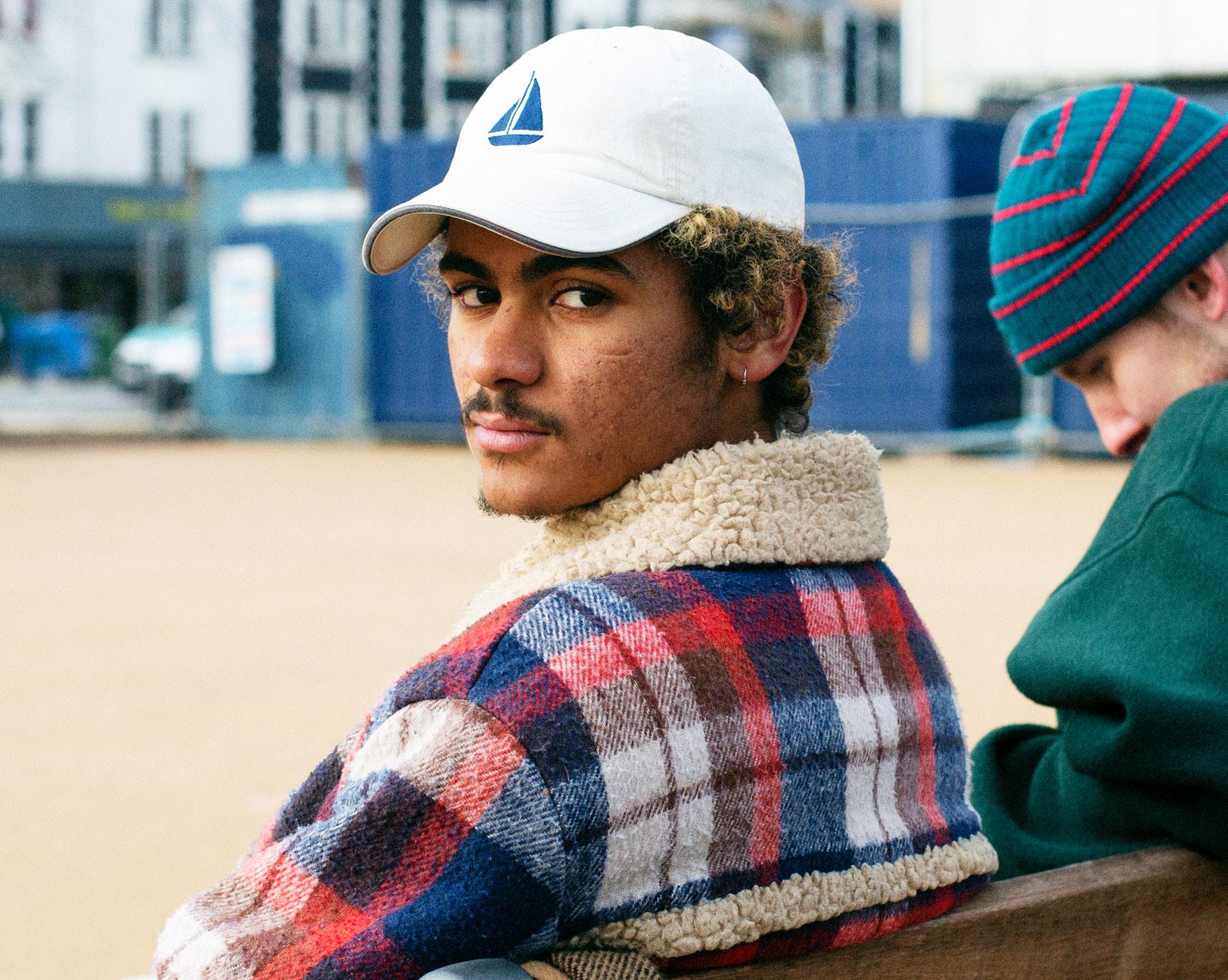
Joel i www.instagram.com/what_the_yoel/
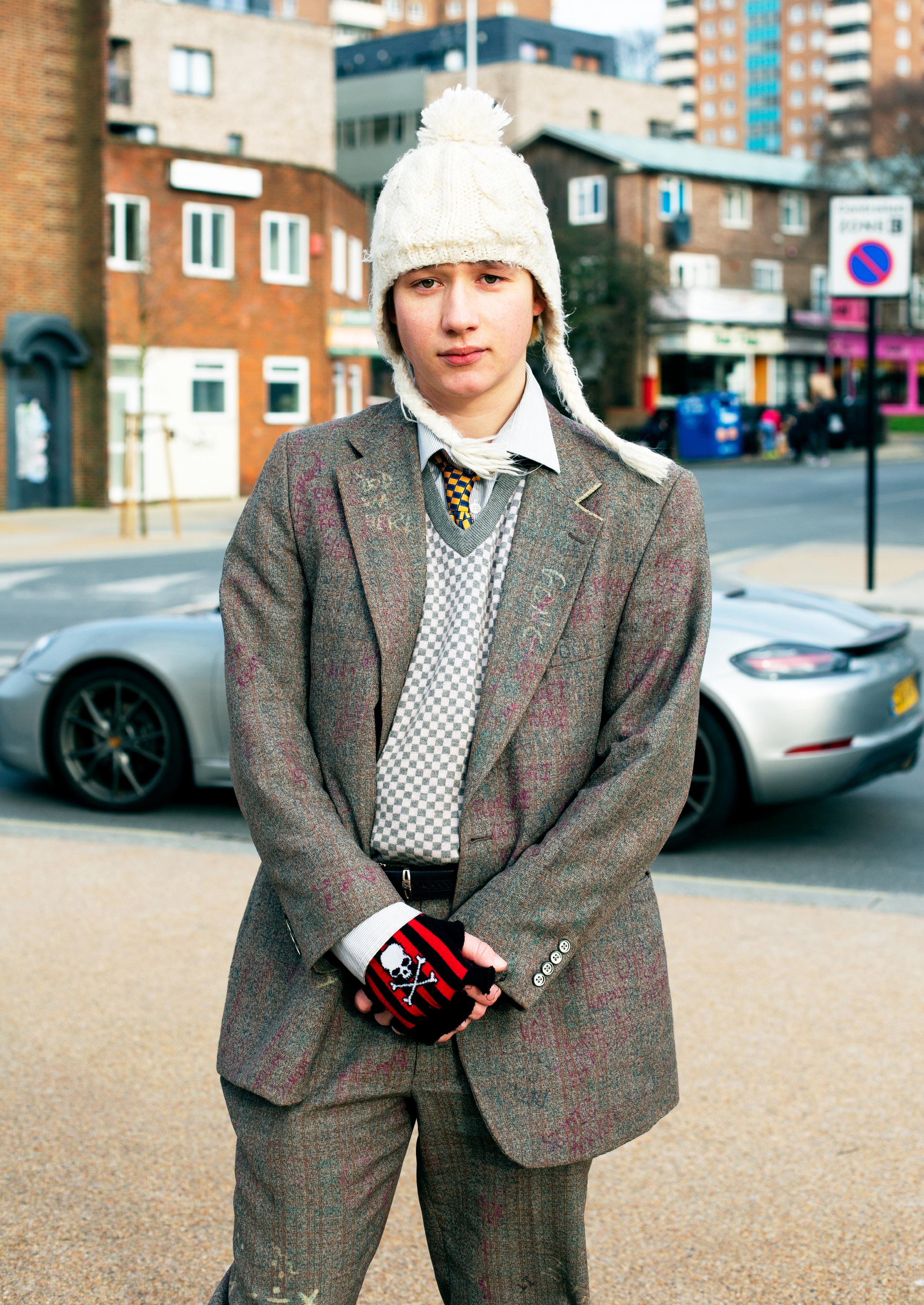
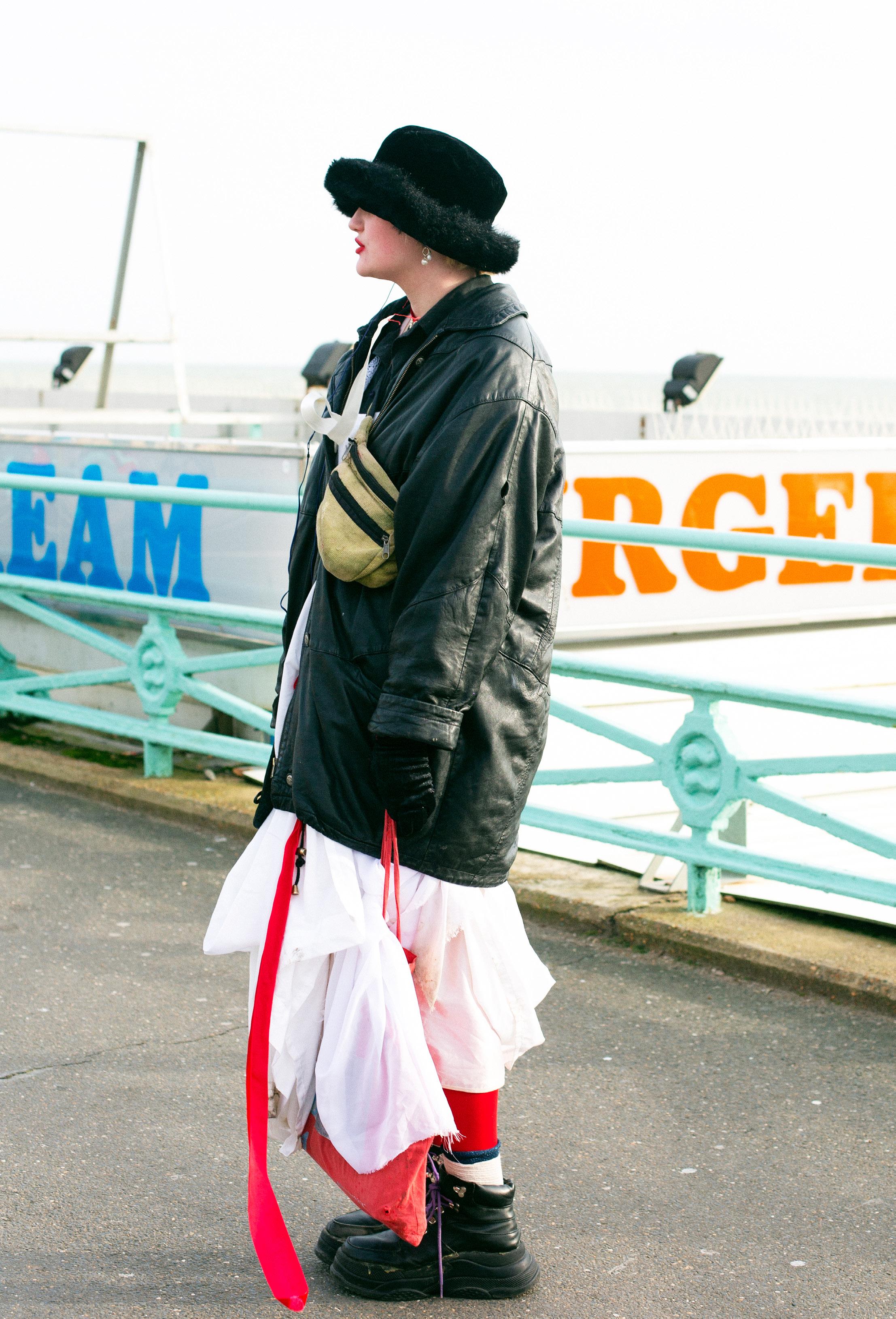
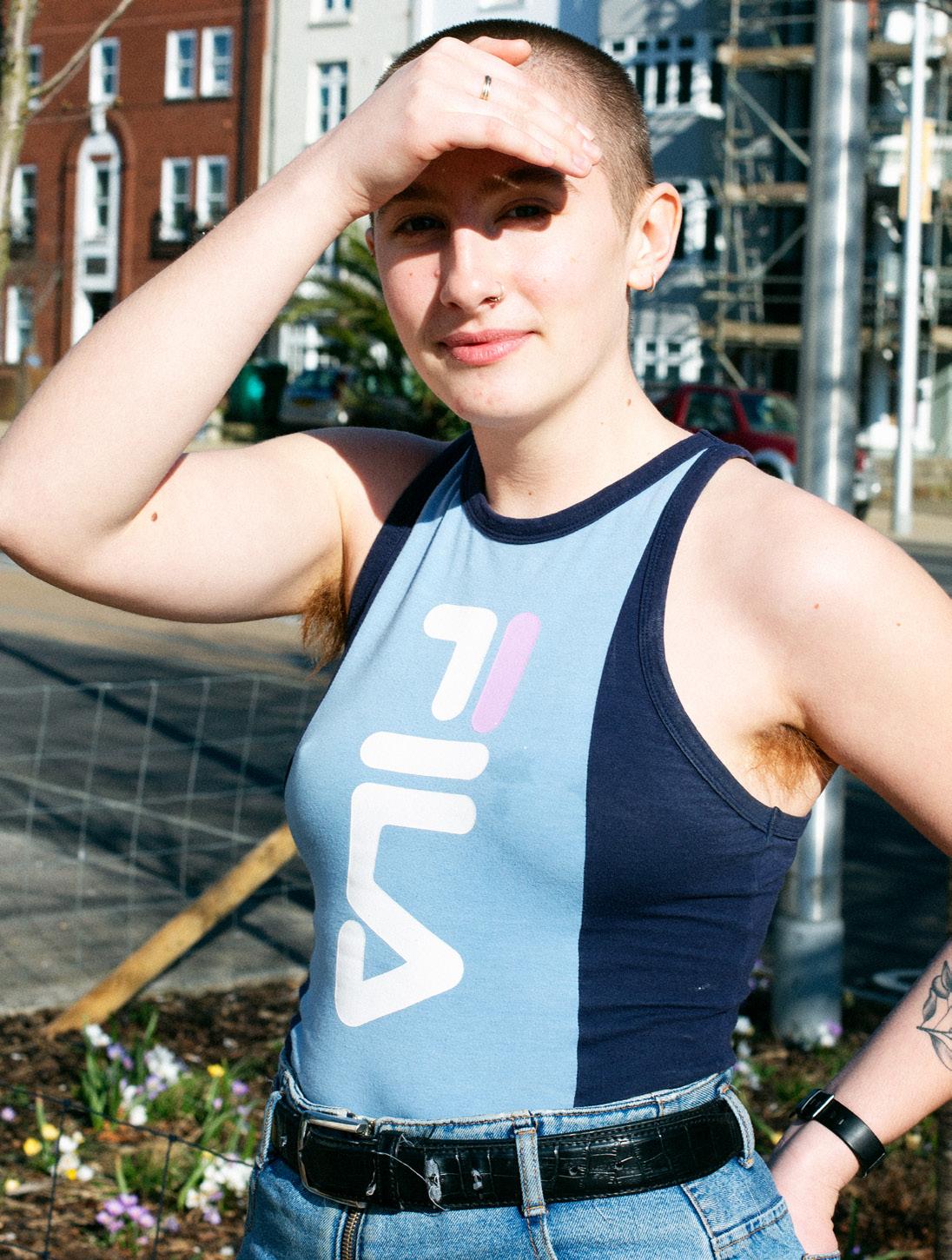
Polly i www.instagram.com/pollyelizaa/
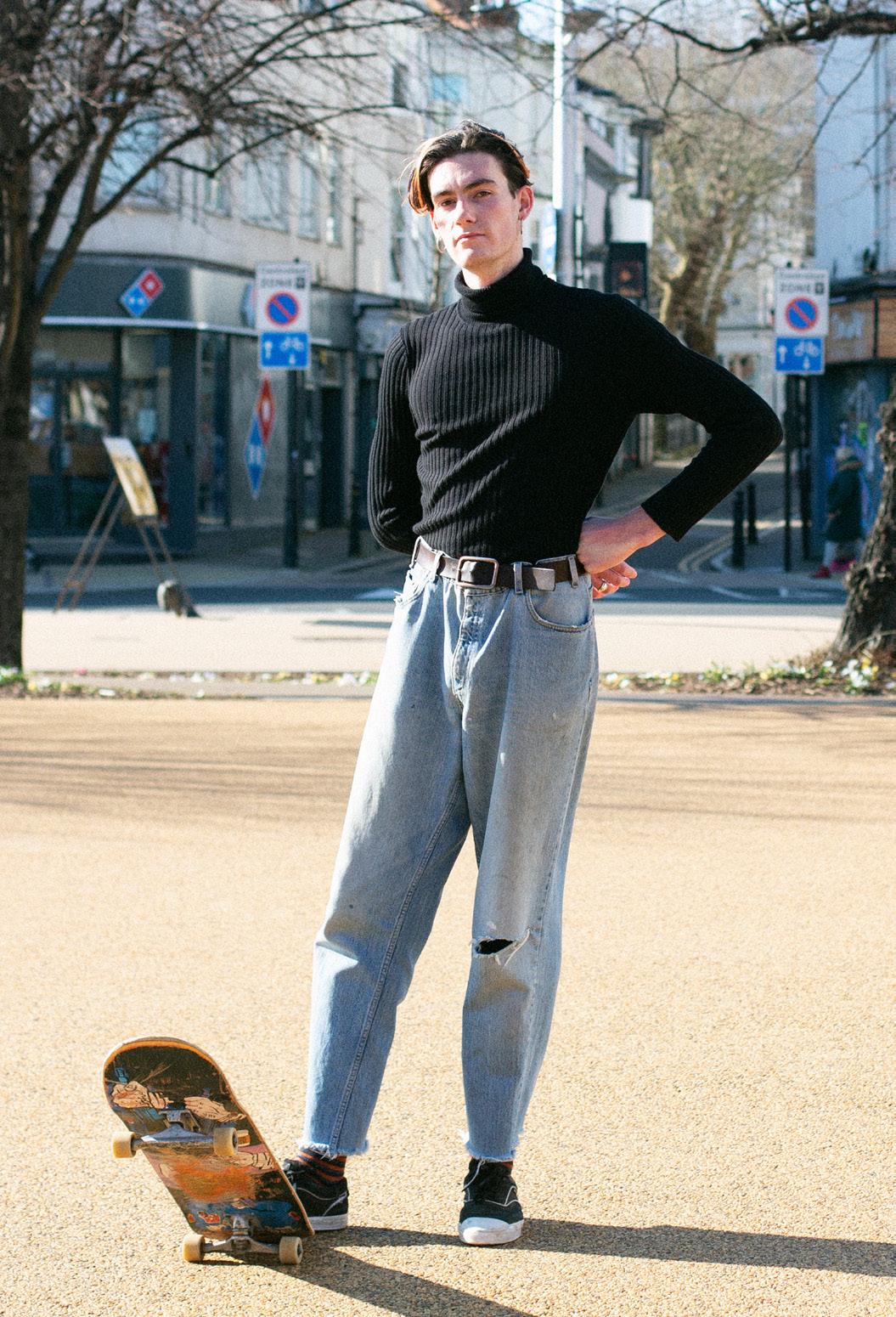
Rori. i www.instagram.com/duttyskank/
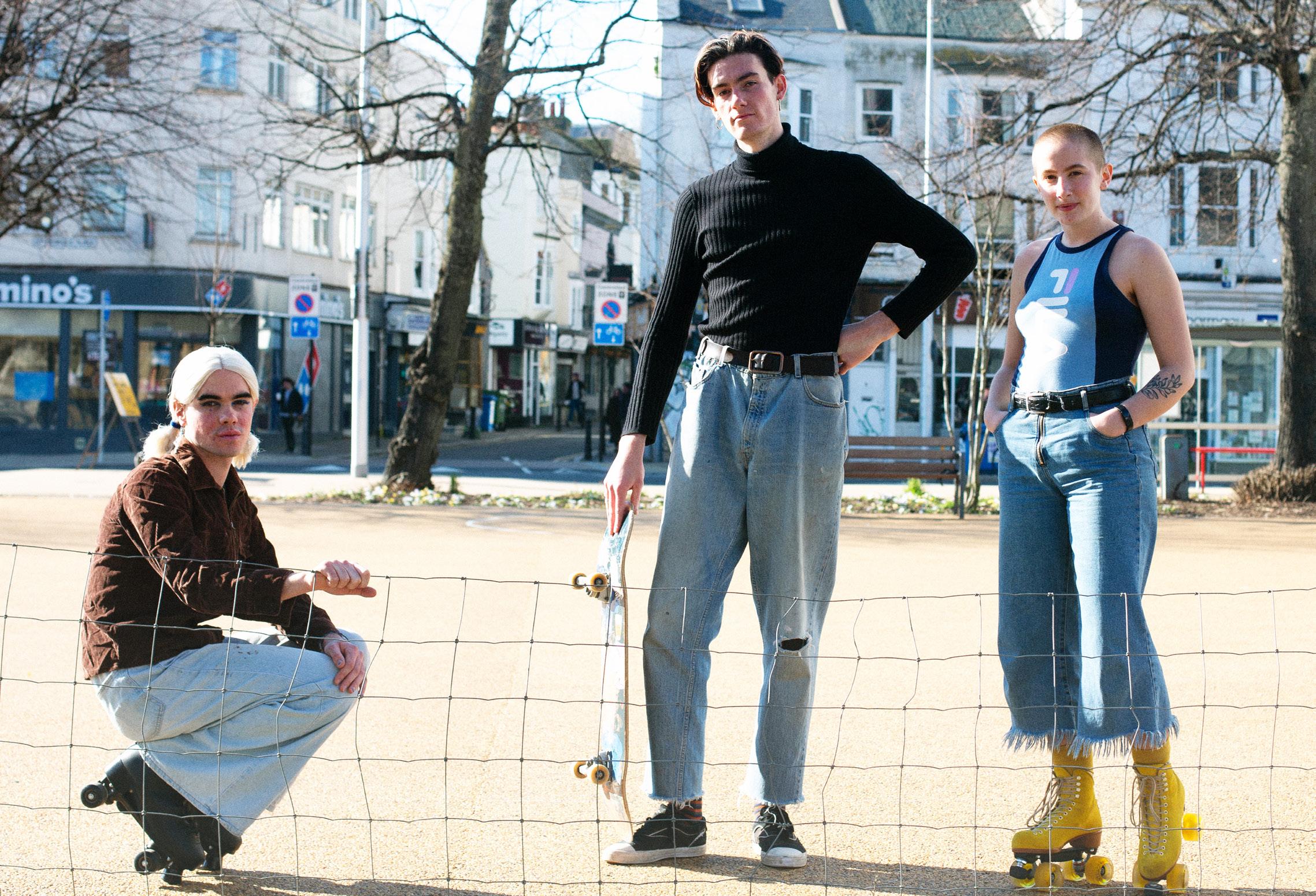
Harvey i www.instagram.com/harvey_frost/ ,
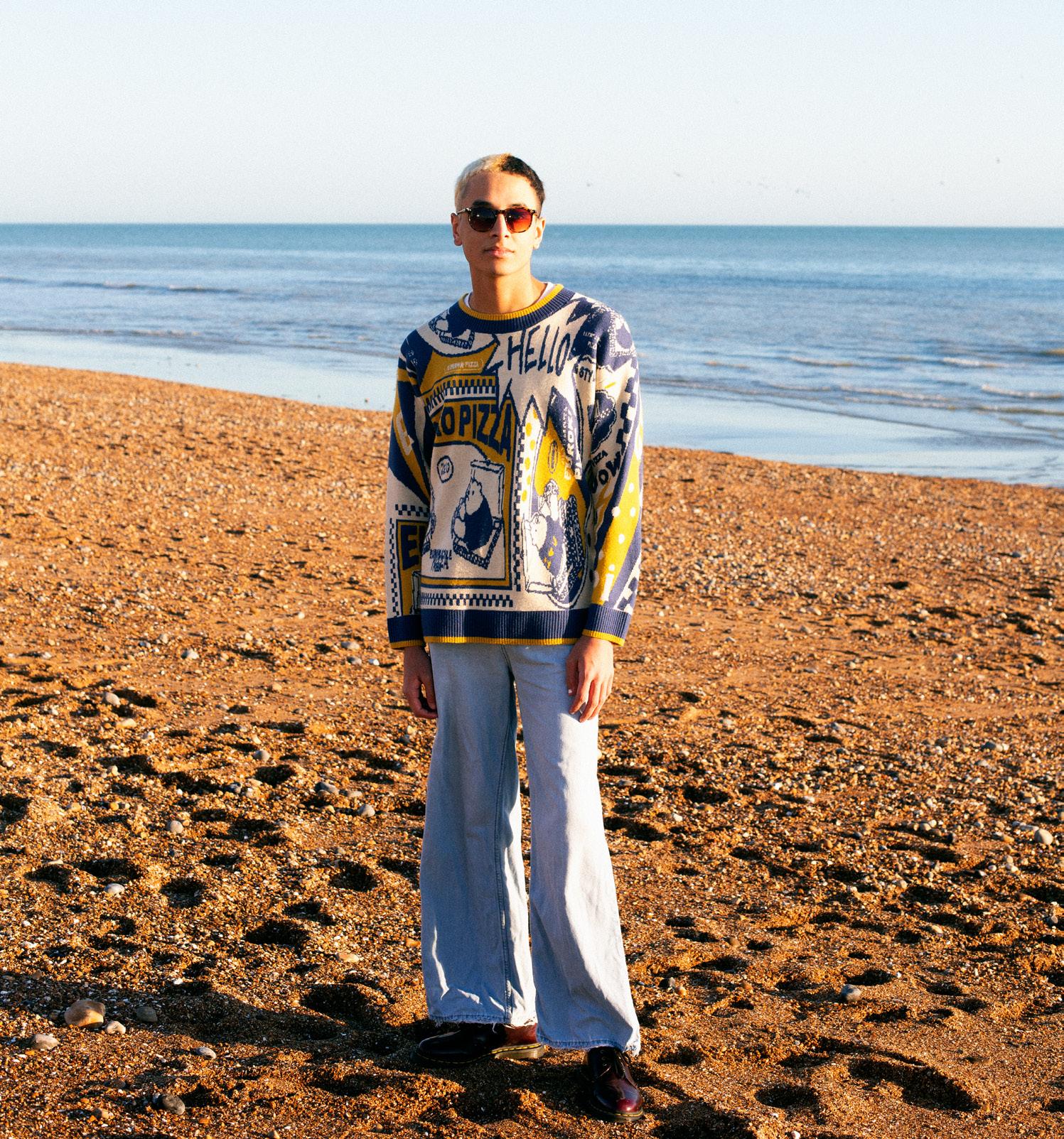
Joshua i www.instagram.com/itismejoshua_
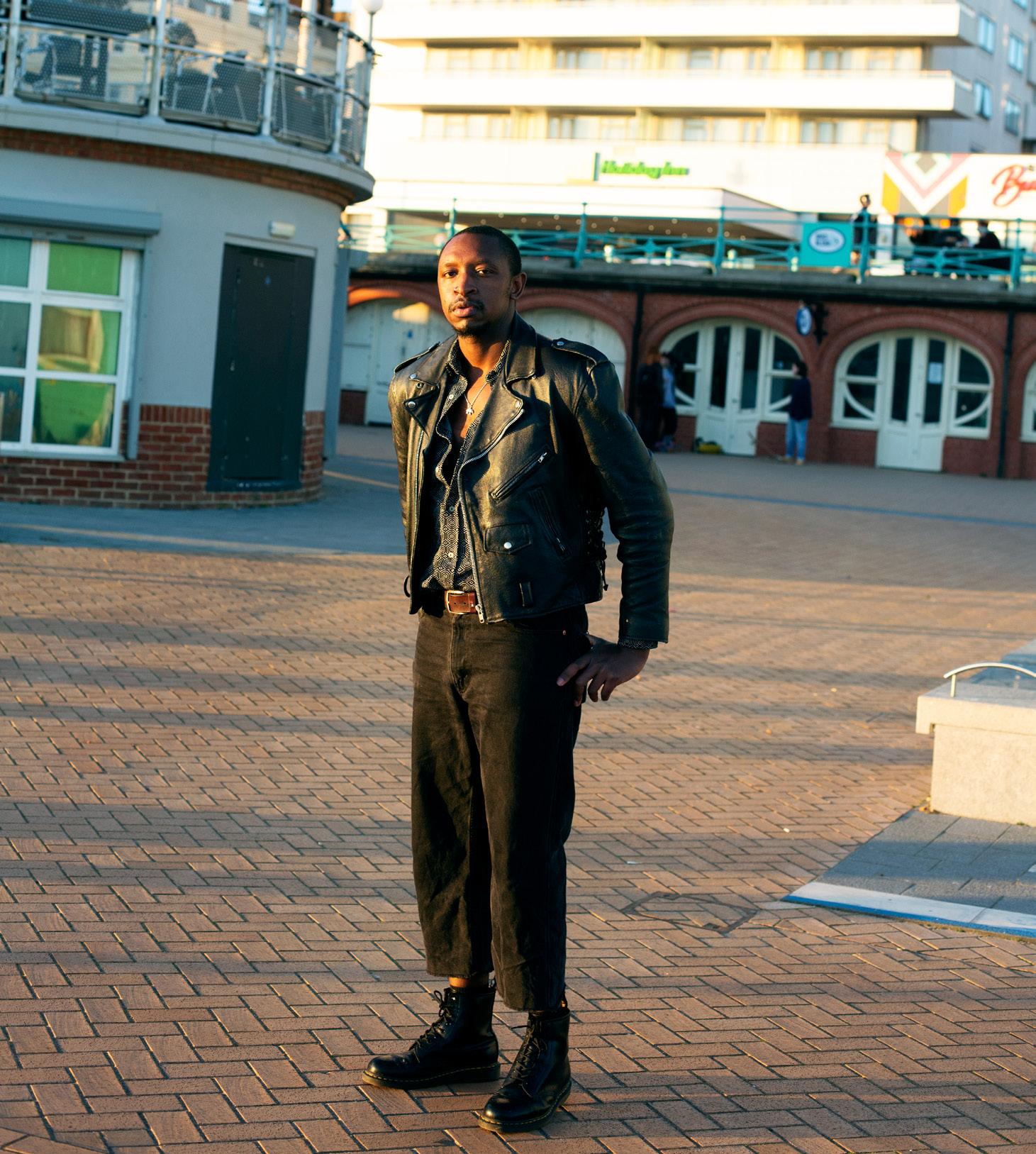
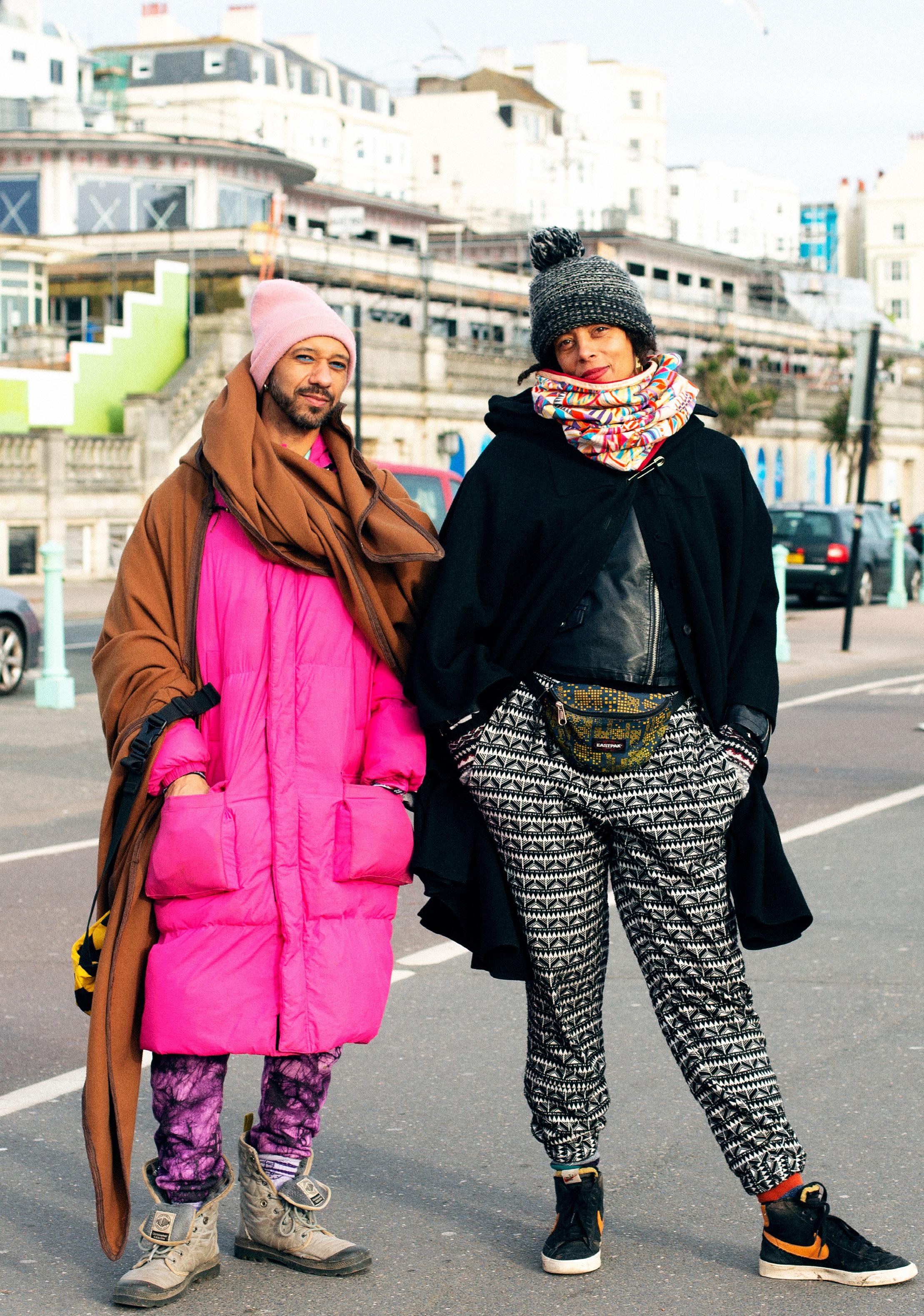
Tarik (L) i www.instagram.com/carnivalcatalyst/ Melanie (R) i www.instagram.com/melawella/
Gscene has been published every month for over 27 years, and is a rich chronicle of
the history of
our LGBTQ+ communities, in and around Brighton & Hove. Chris Gull raids the archives…
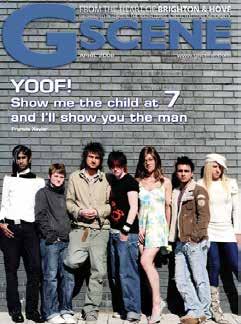
) So this month starts with a report on how us LGBTQ+ were represented on the BBC 16 years ago. Of course, then it wasn’t LGBTQ+, just ‘gays’. The April 2006 issue of Gscene was the ‘Yoof’ issue, with some interesting thoughts on how we as a community support young people coming on to the scene, and whether there are better gateways than bars and clubs?
GAYS INVISIBLE ON BBC?
) Gay people are almost invisible on the BBC’s flagship channels in spite of contributing £190 million a year to the BBC in TV licence fees, according to new research commissioned by Stonewall. A major monitoring exercise of 168 hours of primetime BBC 1 and BBC 2 found lesbian and gay lives realistically portrayed for just six minutes. A further 32 minutes of programming featured derogatory or offensive references to gay people. These came from a range of programmes including The Weakest Link and The Lenny Henry Show
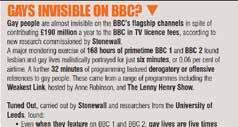
Tuned Out, carried out by Stonewall and researchers from the University of Leeds, found:
• Even when they feature on BBC 1 and BBC 2, gay lives are five times more likely to be portrayed negatively than positively
• Lesbians hardly feature in BBC programming at all
• More than 50% of all references to gay
people on the BBC were as jokes
• Gay people living in stable relationships with partners and families are invisible on the BBC – most of the images used are clichés and stereotypes
• Lesbian and gay issues are rarely tackled or even mentioned in factual programmes
• Gay sexuality is frequently used as an insult, with almost no evidence of the BBC challenging homophobia when it arises
The report suggests eight key recommendations to the BBC. These include provision of urgently-needed balanced and unsensational coverage in its news and current affairs programmes, developing authentic gay characters throughout drama and soap outputs and including 6% of gay contestants in game shows, reflecting the wider British population.
GAY YOUTH CORNER
Hamish Priest runs www.thegyc.com
) What is The GYC? The Gay Youth Corner is a website for young people all over the world, providing them with a place to chat, meet, discuss issues and get advice on all aspects of life.
So how did this queer take on chat come about, and how’s the communication flowing? The GYC was formed just over one year ago and it’s now currently run with the help of over 25 voluntary staff worldwide. Our work has certainly been successful, although there is still much left to be done.
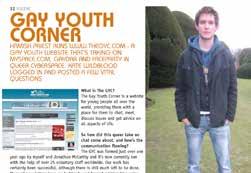
So what do you feel are the concerns of gay youth today? At least on The GYC, and since sexuality obviously entails sex, relationships are a strong concern for gay youth. For the even younger people, actually trying to define their sexuality is a prime concern. And following this is coming out, although a lot of these things sometimes entail depression, homophobia and a lack of confidence.
How could the connection between LGBT youth and the general LGBT community be improved? That’s a tricky question; because for a youth to be able to connect with the LGBT community in the first place, they may feel they should first come out to themselves and those around them. Although it is not
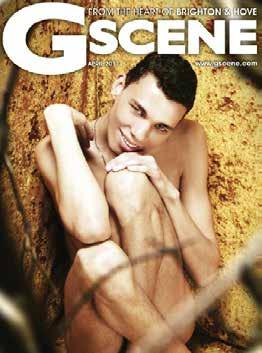
a necessary condition, it does seem like a reasonable and common prerequisite. Places like The GYC are particularly helpful at this stage, because it does not assume that its visitors are LGB or T. It allows for the process of definition and discussion. So, once a gay youth is out and thus confident to connect with the LGBT community, it is an important time for LGBT youth groups to step in. The most obvious place where a gay youth is likely to go to for their first experience with the community is the gay bar and club scene, which is quite understandable. However, it is not the best place to have one’s first experience as a young queer person within a queer community, especially when the person is under the legal drinking age.
) Moving forward to ten years ago, MindOut achieved a famous victory in gaining independence from MIND. The rest is history. What was also an historic moment was The Bulldog moving forward from the review of its licence and the decisions of the council´s licensing panel, by appealing to the city magistrates, along with the police, and coming to an agreement.
) MindOut, the LGBT mental health project, has gained its independence and become a separate registered charity. On April 6, the project moves out of the local MIND offices and sets up at Community Base in Queens Road with Helen Jones leading the team. The Big Lottery Fund and the PCT have agreed that their funds be redirected to the new project and MIND will pass over to the new project the staff and the valuable reserves that MindOut had built up. The project has
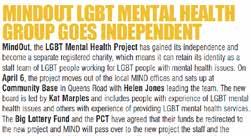
sufficient funding for the year and during that time it will be seeking new sources of funding to continue its work. MindOut’s identity was threatened last summer when its parent body, MIND in Brighton & Hove, decided to split up the team and integrate their work with other services as part of a reorganisation plan. The loss of its identity as a team of LGBT people working for LGBT people was regarded by service users and staff as fatal to the project in the longer term. The response from service users and the wider LGBT communities was swift and impressive with interventions, both public and behind-the-scenes, from local LGBT community leaders.
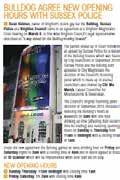
) Dean Holmes, owner of Brighton’s oldest gay bar, the Bulldog, Sussex Police and Brighton Council came to an agreement at a Brighton Magistrates Court hearing on March 8, to find what Brighton Council’s legal representative described as “a way ahead for the Bulldog moving forward”. The parties ended up in Court following an appeal by Sussex Police for a review of the Bulldog licence, which was heard by city councillors in September 2015. Sussex Police and the Bulldog both appealed to City Magistrates the decision of the Council’s licensing panel, which is made up of elected councillors and chaired by Cllr Mo Marsh, Labour Councillor for Moulsecoomb & Bevendean.
The Council’s original licensing panel decision of September 2015 included reducing the Bulldog’s hours at weekends till 2am with one hour drinking up time (affecting their busiest time for trading) and reducing opening hours on Sunday to Thursday from 11am to midnight with a closing time of 1am.
Under the new agreement the Bulldog gained an extra drinking hour on Friday and Saturday nights to 3am with a closing time of 4am and in return agreed to install an ID scanner which will be implemented when door staff are on duty.
) Five years ago, the community paid tribute to Chris Cooke, and BLAGSS attracted 25 teams to their annual fundraising extravaganza.
CHRIS COOKE 18.1.68–22.2.16
) Community activist Christopher Martyn Cooke died in February following a fire at Essex Place in Kemptown where he lived. Chris, a proud activist, was a very decent man. He loved nothing better than seeing practical and positive improvements to St James’ Street and Kemptown, especially if it was achieved after he had fought on
behalf of others who had decided something was needed to improve the area. He would fight for a project to succeed no matter where in the community the suggestion had originated. Chris trusted everybody, he listened to people’s concerns and for someone who stood for election as a local councillor, was one of the most apolitical figures you would encounter in public lif0e locally. Up until a couple of years ago he was most involved with the St James’ Community Action Group (SJCAG) as probably the leading founder member and its first chairperson. He was proud of what SJCAG achieved during its first year and was devastated when a small section of the business members organised his replacement. Since his removal, St James’ Street has suffered from his lack of leadership and the SJCAG has lost credibility as an effective community organisation.
For a while Chris was responsible for Kemptown in Bloom and hopefully his recent efforts to revitalise this group will continue and be a fitting tribute to his activities and enthusiasm. Chris chaired the Eastern Road Partnership when it was a vibrant and active association and a keen supporter of the Gay Business Forum. He worked tirelessly on neighbourhood and community policing and was involved with the Friends of Queen’s Park. He chaired the fundraising committee of the Rainbow Fund, an organisation which makes grants to LGBT organisations providing effective front line services to LGBT people in Brighton & Hove, and for a while was community correspondent for The Argus. He was also chair of the Brighton & Hove LGBT Community Safety Forum up until 2012, was financial director at the Sussex Beacon between 2011-12 and more recently was an LGBT community rep at Community Works.
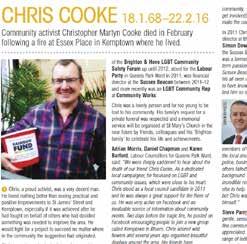
James Ledward, reflecting on the work Chris delivered for the St James’ Street and Kemptown, communities, said: “Community activists are sometimes misunderstood because people just don’t understand why they selflessly volunteer so much of their time to helping others in their local community. It was painful to watch Chris lose confidence following being removed as chair of the SJCAG in February 2014 by a group of business people who would not understand a community issue if it jumped up and bit
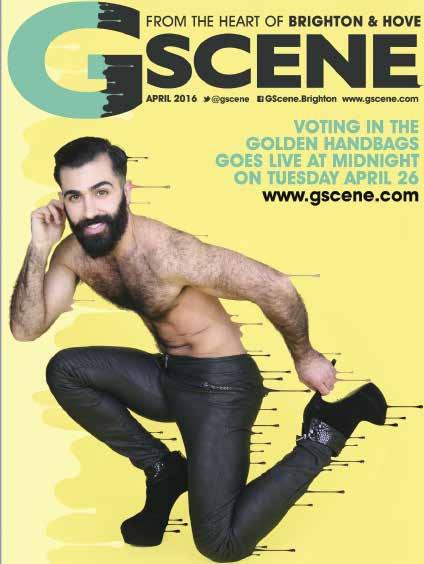
them on the nose. When he chaired the local action group, St James’ Street was vibrant and safe, which will be his lasting legacy. Sadly it no longer is.” On his Facebook page, Chris listed his favourite quote as: “We are all in the gutter, but some of us are looking at the stars.” Through his community work, Chris made people’s lives better and in doing so sometimes forgot it was important to look after and love himself.”
) The annual BLAGSS ten-pin bowling tournament attracted 25 teams this year with the Camelford Arms coming out as overall champions. Top male bowler was Damian from Out to Swim with Paul from Bear-Patrol the runner up. £157.27 was raised for BLAGSS’ charity of the year, MindOut, the LGBT mental health project. It was great to see the Bulldog Bummers appearing for the first time who, along with Camelford Arms, New Steine Hotel and Gscene, were the only LGBT businesses present. The three main community choirs were in attendance along with community groups as diverse as Rainbow Families, Blue Print 22, GEMS, the group for older gay men who came a creditable 7th, and an LGBTQ mental health support group from Shoreham. Well done to everyone for supporting an important community event.
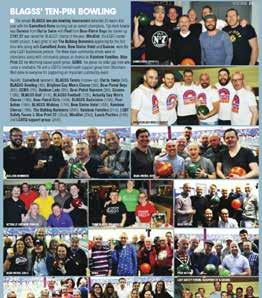
BY LAURIE LAVENDER
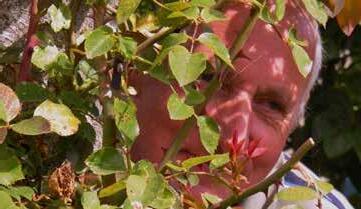
) Well I have been very busy up the allotment recently, I have bought another water butt to put beside the shed to help catch rainwater and have organised my ‘outdoor work station’ with the help of King Weed Donald and a very nice man who said I could take his pallets.

I have been planting flowers to attract bees and also dug up a bumper crop of Jerusalem artichokes, great for soups and casseroles (and also good for maintaining social distancing!).

In the veggie department, we’ve cabbages coming through, lettuces under a small plastic tunnel, and broad beans showing. We have planted our early crop of potatoes and have invested in some hazel bean sticks.



In the fruity field we have rhubarb showing and some shoots on the raspberry canes.
I have also ordered a new cold frame which is being made and delivered in a few weeks, hopefully I will have a picture for you next month!
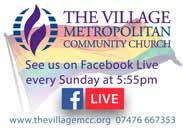



While every effort has been made to ensure the accuracy of statements in this magazine we cannot accept responsibility for the views of contributors, errors, or ommisions, or for matters arising from clerical or printers errors, or an advertiser not completing a contract
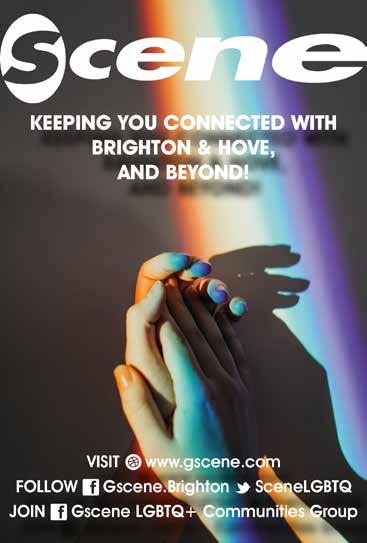
l Allsorts Youth Project
Drop-in for LGBT or unsure young people under 26 Tues 5.30–8.30pm 01273 721211 or email info@ allsortsyouth.org.uk www.allsortsyouth.org.uk
l Brighton & Hove Police
Report all homophobic, biphobic or transphobic incidents to: 24/7 assistance call Police on 101 (emergencies 999) Report online at: www.sussex.police.uk LGBT team (not 24/7) email: LGBT@sussex.pnn.police.uk
• LGBT Officer PC James Breeds: Tel: 101 ext 558168 James.breeds@sussex.pnn.police.uk
l Brighton & Hove LGBT Safety Forum
Independent LGBT forum working within the communities to address and improve safety and access issues in Brighton & Hove. For more info: 01273 675445 or admin@lgbt-help.com or www.lgbt-help.com
l Brighton & Hove LGBT Switchboard
• LGBT Older People’s Project
• LGBT Health Improvement and Engagement Project
• LGBTQ Disabilities Project
• Rainbow Café: support for LGBT+ people with Dementia
• Volunteering opportunities 01273 234 009
Helpline hours: Wed & Thur, 7–9.30pm; trans-only webchat on Sun 3–5pm: call 01273 204 050 email info@switchboard.org.uk webchat www.switchboard.org.uk/helpline www.switchboard.org.uk/brighton
l Brighton OneBodyOneFaith
Formerly The Gay Christian Movement. Contact: Nigel Nash nigelnash@me.com. www.onebodyonefaith.org.uk
l Brighton Women’s Centre
Info, counselling, drop-in space, support groups 01273 698036 or visit www.womenscentre.org.uk
l Lesbian & Gay AA
12-step self-help programme for alcohol addictions: Sun, 7.30pm, Chapel Royal, North St, Btn (side entrance). 01273 203 343 (general AA line)
l LGBTQ+ Cocaine Anonymous
Meeting every Tues 6.30-8pm, 6 Tilbury Pl, Brighton, BN2 0GY, CA isn’t allied with any outside organisation, and neither endorses or opposes any causes. Helpline 0800 6120225, www.cocaineanonymous.org.uk www.sussexcocaineanonymous.co.uk
l LGBTQ+ NA Group
Brighton-based LGBTQ+ (welcomes others) Narcotics Anonymous group every Tue 6.30–8pm, Millwood Centre, Nelson Row, Kingswood St. 0300 999 1212
l LGBT+ Meditation Group
Meditation & discussion, every 2nd & 4th Thur, 5.30–7pm, Anahata Clinic, 119 Edward St, Brighton. 07789 861 367 or www.bodhitreebrighton.org.uk
l Lunch Positive
Lunch club for people with HIV. Meet/make friends, find peer support in safe space. Every Fri, noon–2.30pm, Community Room, Dorset Gdns Methodist Church, Dorset Gdns, Brighton. Lunch £1.50. 07846 464 384 or www.lunchpositive.org
l MCC Brighton
Inclusive, affirming space where all are invited to come as they are to explore their spirituality without judgement. 01273 515572 or info@mccbrighton.org.uk www.mccbrighton.org.uk
l Mindout
Independent, impartial services run by and for LGBTQ people with experience of mental health issues. 24 hr confidential answerphone: 01273 234839 or email info@ mindout.org.uk and out of hours online chat www.mindout.org.uk
l Navigate
Social/peer support group for FTM, transmasculine & gender queer people, every 1st Wed 7-9pm & 3rd Sat of month 1-3pm at Space for Change, Windlesham Venue, BN1 3AH. https://navigatebrighton.wordpress.com/
l Peer Action
Regular low cost yoga, therapies, swimming, meditation & social groups for people with HIV. contact@peeraction. net or www.peeraction.net
l Rainbow Families
Support group for lesbian and/or gay parents 07951 082013 or info@rainbowfamilies.org.uk. www.rainbowfamilies.org.uk
l Rainbow Hub
Information, contact, help and guidance to services for LGBT+ communities in Brighton, Hove and Sussex at Rainbow Hub drop in LGBT+ one-stop shop: 93 St James Street, BN2 1TP, 01273 675445 or visit www.therainbowhubbrighton.com
l Some People
Social/support group for LGB or questioning aged 14-19, Tue 5.30-7.30pm, Hastings. Call/text Cathrine Connelly 0797 3255076 or email somepeople@eastsussex.gov.uk
l TAGS – The Arun Gay Society
Social Group welcome all in East & West Sussex Areas. Call/Text 07539 513171. More info: www.tagsonline.org. uk
l Victim Support
Practical, emotional support for victims of crime 08453 899 528
l The Village MCC
Christian church serving the LGBTQ community. Sundays 6pm, Somerset Day Centre, Kemptown. More info: 07476 667353, www.thevillagemcc.org
l AVERT
Sussex HIV & AIDS info service 01403 210202 or confidential@avert.org
l Brighton & Hove CAB HIV Project Money, benefits, employment, housing, info, advocacy. Appointments: Tue-Thur 9am-4pm, Wed 9am-12.30pm Brighton & Hove Citizens Advice Bureau, Brighton Town Hall. 01273 733390 ext 520 or www.brightonhovecab.org.uk
l Clinic M
Free confidential testing & treatment for STIs including HIV, plus Hep A & B vaccinations. Claude Nicol Centre, Sussex County Hospital, on Weds from 5-8pm. 01273 664 721 or www.brightonsexualhealth.com
l Lawson Unit
Medical advice, treatment for HIV+, specialist clinics, diet & welfare advice, drug trials. 01273 664 722
l Martin Fisher Foundation
HIV self-testing kits via digital vending machines available from: The Brighton Sauna, Prowler, Marlborough Pub and The Rainbow Hub. www.martinfisherfoundation.org
l Substance Misuse Service
Brighton & Hove: Change Grow Live: 01273 731900, email brighton.info@cgl.org.uk, visit: www. changegrowlive.org/brighton-hove-recovery-service/
info
l Sussex Beacon
24 hour nursing & medical care, day care 01273 694222 or www.sussexbeacon.org.uk
l Terrence Higgins Trust services
For more info about these free services go to the THT office, 61 Ship St, Brighton, Mon–Fri, 10am–5pm 01273 764200 or info.brighton@tht.org.uk
• Venue Outreach: info on HIV, sexual health, personal safety, safer drug/alcohol use, free condoms/lubricant for men who have sex with men
• The Bushes Outreach Service @ Dukes Mound: advice, support, info on HIV & sexual health, and free condoms & lube
• Netreach (online/mobile app outreach in Brighton & Hove): info/advice on HIV/sexual health/local services. THT Brighton Outreach workers online on Grindr, Scruff, & Squirt
• Condom Male: discreet, confidential service posts free condoms/lube/sexual health info to men who have sex with men without access to East Sussex commercial gay scene
• Positive Voices: volunteers who go to organisations to talk about personal experiences of living with HIV
• Fastest (HIV testing): walk-in, (no appointment) rapid HIV testing service open to MSM (Men who have sex with Men). Anyone from the African communities, male and female sex workers and anyone who identifies as Trans or non-binary. We now offer rapid 15 minutes results for HIV/Syphilis: Mon 10am-8pm, Tues-Fri 10am-5pm, Thurs 10am-8pm (STI testing available)
• Sauna Fastest at The Brighton Sauna (HIV testing): walk-in, (no appointment) rapid HIV testing service for men who have sex with men, results in 20 minutes: Wed: 6–8pm (STI testing available)
• Face2Face: confidential info & advice on sexual health & HIV for men who have sex with men, up to 6 one hour appointments
• Specialist Training: wide range of courses for groups/ individuals, specific courses to suit needs
• Counselling: from qualified counsellors for up to 12 sessions for people living with/affected by HIV
• What Next? Thurs eve, 6 week peer support group work programme for newly diagnosed HIV+ gay men
• HIV Support Services: info, support & practical advice for people living with/affected by HIV
• HIV Welfare Rights Advice: Find out about benefits or benefit changes. Advice line: Tue–Thur 1:302:30pm. 1-2-1 appts for advice & workshops on key benefits
l Terrence Higgins Eastbourne
• Web support & info on HIV, sexual health & local services via netreach and www.myhiv.org.uk
• Free condom postal service contact Grace Coughlan on 07584086590 or grace.coughlan@tht.org.uk
l Sexual Health Worthing
Free confidential tests & treatment for STIs inc HIVA; Hep vaccinations. Worthing-based 0845 111345645
l National LGBT Domestic Abuse
Helpline at www.galop.org.uk and 0800 999 5428
l Switchboard 0300 330 0630
l Positiveline (Eddie Surman Trust)
Mon-Fri 11am-10pm, Sat & Sun 4-10pm 0800 1696806
l Mainliners 02075 825226
l National AIDS Helpline 08005 67123
l National Drugs Helpline 08007 76600
l THT AIDS Treatment phoneline 08459 470047
l THT direct 0845 1221200
1 Affinity Bar
129 St James’s St, www.affinitygaybar.co.uk
2 Amsterdam Bar & Kitchen 11-12 Marine Parade, 01273 688 826 www.amsterdambrighton.com
3 Bar Broadway 10 Steine Street, 01273 609777 www.barbroadway.co.uk
4 Bedford Tavern 30 Western Street, 01273 739495
5 All New Bulldog 31 St James St, 01273 696996
6 Camelford Arms 30-31 Camelford St, 01273 622386 www.camelford-arms.co.uk
7 Charles Street Tap 8-9 Marine Parade, 01273 624091 www.charles-street.com
8 Fallen Angel 24 Grafton St, 07949590001
9 Giu & Su Café & Wine Bar
2 Church St, BN1 1UJ
10 Grosvenor Bar
16 Western Street, 01273 438587
11 Legends Bar 31-34 Marine Parade, 01273 624462 www.legendsbrighton.com
12 Marine Tavern 13 Broad St, 01273 681284 www.marinetavern.co.uk
13 Nautilus Lounge 129 St James’s St, 01273 624100
www.nautiluslounge.com
14 Paris House 21 Western Road, 01273 724195 www.parishouse.com
15 Queen’s Arms 7 George St, 01273 696873 www.theqabrighton.com
16 Railway Club 4 Belmont, Dyke Rd, 01273 328682
17 Regency Tavern 32-34 Russell Sq, 01273 325 652
18 Three Jolly Butchers 59 North Rd, 01273 608571 www.three-jolly-butchers.co.uk
19 Velvet Jacks 50 Norfolk Square, 07720 661290 http://tinyurl.com/VelvetJacks
20 Lé Village 2-3 High Street, 01273 681634
21 Zone 33 St James’s St, 01273 682249 www.zonebrighton.co.uk
) Clubs
11 Basement Club (below Legends) 31-34 Marine Parade, 01273 624462 www.legendsbrighton.com
7 Envy (above Charles St Tap) 8-9 Marine Parade, 01273 624091 www.charles-street.com
) Food
2 Amsterdam Bar & Kitchen 11-12 Marine Parade, 01273 688 826 www.amsterdambrighton.com
6 Camelford Arms 30-31 Camelford St, 01273 622386 www.camelford-arms.co.uk
7 Charles Street Tap 8-9 Marine Parade, 01273 624091 www.charles-street.com
23 Cup of Joe 28 St George’s Rd, 01273 698873 www.cupofjoebrighton.co.uk
9 Giu & Su Café & Wine Bar
2 Church St, BN1 1UJ
11 Legends Bar 31-34 Marine Parade, 01273 624462 www.legendsbrighton.com
12 Marine Tavern 13 Broad St, 01273 681284 www.marinetavern.co.uk
24 New Steine Bistro 12a New Steine, 01273 681546 www.newsteinehotel.com
Lé Village 2-3 High Street, 01273 681634
Gullivers Hotel 12a New Steine, 01273 695415 www.gullivershotel.com
26 Hilton Brighton Metropole 1 Kings Rd, 01273 775 432 www.hilton.com
11 Legends Hotel 31-34 Marine Parade, 01273 624462 www.legendsbrighton.com
24 New Steine Bistro 12a New Steine, 01273 681546 www.newsteinehotel.com
27 Queens Hotel 1/3 Kings Rd, 01273 321222 www.queenshotelbrighton.com
) Health & Beauty
28 Barber Blacksheep 18 St Georges Rd, 01273 623408 wwww.barberblacksheep.com
29 Dental Health Spa 14–15 Queens Rd, 01273 710831 www.dentalhealthspa.co.uk
30 Velvet Tattoo 50 Norfolk Square, 07720 661290 http://tinyurl.com/VelvetJacks
) Sexual Health
31 Clinic M Claude Nicol Abbey Rd, 01273 664721 www.brightonsexualhealth.com/node/11
32 THT Brighton 61 Ship St, 01273 764200
) Saunas
33 Brighton Sauna 75 Grand Parade, 01273 689966 www.thebrightonsauna.com
) Shops
34 Prowler 112 St James’ St, 01273 683680
35 Sussex Beacon Charity Shop
130 St James’s St, 01273 682992
36 Sussex Beacon Home Store 72-73 London Rd, 01273 680264 www.sussexbeacon.org.uk
) Legal Services
37 Engleharts
49 Vallance Hall, Hove St, 01273 204411
) Community
38 Brighton Women’s Centre
72 High St, 01273 698036 www.womenscentre.org.uk
39 Lunch Positive Dorset Gadens Methodist Church, Dorset Gardens, 07846 464384 www.lunchpositive.org
40 Rainbow Hub
93 St James’s St, 01273 675445 www.therainbowhubbrighton.com



) Birmingham Pride, which was cancelled in 2020 due to the pandemic, is to go ahead this year from Saturday, September 25 – Sunday, September 26
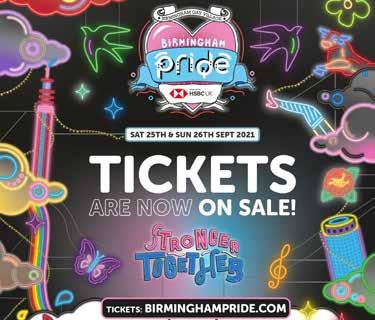
Following the government releasing its roadmap to reopening after lockdown, Birmingham Pride, which is this year supported by HSBC UK, made an announcement about the upcoming event, saying: “We firmly believe that delaying until later in September gives us the most realistic opportunity to finally deliver a safe and enjoyable Pride for us all.”
Tickets for the event are now on sale at www.birminghampride.com. If you’ve already purchased tickets for Birmingham Pride for the previously postponed dates, you don’t need to do anything, your tickets will be transferred to the new dates. If you can no longer attend the new dates, log into your Ticketsellers account and request a refund.
The team behind Birmingham Pride has been working hard to secure as many of the artists from the original 2020 cancelled line-up as possible and will be revealing the full line-up very soon.
Birmingham Pride added: “We’re really looking forward to seeing you all again, welcoming returning and new visitors to the heart of our LGBTQ+ village and enjoying a Birmingham Pride our city and community can be proud of. We are ‘Stronger Together’.”
D For tickets/more info, visit: www.birminghampride.com

and Proud wins Fans for Diversity Award
) Villa and Proud, the official LGBTQ+ and allies supporter network for Aston Villa Football Club, has a mission “to empower, support and build LGBTQ+ inclusion for fans, players and staff at Aston Villa Football Club.” The group’s work within the community has been acknowledged by the Football Supporters Association (FSA), in association with BeGambleAware.org, which awarded them the Fans for Diversity Award
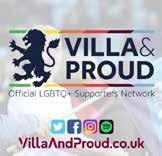
Villa and Proud said they were honoured to receive the award and gave “a huge thank you to all of our members and to our wonderful committee, who have worked tirelessly during an incredibly challenging year.”
D More info on Villa and Proud, visit: www.villaandproud.co.uk
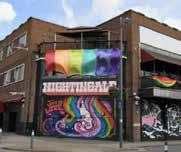
) Nightingale Club – based on Hurst Street – is Birmingham’s oldest and largest LGBTQ+ venue. In preparation for reopening in the summer, the venue is commissioning LGBTQ+ artists who will be paid to refresh their home, “make their mark”, and fill the venue with “new, exciting, vibrant and queer, painted murals”.
Ellis Miles Stewart, who does the graphic design and marketing for Birmingham Pride, Nightingale Club, the Loft and the Village Inn, told Scene: “As we're reopening in
the next few months, and have had a large break since the club was in full use due to several hundred lockdowns, we wanted to freshen up our home. As part of the freshening up period, we wanted to fill as many walls as possible with vibrant and wonderful artwork by our local LGBTQ+ community, for our community.”

He also added: “We have had an influx of interest from artists up and down the UK, which has been amazing. I'm looking forward to seeing all of the murals come together over the next several weeks, and it should hopefully give the Nightingale a burst of new life.”
D For more info on the Nightingale Club: www.nightingaleclub.co.uk f @thenightingaleclub t @Nightingaleclub

) Mondelez International –
which owns Cadbury – is based in Bournville, Birmingham where many of its products, including Crème Eggs, are still made.
Birmingham’s Cadbury history began in 1824 when John Cadbury opened a grocer’s shop on Bull St, where, unsurprisingly, he sold cocoa and drinking chocolate. The Cadbury manufacturing business was then born in 1831 when a factory was opened on Crooked Ln (which later moved to Bridge St in 1847). When that factory became too small for the business, the Cadbury family moved to Bournville, where the factory still remains.
Today, Cadbury and Mondelez International strive for diversity and inclusion. During Pride Month – if you walk from Bournville Station to Cadbury World – you’ll see the rainbow flag flying, and it has an
LGBTQ+ group at its Bournville offices which organises participation in Birmingham Pride
Following an anti-LGBTQ+ petition against the Crème Egg advert, which featured a gooey kiss from a gay couple, the company again defended LGBTQ+ rights, saying it is proud to spread a “message of inclusion”.

In response to Premier Christian News and the petition calling for a ban of the advert, a Cadbury spokesperson said: “Cadbury’s has always been a progressive brand that spreads a message of inclusion, whether it is through its products or brand campaigns.
“We're proud of our Golden Goobilee advert which celebrates the many ways that everyone can enjoy a Crème Egg. To illustrate this and showcase the joy our products bring, a clip of a real-life couple sharing a Creme Egg was included in the advert.”

Over £10,000 raised so far for Birmingham’s HIV/AIDS Memorial
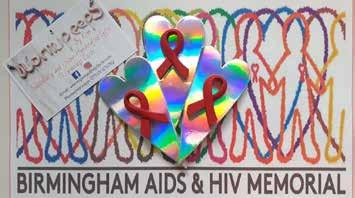
) The fundraising for Birmingham’s proposed permanent HIV/AIDS Memorial in the LGBTQ+ village is well underway with over £10,000 raised through various sources towards the £300,000 target.
One of the earliest fundraising events was the Nightingale Club’s online drag show, which raised more than £4,000 on GoFundMe. If you missed it, the Nightingale’s event is still online and free to watch: www.youtube.com/ watch?v=mAO1C_Z_0A4
D To donate, visit: https:// uk.gofundme.com/f/ birminghamaidsmemorial
The Fox Bar then followed, hosting a back to the ’80s streamed event, –featuring a plethora of top-flight drag performers.
D To donate, visit: https:// uk.virginmoneygiving.com/ birmingham-AIDS-memorial
Other fundraising endeavours have included £100 from a bake sale at City Hospital Breast Unit, added to the Virgin Money Giving page, which at the time of writing sits at £13,732.53 (total plus Gift Aid).
Regress Radio and Pulse 25, in aid of Terrence Higgins Trust. also played a part, asking people to donate as part of an online fundraiser, featuring DJs Ian Mulford and Tony De Vit who played an important role in Birmingham’s clubbing scene in the early to late '90s. Meanwhile, Trans Radio’s DJ Glorious created a 12-hour mix, which was shared for free across social media and has raised £525
Kim Homer, who runs local business WormipeepS, which creates sculptures from polymer clay, has turned her craft to creating pins to raise money for the cause. Kim’s sparkly red HIV/AIDS ribbon pins can be bought from her Facebook page
@WormipeepSbyKimHomer for a minimum of £5 (plus £1 p&p), with 20% from each sale going into the pot.

Additionally, Gary Jones – the Birmingham-based artist who first decided to bring a group together to raise money for an AIDS memorial -–is selling his artwork online to raise money for the Memorial. The paintings are inspired by Gary’s “love of the work of artist & AIDS activist Keith Haring”. The first two pieces both sold for £50 with all proceeds from these sales added to the fund.
Phil Oldershaw, co-founder of Birmingham Pride, said that the campaigning has already sparked interest from potential sponsors who could drastically increase the fundraising pot. He explained: “It is tax-deductible; we are seeing enquiries from many corporates who want to be a part of this project to help make a difference. HIV/AIDS has affected many over the years, and continues to be a virus that doesn’t discriminate.”

Oldershaw also added: “Corporate and social responsibility is key to getting the message home. We are looking at fundraising and sponsorship from all communities. The business and corporate areas can really help us achieve the hundreds of thousands of pounds required to make something memorable and distinguished as a landmark with our city of Birmingham.”
If you want to support the cause with grants, sponsorship or fundraising –either as an individual or as a business – head to www.bahm.co.uk or email hello@bahm.co.uk



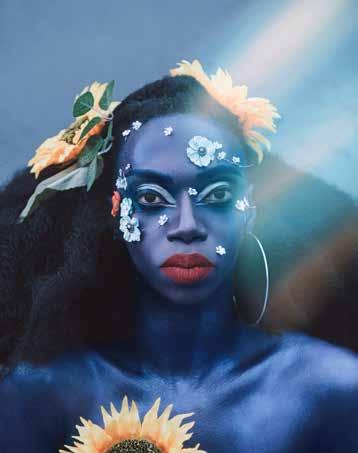
) Black Peppa – originally from the Caribbean -–is a Birmingham-based drag queen who has been working on the local scene since 2019. She is the current reigning queen of EuroDrag England 2020 and the Church of Yshee 2019 (a drag competition hosted by Birmingham’s Yshee Black).
In an announcement from EuroDrag – which hosts EuroDrag TV and drag contests – it was revealed that Black Peppa will be a contestant on its EuroStars contest, which will see “the best of the best compete for the title of EuroStar 2021”.
Black Peppa will be one of several drag performers representing her country in this Europe-wide contest. She will compete alongside Dandy Issues, Fonda Cox and Tequila Thirst, all of whom are representing England. Elsewhere in the UK, Purina Alpha and Dorian T Fisk will be representing Scotland, and Spike will be representing Wales.
Describing her drag aesthetic in an Instagram post, Black Peppa explained: “My style is very hard to put into one sentence but I can best describe it as fetish punk glamour meets Futurism, with a sophisticated twist of haute couture in there.”
Hosting the EuroStars contest will be Sederginne and Janey Jacké – from Drag Race Holland – alongside Linda Gold and Dys Alexia. Black Peppa and all the other drag artists who are competing will be judged by an equally star-studded line-up of judges, including; Drag Race UK’s Cherry Valentine, Drag Race’s The Vixen and Kandy Ho, international performer with a Birmingham residency Amber Cadaverous, Drag Race Holland’s Megan Schoonbrood and Ma’ma Queen, queen of pop parodies Sherry Vine, Drag Race Canada’s Kiara, Me the Drag Queen, Adam All, and many more.
The contest launches Sunday, April 25 and the winner will tour across Europe, as well as winning their own TV show, which will be broadcast globally.
The EuroStars contest will air across all UK local TV stations, including Freeview Channel 7 (Birmingham TV), Sky, Virgin and Latest TV, so you can tune in and root for our Birmingham queen, Black Peppa
D For more info, visit: https://eurodrag.co.uk/the-eurostars-drag-contest